Quick access:

Language-learning trips to Germany
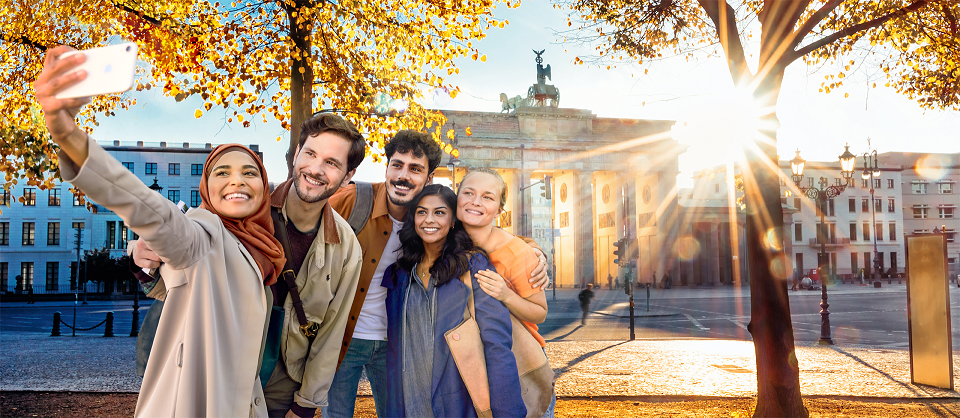
The best place to learn a language is where it is spoken! So why not travel to Germany with the renowned Goethe-Institut? Take this chance to make German a part of your day-to-day routine, whether you are out and about visiting a bakery, a museum or a cinema. “Practice makes perfect” is particularly true when it comes to language learning.
- Learn German and use it the very same day
- Discover Germany’s rich culture and history
- Enjoy new experiences abroad
- Meet people from all around the world
Get to know the language, people and country
Language-learning trips for adults.
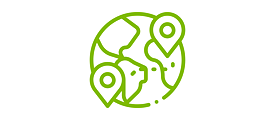
Simply book your flight and away you go! We have the course and accommodation for you. If you have any questions about finding us, getting a visa or obtaining insurance, our staff will be happy to help.

Culture and leisure
By taking part in our extensive cultural and leisure programme, you can put your German skills straight to real-world use while discovering the rich variety of experiences on offer in Germany.
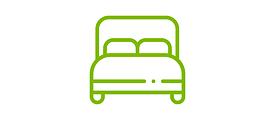
Accommodation
We have the right accommodation for you. Whether you opt to stay in a guesthouse, at partner hotels or with a host family, the Goethe-Institut will ensure you soon feel right at home – there is something for everyone.
Our German courses for your language-learning trip
- Course duration: 2 weeks (10 course days) or 3 weeks (16 course days)
- Timetable: 50 or 75 lessons in total (each lasting 45 minutes)
- Procedure: Monday to Friday, 5 lessons a day on-site at your Goethe-Institut
- Maximum number of participants: 16
- Levels: A1, A2, B1, B2, C1, C2 (in each case, you will be completing a sub-level that forms part of a full level).
- Free placement test before the start of the course
- All teaching materials are included
- Individual learning in the media library
- Comprehensive culture and leisure programme
- Certificate of attendance
- Option of examinations (25% discount)
All intensive courses
Locations for your language-learning trip to Germany

The Goethe-Institut is located in the Mitte district, a central area that is one of the coolest in the former East Berlin. This makes the perfect base for discovering the huge and varied array of different parts of the extraordinary capital city.
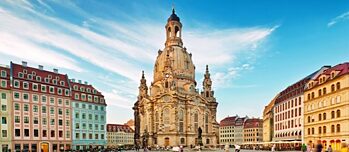
The Goethe-Institut Dresden is located in a young and lively part of town, with the River Elbe and the baroque city centre within walking distance. Dresden has an abundant range of sights to see, including the Semperoper opera house, the Zwinger palace, the Frauenkirche church and a whole host of other worthwhile destinations.
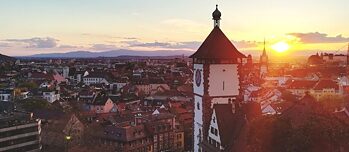
Our institute in Freiburg, Germany’s greenest city, is located inside a park not far from the historic city centre. Although the city is on the smaller side, Freiburg still enjoys a lively atmosphere thanks to the large number of students living in town.
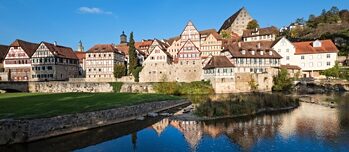
- Schwäbisch Hall
Our institute in Schwäbisch Hall is located right in the centre of the small, picturesque city. This makes a useful staging post for diving back into the city’s history through to the Middle Ages. Schwäbisch Hall has a rich history and a plethora of traditional events to enjoy.
Booking your language-learning trip to Germany
German language summer programs for teens in germany.
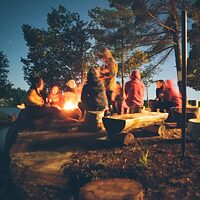
If you’re planning a trip to Germany, it’s always helpful to know a few basic phrases in German to help you navigate your way around the country. This guide provides 50 essential German phrases for tourists, along with their English translations and pronunciations. From ordering food in a restaurant to asking for directions, these phrases will come in handy during your visit to Germany.
Table of Contents
Here are 50 essential german phrases for tourists traveling in germany, with their english translations and german pronunciations:.
Read also: Offensive German Vocabulary: 50 Words You Should Avoid Using
- Hello – Hallo (hah-loh)
- Goodbye – Tschüss (chooss)
- Please – Bitte (bit-teh)
- Thank you – Danke (dahn-keh)
- You’re welcome – Bitte (bit-teh)
- Excuse me – Entschuldigung (ent-shool-dee-goong)
- Do you speak English? – Sprechen Sie Englisch? (shpre-chen zee eng-lish?)
- I don’t understand – Ich verstehe nicht (eekh fer-shtay-eh nikht)
- How much does it cost? – Wie viel kostet es? (vee feel kohs-tet ess?)
- Where is the bathroom? – Wo ist die Toilette? (vo ist dee toh-let-teh?)
- Can you help me? – Können Sie mir helfen? (kern-nen zee meer hell-fen?)
- I would like… – Ich möchte… (eekh merkh-teh…)
- Do you have…? – Haben Sie…? (hah-ben zee…?)
- Yes – Ja (yah)
- No – Nein (nine)
- Excuse me, is this seat taken? – Entschuldigung, ist dieser Platz besetzt? (ent-shool-dee-goong, ist dee-zer platz beh-zetst?)
- What is your name? – Wie heißen Sie? (vee hi-sen zee?)
- Nice to meet you – Freut mich, Sie kennenzulernen (froit mikh, zee ken-nen-tsuh-lern-en)
- Can you recommend a good restaurant? – Können Sie ein gutes Restaurant empfehlen? (kern-nen zee ighn goot-es rest-o-rahnt em-pfeh-len?)
- I’m allergic to… – Ich bin allergisch gegen… (eekh bin ah-ler-gish geh-gen…)
- Is there a pharmacy nearby? – Gibt es eine Apotheke in der Nähe? (gibt ess igh-nuh ah-po-teh-keh in dare neh-eh?)
- Could you call me a taxi, please? – Könnten Sie mir bitte ein Taxi rufen? (kern-nen zee meer bit-teh ighn tahk-see roo-fen?)
- Where can I find a map? – Wo finde ich eine Karte? (vo fin-deh eekh igh-nuh kahr-teh?)
- Can you show me on the map? – Können Sie es mir auf der Karte zeigen? (kern-nen zee ess meer auf dare kahr-teh tsigh-gen?)
- I need a doctor – Ich brauche einen Arzt (eekh brow-khe igh-nen ahrtst)
- I’m lost – Ich habe mich verlaufen (eekh hah-beh meekh fer-lah-fohn)
- Is it safe here? – Ist es hier sicher? (ist ess heer zee-cher?)
- Is there Wi-Fi here? – Gibt es hier Wi-Fi? (gibt ess heer wee-fie?)
- How do I get to…? – Wie komme ich nach…? (vee kohm-meh eekh nahkh…?)
- What time is it? – Wie spät ist es? (vee shpayt ist ess?)
Read also: 45 Ways to Save Money During Your Trip to Europe
- Can you tell me the way to…? – Können Sie mir den Weg nach… erklären? (kern-nen zee meer den vayg nahkh…er-kla-ren?)
- I would like to book a room – Ich möchte ein Zimmer reservieren (eekh merkh-teh ighn tsim-mer reh-zer-vee-ren)
- Is breakfast included? – Ist Frühstück inklusive? (ist frooh-shtook in-kloo-see-veh?)
- What time is breakfast served? – Wann gibt es Frühstück? (vahn gibt ess frooh-shtook?)
- Can I pay with a credit card? – Kann ich mit Kreditkarte zahlen? (kahn eekh mit kreh-dit-kahr-teh tsah-len?)
- What is the exchange rate? – Wie ist der Wechselkurs? (vee ist dare vek-sel-kurs?)
- Can I get a discount? – Kann ich einen Rabatt bekommen? (kahn eekh igh-nen rah-baht geh-kom-men?)
- I need a wake-up call – Ich brauche einen Weckruf (eekh brow-khe igh-nen vehk-roof)
- Is there a safe in the room? – Gibt es einen Safe im Zimmer? (gibt ess igh-nen zahf-eh im tsim-mer?)
- Can I have some more…? – Kann ich noch etwas…haben? (kahn eekh nokh ess-tas…hah-ben?)
- How far is it to…? – Wie weit ist es bis…? (vee vight ist ess bis…?)
- What is the best way to get to…? – Wie komme ich am besten nach…? (vee kohm-meh eekh am bes-ten nahkh…?)
- I’m sorry – Es tut mir leid (ess toot meer liyt)
- What is the weather like today? – Wie ist das Wetter heute? (vee ist dahs vet-ter hoy-teh?)
- Do you have a menu in English? – Haben Sie eine Speisekarte auf Englisch? (hah-ben zee igh-nuh shpy-suh-kahr-teh owf eng-lish?)
- Could you please bring me the bill? – Könnten Sie mir bitte die Rechnung bringen? (kern-nen zee meer bit-teh dee rek-noong bren-gen?)
- Is there a tourist information center nearby? – Gibt es ein Touristeninformationszentrum in der Nähe? (gibt ess ighn too-ris-ten-in-fohr-ma-tsee-ons-tsent-room in dare neh-eh?)
- How do I get to the train/bus station? – Wie komme ich zum Zug/Busbahnhof? (vee kohm-meh eekh tsuhm tsug/boos-bahn-hof?)
- Can I have a glass of water, please? – Kann ich bitte ein Glas Wasser haben? (kahn eekh bit-teh ighn glahs vah-ser hah-ben?)
- Have a nice day – Einen schönen Tag noch (igh-nen shern-en tahg nokh)
With this guide, you now have a handy resource to help you communicate with locals during your trip to Germany. Don’t be afraid to practice these German Phrases for Tourists and immerse yourself in the local culture. Whether you’re a first-time visitor or a seasoned traveler, these essential German phrases will help you make the most of your trip
More articles
Navigating the german language: a comprehensive starter vocabulary, 150+ common german phrases to sound like a native speaker, top german language books for self-learners: a comprehensive review, leave a reply cancel reply.
Save my name, email, and website in this browser for the next time I comment.
Difference between ein, eine, einen, and einem in the German Language
Some cheap and expensive things in germany, german essays on my family: meine familie, german universities where we can apply, without uni-assist, latest article, 56 tuition free master’s programs in computer science in germany – explore your options today, your gateway to germany: 20 universities where you can apply without uni-assist, expanding your software company in germany: a step-by-step guide, faqs: money transfer, jobs, and travel from india to germany.

Plan For Germany
© Plan for Germany. All rights reserved.
Sister Sites
Popular category.
- German Language 39
- Lifestyle 35
- Trend & Living 30
- Level A1 23
Editor Picks
You are using an outdated browser. Please upgrade your browser or activate Google Chrome Frame to improve your experience.
136 Useful German Travel Phrases, Expressions and Vocabulary Words
Planning your big trip to Germany is so exciting—but you’re not done until you’ve brushed up on common German phrases for travel.
In this post, you’ll find a handy phrasebook of German travel phrases and vocabulary , conveniently organized by group.
Print it out or keep it on your phone for smooth travels and the trip of a lifetime.
German Greetings, Introductions and Goodbyes
German expressions for shopping, german travel phrases for the restaurant, german words and phrases for directions, german travel phrases for public transportation, german travel phrases for the hotel, german phrases for getting around the city, german words and expressions for emergencies, german expressions for language help, german guides for traveling, german apps for travelers, why you should learn german travel phrases, and one more thing....
Download: This blog post is available as a convenient and portable PDF that you can take anywhere. Click here to get a copy. (Download)
Please note that most of these German sentences are in the formal Sie conjugation. For your travel purposes, this form should be just fine, although native speakers may opt to use different pronoun forms with you depending on the context.

A trusty guide fits in your backpack or purse, and it serves as a way to look up unfamiliar words and phrases or brush up on vocab while traveling from one place to another. Here are some recommendations:
“Rick Steves’ German Phrase Book and Dictionary”

You can’t go wrong with Rick Steves, since the man has traveled all over Europe (numerous times), hosted his own travel show and written dozens of bestselling guides for European travel.
From meeting new people to ordering a bratwurst, this guide outlines the most common everyday phrases to further improve your travel lingo. It also comes with phonetic spellings , currency information, rail transportation guides and a cheat sheet that you can tear out and slide in your pocket.
“German Survival Guide”

This guide can give you the confidence to speak with people while traveling through Germany and Austria. It touches on cultural points and shows you how to interact with German speakers a various spots such as the Autobahn, grocery stores, ice cream parlors and more.
It includes vocabulary and basic German instruction , with travel and study tips scattered throughout the entire guide. It’s a rather helpful book for your travels if staying in Germany or Austria for quite some time.
Lonely Planet German Phrasebook and Dictionary
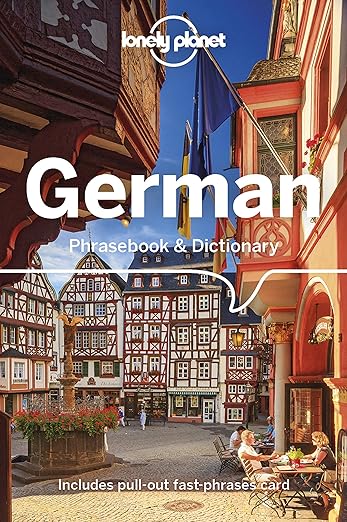
This German phrasebook has a huge section for decoding restaurant menus and ordering food properly, plus a 3,500-word two-way German-English dictionary.
The cultural manners section can prevent you from embarrassing yourself or making others feel uncomfortable and help you feel at ease while traveling.
Lonely Planet at large has tons of German phrasebook and travel guide options available on their site. Read these ahead of time to know what to expect wherever you go, then bring them on your trip to whip out at a moment’s notice.
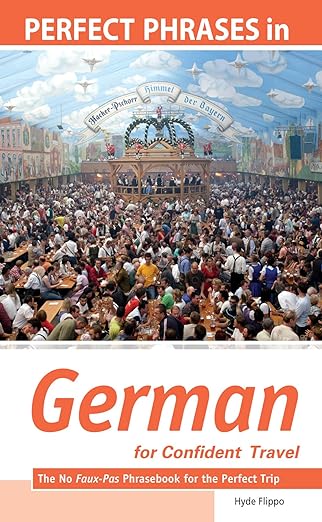
“Perfect Phrases in German for Confident Travel”
Context and manners are extremely important when going to Germany, just like they are in every country. If you insult a person’s language, why would they talk to you in return?
The “Perfect Phrases” book details the proper words and phrases to use while traveling, while also discussing faux pas and how they can hurt your conversation.
“Point it: Traveller’s Language Kit”
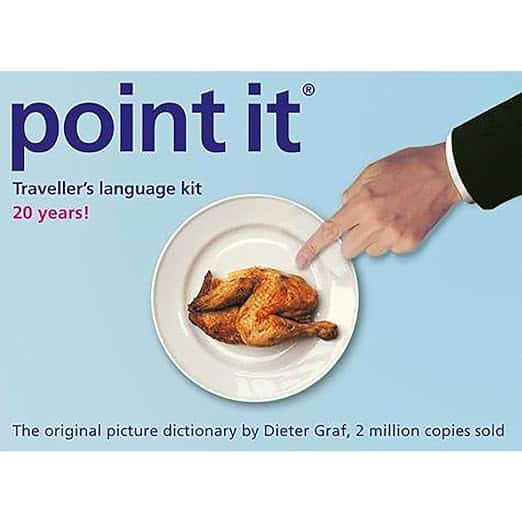
This guide may not help you much with your pronunciation, but it’s an essential tool to bring with you while traveling in German-speaking countries.
The “Point It” book has 1,300 images and words, so you can point at the images when your speaking abilities fail. For example, point to the picture of a chicken when ordering at a restaurant.
A good app can serve as a viable replacement for a travel and language guide that doesn’t add any weight to your pack. Plus, the apps generally offer audio to hear how to pronounce certain words and phrases. Here are some great options:
Learn German Phrases & Words: Phrases for Travel in Germany
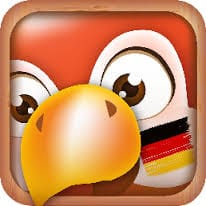
The Learn German Phrases & Words app is designed to boost your speaking capabilities while traveling. It can be used without an internet connection, so you can always depend on it.
The visual guide has carefully categorized sections like greetings, eating, romance and health. The app has over 800 common German phrases, and the German-speaking parrot pronounces everything for you.
Learn German – Phrasebook
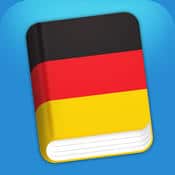
This phrasebook is free, but you can upgrade to receive all of the phrases and words for your travels. The app works as a quick reference perfect for tourists visiting Germany.
The main page shows categories like numbers, general conversation and transportation. Once you select a category and phrase, it gives you the option to hear a spoken version and slow down the audio for better understanding.
Wie Geht ‘s German

The Wie Geht ‘s app provides a few lessons with audio tracks that are useful while moving around the world. It has a travel section filled with options like directions, meeting people, weather, shopping, money and more.
Membership is required to get most of the content. The app is formatted like a class, but feel free to skip around and use the examples when you come across a moment when they are needed.
Germany Travel Guide Offline

The German Travel Guide app is not going to help you much with your German learning, but it may prevent you from getting lost.
The app works online and offline, with detailed maps for navigating cities like Berlin, Munich and Hamburg. Check out weather, time and fun suggestions while moving around the cities.
With this app, you can immerse yourself in the German language and culture before stepping foot in Germany.
- Even if you can’t have a fluent conversation, native German speakers always appreciate when foreigners put the effort into learning a bit of their language . It shows respect and demonstrates that you truly want to reach out and connect with people while abroad.
- You won’t be totally reliant on your German phrasebook. Yes, your German phrasebook has glossy pages and you love getting the chance to use it—but you want to be able to respond quickly when people speak to you, at a moment’s notice.
- If you can express yourself with some basic German phrases , you are less likely to be taken advantage of by taxi drivers, souvenir shops and waiters!
- The perception that all German speakers speak English is simply not true. Even in big German cities you’ll find loads of people that know very little English. You don’t want to have to track down other English speakers every time you have a question or want to make a friend.
Try practicing some of these phrases out loud to get your pronunciation right before leaving on your travels.
Before we part ways, there’s one final German travel phrase you need to know: Gute Reise! (Have a good trip!)
Want to know the key to learning German effectively?
It's using the right content and tools, like FluentU has to offer ! Browse hundreds of videos, take endless quizzes and master the German language faster than you've ever imagine!

Watching a fun video, but having trouble understanding it? FluentU brings native videos within reach with interactive subtitles.

You can tap on any word to look it up instantly. Every definition has examples that have been written to help you understand how the word is used. If you see an interesting word you don't know, you can add it to a vocabulary list.

And FluentU isn't just for watching videos. It's a complete platform for learning. It's designed to effectively teach you all the vocabulary from any video. Swipe left or right to see more examples of the word you're on.

The best part is that FluentU keeps track of the vocabulary that you're learning, and gives you extra practice with difficult words. It'll even remind you when it’s time to review what you’ve learned.
Start using the FluentU website on your computer or tablet or, better yet, download the FluentU app from the iTunes or Google Play store. Click here to take advantage of our current sale! (Expires at the end of this month.)
If you liked this post, something tells me that you'll love FluentU, the best way to learn German with real-world videos.
Experience German immersion online!
Enter your e-mail address to get your free PDF!
We hate SPAM and promise to keep your email address safe


47 Survival German Travel Phrases [You Need To Know]
Are you dreaming about your next trip to Germany? Maybe this is your first visit and you’re keen to blend in. Or perhaps you’ve visited German speaking countries a few times but always resorted to using English.
In this post you will discover 47 tried and tested German travel phrases that have worked well for me on my many trips to Germany. You’ll also hear audio of each of the phrases.
After reading this post you will:
- Know how to say 47 essential German travel phrases
- Hear how each of the phrases sound
- Be able to mix and match which ever phrases you want to try out on German speakers
Why Learn German Travel Phrases?
Before we get started I want to give you a quick pep talk.
If you’re travelling to a German speaking country any time soon, you may head there with the idea that ‘everyone speaks English’.
If you’re heading for a city break, you’ll probably meet people in the tourist industry that do speak a bit of English. But once you step off the tourist path, you’ll realise that many people don’t speak much English at all.
Even if you’re opting for a city break, it shows a great deal of respect to the local people to at least learn how to say ‘hello’, ‘please’ and ‘thank you’ in German. If you expand your knowledge and learn how to say more German tourist phrases such as ‘I would like’ or ‘can I check in?’ the person you’re speaking to will be really impressed.
In my many trips to Germany, I’ve learned to never be afraid of speaking German with the locals. Even during my earlier visits when I tried and butchered that poor language, the German speakers I spoke to were so happy that I was even trying.
Don’t let the fear of making mistakes stop you from trying. Even if you mostly speak English, then throw in one of these German travel phrases somewhere, you’ll make progress.

Common German Words
Let’s make a start with the most common German travel phrases and words you’ll encounter as a tourist. These are simple pleasantries that will be appreciated by the locals. So make sure you learn some of these even if you don’t learn anything else.
Asking For Help / Not Understanding
Whenever you’re in a country where you don’t speak a lot of the language, it’s always helpful to learn a few ’emergency phrases’.
For example, one time when I was in Germany, but didn’t know much German at that point, another guest in a hotel started chatting to me in German. My go-to phrase to politely end a conversation was sorry, mein Deutsch ist nicht so gut (sorry, my German isn’t very good).
And just so you know, in a real emergency, the emergency number in Germany is 112.
Whether you’re stopping for a quick coffee or a full on meal, there are loads of chances to practice some German travel phrases with the waiting staff when you order food and drink in German . At the very least, memorise ich hätte gern … (I would like…) and then add your drink or meal of choice. It’s really polite and shows a lot of respect to the person serving you to order in this way.
Some key words to listen out for are trinken (drink) and essen (eat). These are great words to train yourself to listen for so you can get a feel for what is being asked.

In a hotel you’re most likely to meet English speakers, but if you want to practice some German, the receptionists are usually very happy to speak to you. Why not try some of these essential phrases out?
Getting Around & Directions
Thanks to Google Maps, you probably won’t need to ask a local for directions, but it’s always helpful to know how to ask the way to the toilet / bathroom if you’re in a café.
One thing to keep in mind when shopping in Germany, is that you’ll encounter shops, cafés and restaurants that only accept cash. So it’s a good idea to check before you order.
German has 3+ words for receipt, and in my experience they seem to be interchangeable. One way of saying receipt isn’t limited to the area you’re in, so you might hear Quittung, Bon and Beleg being used all in the same city. Keep your ears alert for these tricky words!
So there you go, 47 essential German travel phrases, all tried and tested and ready for you to use on your next trip.
Leave a Reply Cancel reply
Your email address will not be published. Required fields are marked *
Save my name, email, and website in this browser for the next time I comment.

The Science of Language Learning

- GET THE APP

German for Travelers: 101 Useful Phrases Every Backpacker Should Know
- 13 min read
- July 7, 2022
- [addtoany] test

Renán L. Cuervo
Content Writer
Passport? Check. Bags? Packed. Tickets? Booked. How’s your Deutsch? Get ready for your upcoming trip to Germany with this handy list of German phrases for travelers to cover every situation!
Why you should learn these German phrases for travelers
Are you getting ready to visit Germany? Or is it Austria? Switzerland? Whatever the country, these German travel phrases will make your trip that much more enjoyable. So, print them out or keep them on your phone!
Even if you’re not looking to become fluent in German, these common German phrases for travel are a great way to connect with native speakers and immerse yourself in the country during your journey. But, in case you need more convincing, here are a few other reasons why you should pick up some basic German for travelers :
Travel better : First, it’ll be easier to move around, ask for directions, and communicate with locals. Besides, you’ll score points with native speakers!
More independence : Second, you’ll rely less on expensive phrase books, awkward translations from your phone, and complicated hand gesturing. Additionally, we promise you’ll feel great after successfully ordering a beer in German all on your own.
Not everyone speaks English : Third, the idea that every single European speaks English is not true. So, avoid the hassle of tracking down an English speaker every time you need help.
Easier to meet new people : Fourth, meeting people and making friends will be easier. Who knows, maybe you’ll meet your new best friend or someone special thanks to a smooth Hallo, wie geht es dir?
Make learning German easier : Lastly, if you’re interested in fully learning this European language, good news! Learning phrases in your target language is one of the best ways to learn German .
German phrases for travelers: a note on pronunciation
Before we get to our list of German phrases for travelers , here’s a quick, helpful note on German pronunciation.
Generally, German is a highly phonetic language: its words tend to sound exactly like they’re written. It’s also a close linguistic relative to English and uses the Latin alphabet, so its pronunciation is not that difficult to grasp. That being said, there are a few tricky letters and sounds to consider. Here’s a quick rundown:
To help you out even more, we’re adding the International Phonetic Alphabet (IPA) of each phrase so you know exactly how to pronounce it.
Remember: the Fluent Forever app is chock-full of even more useful German travel phrases you can learn.
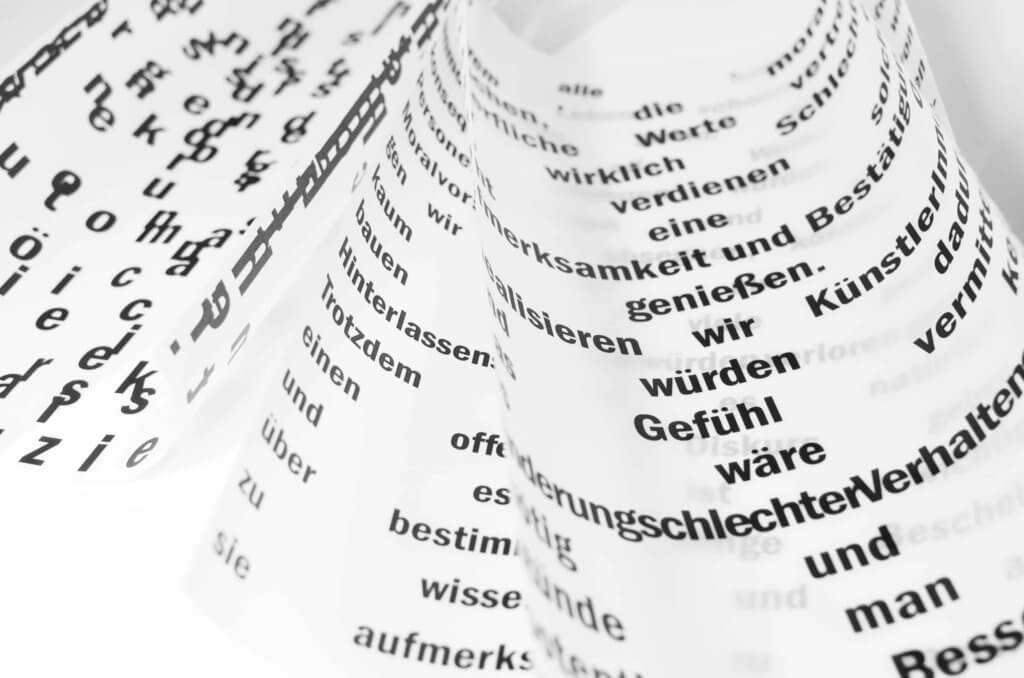
Keep these phrases handy! Photo by Skylar Kang
The top 101 German phrases for travelers
Greetings, introductions, and farewells.
From “hello” to “goodbye,” these first group of German phrases for travelers will help you pick the right salutation for the right context.
Basic questions and answers
These aren’t life’s most pressing questions, but they’re certainly some of its most common ones. This next list has some great questions you’ll need, along with their answers.
You’ll need to eat during your trip, right? Well, these phrases will help you navigate your first time ordering a Bratwurst.
At the hotel
Be it at a hostel or a five-star hotel, the following phrases will come in handy when you’re looking for a place to spend the night.
Locations & asking for directions
You’ll also need to know how to get to places. So here’s a list of phrases you can use to find your way through Berlin’s lively downtown.
Most German-speaking countries have efficient public transport. Make sure you keep these next phrases handy for when you need to use the metro.
Your friends and family will probably expect souvenirs. Don’t let them down and get them something nice at the gift shop! Here’s how:
Emergency phrases
Emergency? Fret not, these last group of phrases are sure to help you out in your moments of need!
Learn German phrases for travelers with these online resources
If you’re looking to learn even more German, there are different resources you can tap into online. As we’ve already mentioned, even if you’re not looking to become fluent, locals will appreciate the effort you make to speak their language.
First, you can learn with a language exchange partner. It’s a fun way to practice any language and meet someone at the same time. Additionally, if they’re from the place you plan to visit, they can give you useful information and travel tips. My Language Exchange is a great place to start your search.
Second, YouTube is a fantastic platform for online language tutors. There are a lot of people who upload free courses and provide tips in simple and straightforward videos. Here’s a list of some well-known German language YouTubers:
- German with Anja
- Fröhlich Deutsch
- EasyDeutsch
- Get Germanized
Third, you can take a free German course before you step on the plane. Here’s a neatly compiled list of free online courses you can check out.
Lastly, what better way to learn German online than with Fluent Forever? You can download our app and learn through our unique, science-backed method that’ll get you speaking in no time. Plus, you can sign up for our Live Coaching program to get 1-on-1 sessions from a native speaker who’s certified in our language learning system.
Bis später!
- German sounds
- language learning
You might also like
- App Company
New Features! Fluency Levels, Task Duration, & Optimized Home + Review Screens
- Company Linguistics
This Is How You Learn a New Language and Never Forget It
- Linguistics
How Long Does Making Flashcards Take?
Dealing with homophones and non phonetic languages, the assimil language method: review and some thoughts, think in any new language.

- ARRANGE A CALL BACK

YES Germany
German Education Consultant in India
A Beginner’s Guide to Learning the German Language

Learning German language for beginners
Learning German as a beginner is an exciting journey into a vibrant language. German is spoken by over 90 million people worldwide. Learning a new language can be exciting and challenging, and German is no exception. Whether you’re planning a trip to Germany, aiming for career opportunities, or simply want to broaden your horizons, embarking on the path of learning the German language is a rewarding experience. In this blog, we will guide you through the essential steps and tips for beginners to make your German language journey a successful one. Immerse yourself in German culture through music, films, and literature to enhance your learning experience. With dedication and consistent effort, you’ll embark on a rewarding adventure to master the German language.
Why learn the German language
- Learning German can enhance your career opportunities.
- Speaking German can enhance your travel experiences.
- Knowing German can open doors to additional opportunities.
- Learning a new language challenges your brain, boosts cognitive abilities and increases adaptability.
- Knowing German can help you connect with a vast community of German speakers and language learners worldwide.
- Learning German gives you access to a wide range of German-language books, movies, and resources.
How to start learning the German language for beginners
Define your goals.
Begin your German language learning journey by defining your goals. Understanding why you want to learn German will provide motivation and direction. Whether it’s for travel, work, or personal enrichment, your goals will shape your learning path.
Immerse Yourself in German
Immerse yourself in the German language and culture as much as possible. Listen to German music, watch movies with German subtitles, and read simple German books or news articles. Exposure to the language’s rhythm and pronunciation is invaluable.
Practice Speaking
Don’t shy away from speaking German, even as a beginner. Practice with native speakers or language exchange partners. Conversational practice will boost your confidence and fluency. Speaking the language from the early stages of learning is a powerful way to accelerate your progress. Native speakers can provide valuable insights into pronunciation, colloquial expressions, and cultural nuances. Likewise, engaging with language exchange partners not only enhances your conversational skills but also creates a supportive environment for mutual learning. Remember, making mistakes is a natural part of the language learning process, so embrace the opportunity to speak, learn, and grow in your German proficiency.
Join Language Learning Communities
Online and offline language learning communities are excellent for beginners. Participate in forums, social media groups, or local language exchange events to connect with fellow German learners. Sharing experiences and tips can be motivating. Participating in language learning communities can be motivating and educational. Websites like Reddit and language-specific forums often have dedicated German language learners who share resources, answer questions, and offer support. Engaging with these communities can provide a sense of camaraderie and encouragement.
Master the German Alphabet
Before diving into vocabulary and grammar, familiarize yourself with the German alphabet. While it’s similar to the English alphabet, there are some key differences, such as the presence of umlauts (ä, ö, ü) and the unique sharp ‘ch’ sound.
Learn Common Phrases
Start your practical language journey by learning common German phrases. Greetings, polite expressions, and basic conversation starters are essential. Memorize phrases like “Hallo” (hello), “Bitte” (please), and “Danke” (thank you) to begin forming a foundation.
Enroll in a Language Course
Consider enrolling in a German language course , either online or in-person. Courses provide structured lessons, access to instructors, and opportunities to practice with fellow learners. Look for courses that match your skill level, whether you’re a complete beginner or have some prior knowledge of the language.
Practice Listening
Listening to native speakers and trying to mimic their pronunciation is crucial for developing your speaking skills. Watch German-language movies, TV shows, or listen to podcasts or music to get accustomed to the sound of the language. Join language exchange groups or find a language partner to practice speaking.
Seek Professional Guidance
If you’re serious about mastering German, consider working with a language tutor or taking formal courses at a language school. Professional guidance can provide personalized instruction and help you overcome specific challenges.
German language as a beginner offers a world of opportunities and enriching experiences. With well-defined goals, immersion in the language and culture, and active participation in language-learning communities, you can make significant progress. Mastering the German alphabet, learning common phrases, and practicing speaking are crucial steps to build a strong foundation. Moreover, the benefits of learning German, including career opportunities, enriched travel experiences, and cognitive growth, make this endeavor all the more worthwhile. So, seize the opportunity, dive into the vibrant world of German, and embark on a fulfilling adventure in language.
YES Germany Education Pvt. Ltd.
As the days pass by Germany is increasingly becoming the go-to dream destination for students aspiring to pursue their higher education abroad.

Lorem ipsum dolor sit amet, consectetur adipiscing elit. Proin porttitor finibus dictum. Etiam risus risus, elementum eget turpis ac.
Chat with us
ENQUIRE NOW

60 Essential German Travel Phrases
Are you planning a trip to a German-speaking country? There are so many reasons for learning basic German travel phrases before you jump on that plane. And we invite you to try out Drops to learn more than 2500 useful German words and phrases !
The locals will appreciate any effort you make to speak the local language. You’ll make traveling far easier on yourself as you’ll be able to communicate more clearly. You can get to know people who don’t speak English and experience a different culture.
Despite the common belief, not everyone speaks English. Even if you are planning a city break, it will be appreciated if you make an effort to speak a bit of German. It’s a sign of respect for the people in the country you are visiting.
If you want to venture away from the cities, you’ll likely encounter a lot of people who hardly speak any English at all. So it’s worth being prepared!
So let’s dive right in and take a look at my favorite tried and tested German travel phrases.

German Greetings & German Basics
Hallo - “hello”
Tschüss - “bye”
Auf wiedersehen - “goodbye”
Tschau - “ciao”
Guten Morgen - "good morning”
Guten Tag - "good day”
Guten Abend - "good evening”
Gute Nacht - "good night”
Danke / Vielen Dank / Dankeschön - " thanks” and “many thanks”
There are a few ways to say thank you in German. Just use danke for now but expect to hear the other versions as well.
Bitte - "please”
Sorry - "sorry”
Entschuldigen Sie bitte - "excuse me” or “sorry”
Ja - "yes”
Nein - "no”
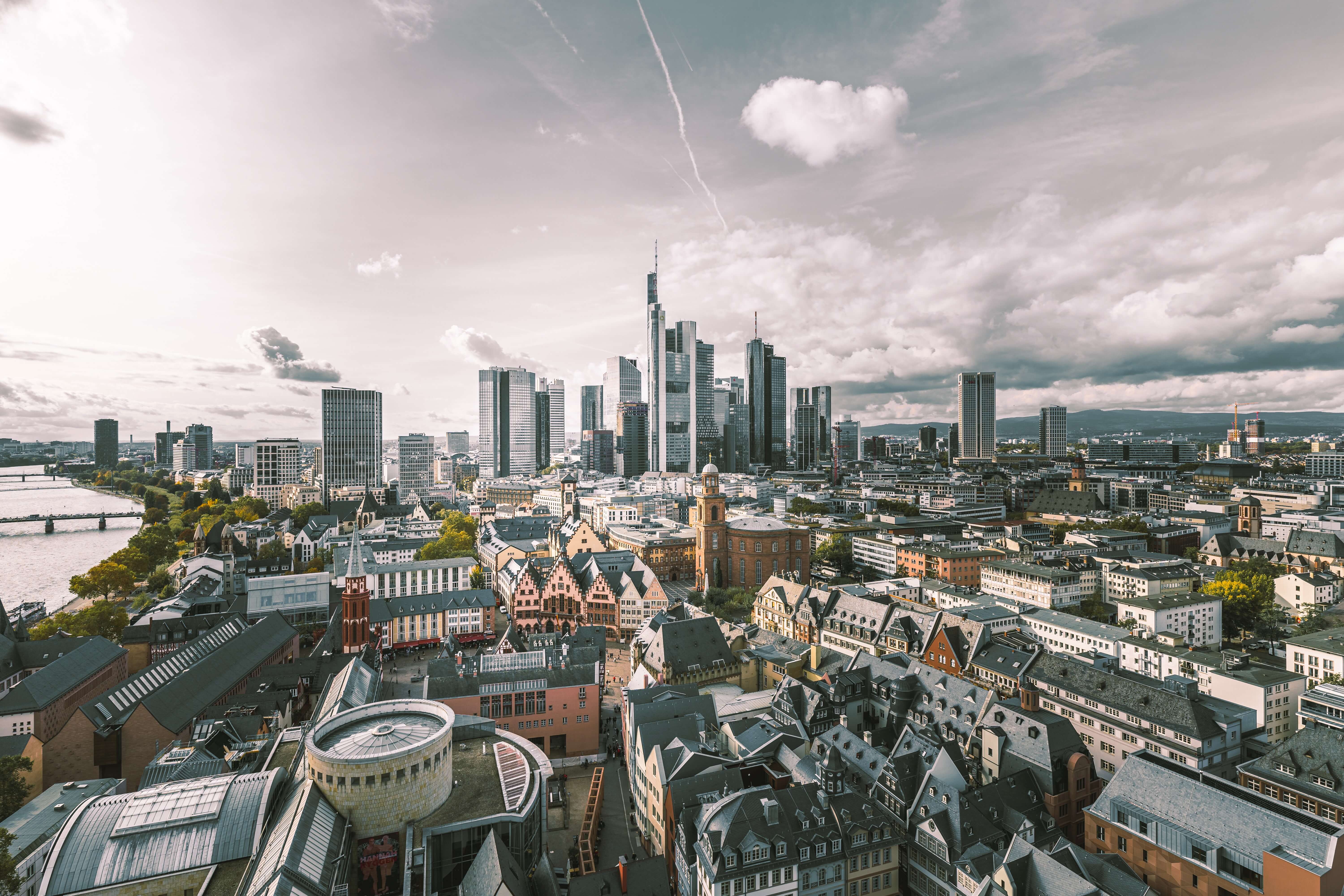
German Phrases You Might Hear
You might also hear the following German expressions:
Gerne - "gladly” or “my pleasure”
Bitte schön - "there you go” or “you’re welcome”
Both of these are often used in restaurants and cafes, when the waiting staff bring your food or drinks over, and also in shops. More on that later!
German Phrases in the Hotel
One of the first things you’ll do when you arrive in a German-speaking country is check into your hotel. There are a few standard phrases which you can use, and the checking in procedure usually follows the same pattern.
The receptionist will ask if you have a reservation (listen for ‘Reservierung’ ), they’ll ask your name (listen for ‘Name’ [Nahmeh] ) and they’ll give you your key (listen for ‘Schüssel’ ).
Checking in to the Hotel in German
Kann ich bitte einchecken? - “Can I check in please?”
Ich habe eine Reservierung - “I have a reservation”
Mein Name ist (...) - “My name is (...)”
Ich bleibe bis Montag hier / bis zum vierundzwanzigsten (24th) Juni hier - “I’m staying here until Monday / until the 24th June”
Wann / wo gibt es Frühstück? - ”When is breakfast?”
Gibt es hier WLAN [vee-lan]? - “ Is there wifi here?”
Wie lautet das WLAN-Passwort? - “What is the wifi password?”
Um wie viel Uhr muss man auschecken? - “By what time must I check out?”
Kann ich bitte auschecken? - “ Can I check out, please?”
What You May Hear in German at the Hotel
Haben Sie eine Reservierung? - “Do you have a reservation?”
Wie ist Ihre Name? - “What is your name?”
Bleiben Sie hier für drei (3) Nächte / eine (1) Woche / zwei (2) Wochen? - “Are you staying here for 3 nights / 1 week / 2 weeks?”
Frühstück ist bis sieben (7) Uhr bis zehn (10) Uhr - “Breakfast is from 7am until 10am”
Ihre Zimmernummer ist… - “Your room number is…”
Shopping in German
If you’re out exploring the city, you’ll probably want to do a bit of shopping for souvenirs. The first phrase (ich schaue mich nur um) in this section was pretty essential for me in the early days when I was too nervous to speak much German. If a shop assistant comes up to help and you’re just having a look around or you’re too nervous to speak, this phrase can come in handy.
What You Can Say When Shopping in German
Ich schaue mich nur um - “I’m just looking around”
Ich suche nach… - “I’m looking for…”
Wie viel kostet das? - “How much does that cost?”
Kann ich mit Bargeld / Kreditkarte bezahlen? - “Can I pay with cash / credit card?”
Könnte ich eine Tüte haben? - “Could I have a bag?”
What You May Hear While Shopping in German
Kann ich Ihnen helfen? - “Can I help you?”
Möchten Sie es probieren? - “Would you like to try it?”
Eating Out in German
When it comes to eating out, this is a really great way to practice a bit of basic German. You only need a few phrases to get by. Your power phrase in this section is ich hätte gern… which you can use for any food or drink order. It’s very polite and the serving staff will appreciate it.
Like when checking into the hotel, there is usually a set pattern to look out for when in a cafe or restaurant:
The waiter will ask for your drinks order (listen for trinken ), they will then ask for your food order (listen for essen ) and later they will ask if you’d like a dessert (listen for Nachtisch ).
What You Can Say in German When Dining Out
Haben Sie ein Tisch für ein (1) / zwei (2) / drei (3) Person(en)? - “Do you have a table for 1 / 2 / 3 person / people?”
Ich hätte gern (…) bitte - “I would like (...) please”
- einen schwarzen Tee (mit Milch) - “a black tea (with milk)”
- einen Kaffee - “a coffee”
- ein Mineralwasser - “a mineral water”
- ein Glas Rotwein - “a glass of red wine”
- ein Glas Weißwein - “a glass of white wine”
- ein Bier - “a beer”
Könnte ich ein stück Kuchen haben? - “Could I have a piece of cake?”
Was empfehlen Sie? - “What do you recommend?”
Kann ich bitte bezahlen? - “Can I pay please?”
What You Might Hear in German at a Restaurant
Was möchten Sie? - “What would you like?”
Ich empfehle (...) - “I recommend (...)”
Was möchten Sie trinken? - “What would you like to drink?”
Was möchten Sie essen? - “What would you like to eat?”
Möchten Sie die Nachtischkarte? - “Would you like the dessert menu?”

Sightseeing in German
When you’re out sightseeing, you’ll probably be able to find an English language tour guide. But there are a lot of situations where you might be on your own and need to ask where something is. The simple phrase wo ist… is very useful and easy to remember.
Entschuldigen Sie bitte - “excuse me please”
Wo ist (…)? - “Where is (...)?”
- die Touristeninformation - “the tourist information”
- das Stadtzentrum - “the city centre”
- das Museum - “the museum”
- der Dom - “the cathedral”
- das Rathaus - “the town hall”
- der Bahnhof - “the train station”
When You Struggle to Understand German
If all else fails, here are some phrases to memorize to help you if you have trouble understanding German. Trust me, I used these a lot when I first started visiting Germany. If you’re a bit nervous about your German, committing a few of these phrases to memory can help you get out of tricky situations.
Ich verstehe nicht - “I don’t understand”
Ich spreche kein Deutsch - “I don’t speak German”
Mein Deutsch ist nicht so gut - “my German is not so good”
Sprechen Sie Englisch? - “Do you speak English?”
Langsamer bitte - “slower please”
Können Sie das bitte wiederholen? - “Can you repeat that, please?”
Was bedeutet (…)? - “What does (...) mean?”
Bitte haben Sie Geduld mit mir - “please be patient with me”
So now you know all my essential German travel phrases! These helped me out a lot, and I hope you find them useful on your travels, too!
Ready to learn more? Try Drops!
About the Author: Emma Jackman is the founder of Emma Loves German an all-round resource for German learners. You’ll find articles on speaking, reading, writing, and listening in German as well as grammar tips, frequently used phrases, and other language learning tips.
Download Drops
Sound fun? Easy? Effective? It is. Get Drops for free!
- Drops iOS | Android
- Scripts iOS | Android
- Droplets iOS | Android
- Visual Dictionary
- Available Languages
Work with Us
- Partnerships

Guide to German Travel Phrases for Tourists and Travelers

When you’re traveling outside of your home country, there’s a very good chance that you won’t speak the language of that country. For that reason, it can be really helpful to learn some basic German travel phrases before going to Germany, Austria, or even parts of Switzerland, Belgium, and Luxemburg.
In this article, we’ll provide you with German phrases for tourists that will help you survive basic daily situations.
For instance, when traveling to the center of Europe, you’ll probably have to take a train at some point. (And if you don’t have to take one, we suggest you take one anyway. This experience is part of traveling to Germany.)
Once you’ve bought your ticket at Deutsche Bahn (the German railway company) and you’re ready to discover a new city, the conductor may want to see your ticket or ask some questions. If you didn’t know, even though this is an international company, their staff isn’t one-hundred percent trained to speak English. Trust us, you don’t want to come into this situation unprepared. You’ll need to know phrases for travelers in German.
But no worries. To prevent you from this embarrassing situation, we have free courses for beginner , intermediate , and advanced students. You can even find free bonus material on our website.
Without a lot of hustle and bustle, let’s just get straight to it. Here are the most useful German phrases for travelers.
Table of Contents
- Why Should You Learn German?
- German Pronunciation Specialities
- Basic Questions and Their Perfect Answers
- Restaurants and Ordering Food
- At the Hotel
- Locations and Transportation
- Working Through Communication Barriers
- How GermanPod101 Can Help You Master Urgent Travel Situations

1. Why Should You Learn German?

We know that learning another language can be frustrating and hard, and this may be more true of German than some other languages. But here are some facts that should convince you to learn German:
- Studying in Germany is free – While you have to pay for a college education in most countries, studying in Germany is free of charge.
- Germany is Export King – Germany is the country with the biggest export market in Europe , and the third biggest worldwide.
- Easy for native English speakers – English and German belong to the same language family , which makes it easy to learn (and vice versa).
- Startup hotspot – The startup scene is growing rapidly in the cities of Berlin, Munich, Cologne, and Hamburg.
Knowing even just the basic German travel phrases for beginners can greatly help you make the most of your time in Germany.
2. German Pronunciation Specialities

Before we move on to learning German phrases for travelers, you should have a little information on German pronunciation specialties.
As already mentioned, German is really close to the English language, which makes it easy for good English speakers to adapt to German. But there are some combinations that require special effort in terms of pronunciation. On the left, you see the letter combination; on the right, an English equivalent to that sound.
3. Greetings

Now, onto the most basic German words and phrases for travellers: Greetings. These are the most common German travel phrases, and always important to have at the ready.
- Hallo! Hello!
- Guten Morgen! Good morning!
- Guten Tag! Good day!
- Guten Abend. Good evening!
- Bitte. Please.
- Danke. Thanks. / Thank you.
- Tschüss. Bye.
- Auf Wiedersehen. Goodbye.
- Ich heiße … My name is …
- Ich bin in Deutschland für … Wochen. I am in Germany for … weeks.
- Ich komme aus … I am from …
- Wie geht’s? How are you?
- Mir geht es gut. I am fine.
4. Basic Questions and Their Perfect Answers

To help you out with the pronunciation and some practice for these questions, you can find a free lesson on our website . Also feel free to click on the links in the chart; they’ll take you to relevant German vocabulary lists on our site to help you answer the questions yourself!
5. Restaurants and Ordering Food

- Einen Tisch für zwei/drei/vier Personen, bitte. A table for two/three/four persons, please.
- Wir haben eine Reservierung. We have a reservation.
- Die Speisekarte, bitte. The menu, please.
- Ich hätte gerne das Steak mit Pommes. I would like the steak with fries.
- Haben Sie ein veganes Gericht? Do you have a vegan meal?
- Können Sie etwas empfehlen? Can you recommend something?
- Noch ein Glas Wasser, bitte. Another glass of water, please.
- Getrennt oder zusammen? Together or separately?
- Guten Appetit. Enjoy your meal.
- Die Rechnung, bitte. The check, please.
We have a complete vocabulary list for you, with words for the restaurant.
6. At the Hotel
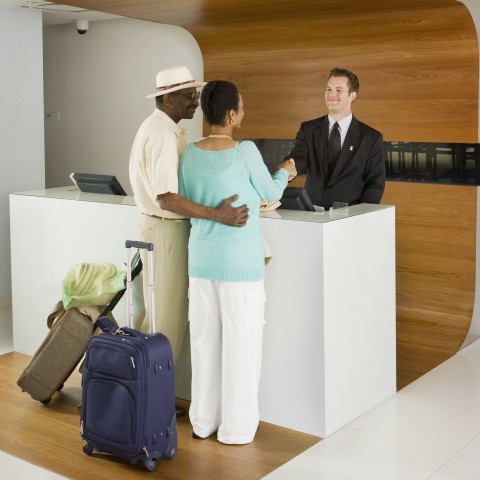
- Haben Sie noch freie Zimmer? Do you have free rooms available?
- Wie viel kostet ein Zimmer pro Nacht? How much is a room per night?
- Ich möchte ein Zimmer reservieren. I would like to reserve a room.
- Ist das Frühstück inklusive? Is the breakfast inclusive?
- Zimmerservice. Room service.
- Um wie viel Uhr ist Check-Out? At what time is the check out?
7. Locations and Transportation

1- Asking for and Giving Directions
2- transportation.
- Wo ist die Haltestelle? Where is the station?
- Wo kann ich eine Fahrkarte kaufen? Where can I buy a ticket?
- Fährt dieser Zug / Bus nach … ? Is this train / bus going to … ?
- Können Sie es mir auf der Karte zeigen? Can you show me on the map?
- Muss ich umsteigen? Do I have to change?
Again, we’ve prepared for you a free vocabulary list with words that you can use when asking for directions and locations.
8. Working Through Communication Barriers
Just in case you don’t know what to say or you didn’t understand anything someone just said to you, here are some phrases that can get you out of this sticky situation:
- Sprechen Sie Englisch? Do you speak English?
- Können Sie das bitte nochmal wiederholen? Could you please repeat that again?
- Ich spreche kein Deutsch. I don’t speak German.
- Ich verstehe Sie nicht. I don’t understand you.
- Können Sie das bitte übersetzen? Could you please translate this for me?
- Hilfe! Help!
Maybe you’re asking yourself if you can go to Germany without speaking any German. Sure you can, you can live there even without speaking the language.
Getting along as a tourist with just English will be more than easy for you. Everybody knows at least the basics of English. And as long as they can see that you’re patient, they’ll be patient with you.
9. How GermanPod101 Can Help You Master Urgent Travel Situations
In this article, we showed you the most helpful phrases that you can use on your travels. We covered some basic pronunciation specialities of the German language, greetings, numbers, situations in a restaurant and hotel, and asking for directions.
While you can survive traveling Germany with only English, Germans will be really grateful when they see that you’re trying to speak their language. We know that German is a hard language, but to see someone trying makes us happy.
This article was just the beginning; take a look at our free resources . But if you really want to get to it and become a good German speaker, then we can offer you a private teacher to help you learn based on your needs and goals with the German language.
Before you go, let us know in the comments how you feel about using the useful German travel phrases outlined in this article. Feel free to reach out with questions in the comments below, and know that the more you practice and use these essential German travel phrases, the easier it will become.
Or sign up using Facebook
Got an account? Sign in here

How To Say ‘Thank you’ in German

Hi, What’s Up, and Beyond: How to Say Hello In German

How to Say I Love You in German – Romantic Word List

The 5 Go-To German Podcasts for Language Learners

Intermediate German Words to Level Up Your Vocab

German Animal Names: The Ultimate Vocabulary List
How to celebrate april fools’ day in german.
- Forum Spotlight
- Scheduled Maintenance
- German Holidays
- German Dictionary
- German Language
- German Translation
- German: one word at a time
- Guest Bloggers
- Advanced German
- German Alphabet
- German Grammar
- German Lessons
- German Online
- German Phrases
- German Podcasts
- German Words
- Tips & Techniques
- Life in Germany
- Living in Germany
- Media Coverage
- News in German-speaking countries
- Feature Spotlight
- Speak German
- Success Stories
- Teaching German
- Team GermanPod101
- Uncategorized
- Word of the Day
- Immigration, Visas
Copyright © 2024 Innovative Language Learning. All rights reserved. GermanPod101.com Privacy Policy | Terms of Use . This site is protected by reCAPTCHA and the Google Privacy Policy and Terms of Service apply.
11 essential German phrases to memorise for your trip
Recently updated on July 6th, 2023 at 09:40 am
Exploring the fairy-tale Neuschwanstein Castle. Walking along the remnants of the graffiti-covered Berlin Wall. Sipping Bavaria’s rich beer-brewing heritage. Admiring beautiful Baroque architecture in Dresden. No matter where you are travelling in Germany, knowing some essential German phrases can help your trip run smoother – and make a good impression on the locals too.
Savvy travellers will probably already know basic German words, and they’re pretty easy to pick up if you don’t. Try hallo (hello), guten tag (good day), auf wiedersehen (goodbye), danke (thank you), bitte (please), ja (yes) and nein (no). And having a few numbers under your belt – eins (one), zwei (two), drei (three) – should come in handy when buying tickets. Or beer, of course.

Taking you (a little) beyond the basic German words you need to know, we’ve pulled together some essential German phrases that are incredibly useful for travellers to have in their back pocket. Best of all, if you learn these you’ll be all set for trips to Austria and Switzerland too. Win, win, win. GET INSPIRED BY: Best of Germany
Wie geht’s?
Few things immerse you in a destination quite like striking up a conversation with locals. Asking “how are you?” is a brilliant way to start. If they ask back, you can reply “ mir geht’s gut ”, meaning “I am fine”. And if the conversation’s going really well, why not introduce yourself? Simply say “ Ich heiße… ” (I am called…) before your name, and ask “ Wie heißt du? ” to find out someone else’s.
Remember: when you come across the ß (called an eszett, a character unique to the German language), simply pronounce it like “s”, as you would in the English “see”.
Entschuldigung
No matter what language you’re speaking, it’s good to have good manners. Just say “ entschuldigung ” (excuse me) to get the attention of hotel receptionists, ticket officers and waiters, or perhaps people who might look like they know the directions you need. Incorporate this into a longer sentence “Entschuldigen sie, ist dies… ?” (excuse me, is this…?) when you’re on public transport and unsure where to get off.
RELATED CONTENT: Germany Destination Guide

Where is…? An essential phrase for explorers. Simply add the name of your intended destination to the end. If you’re in Berlin, for instance, that could be the Brandenburger Tor (Brandenburg Gate), Berliner Fernsehturm (Berlin Television Tower) or Museumsinsel (Museum Island). More common places include the “ Bahnhof” (train station), “Flughafen” (airport), “ stadtzentrum ” (city centre) and “ supermarkt ” (supermarket). Helpfully, “taxi” and “bank” are the same in German and English.
In this case, asking “ zeigen sie mir das bitte auf der Karte? ” (can you show me on the map?) can be a more foolproof way of getting where you want to go. RELATED CONTENT: 5 hidden gems of Germany
Einmal nach… bitte
Germany’s public transport is among the world’s best, and a handful of basic german phrases can help you navigate the various transport systems. To ask for a ticket: “Einmal/ zweimal nach… bitte”, meaning “one ticket/ two tickets to (your destination) please”. Follow up with “ was kostet das?” (how much is it?) and “ wann fährt er ab?” (when does it leave?) and you’ll get from A to B in no time. (Hopefully.)

Ich hätte gerne…
Tucking into the culinary culture of a country is one of the best ways to get a real taste of your destination. Instead of just smiling and pointing at the menu – ask “ kann ich bitte die Speisekarte haben? (can I have the menu, please?) if you don’t already have one – simply add “ Ich hätte gerne ” (I would like) before the name of your preferred food, be it bratwurst (sausage), spätzle (egg noodles), kartoffelkloesse (potato dumplings) or schweininshaxe , a slow-roasted pork knuckle – best enjoyed with a local beer on the side. Sehr lekker! (Very tasty!)
Can’t decide what to order? Ask: “ Was empfehlen sie? ” (what do you recommend?). GET INSPIRED BY: Imperial Europe

As the world’s largest beer festival, Oktoberfest is a huge draw for travellers and locals every autumn (usually late Steptember or early October), but beer is a big part of German culture year-round. These are some German words you need to know: “ Prost! ” (cheers!); “ maß ”, a litre glass jug of beer; and “ Eins, Zwei, Drei, G’suffa!” , meaning “one, two, three, drink!”. You’ll probably want a few brezeln (pretzels) to soak up all that beer too.
This is a time when traditional clothing comes out the wardrobe. Expect to see the dirndl , a peasant-style pinafore, and lederhosen , leather trousers or shorts – or perhaps even get some to wear yourself. RELATED CONTENT: Iconic Germany: 8 of the most incredible German sights
Ich esse kein(e)…
A less fun entry on this list, but necessary for any traveller with special dietary requirements. “ Ich esse kein(e)…” translates as “I don’t eat… “. Follow up with “ nüsse” (nuts), “ milchproductke” (dairy) or “ fleisch” (meat) as appropriate. “Gluten” is the same as in English, and you can explain that you are “ vegetarier(in)” (vegetarian, adding the ‘in’ for female), “veganerin vegan or have “ die Zöliakie ” (coeliac disease).
Die Rechnung, bitte
The bill, please. An essential ending to any meal. “Kann ich zahlen ?” (can I pay?) is a less formal way of asking. And “ Entschldigung, wo ist die Toilette ” (Excuse me, where is the toilet?) might also come in handy after all those beers. GET INSPIRED BY: Best of Germany and Austria

Was kostet das?
It’s inevitable you’ll end up parting with a few euros in shops, whether that’s on travel basics or souvenirs for yourself, and friends and family back home – especially if you visit a “ weihnachtsmarkt ” (Christmas market). “ Nur schauen ” (just looking); “ darf ich mit Bargeld bezahlen? ” (may I pay with cash?); “ darf ich mit Kreditkarte bezahlen? ” (may I pay with credit card?); and the aforementioned “ was kostet das? ” (how much is it?) should all be useful here.
GET INSPIRED BY: Christmas Markets of Austria, Germany and Switzerland
RELATED CONTENT: The best Christmas markets in Germany
Ich brauche einen Arzt
We sincerely hope you don’t have to use them, but if anything goes awry, “ ich brauche einen Arzt ” (I need to see a doctor) or “ fahren sie mich bitte zum Krankenhaus ” (take me to the hospital) are handy for the linguistic arsenal. Simply “ Krankenhaus” should do the job in an emergency. Consider it the word equivalent of the traveller’s first aid kit.
Sprechen sie English?
Unless you’re fluent, there will, of course, be times when you reach the limits of your German language skills. In that case, ask “ sprechen sie English?” (do you speak English?). There’s a good chance the answer will be yes; more than half of the people in Germany speak English, and more still in areas popular with travellers, such as Berlin, Hamburg, Frankfurt and Munich.
In this conversation, it might be worth adding “ Ich verstehe nicht” , meaning I don’t understand, or “ Ich spreche nicht gut Deutsch” (I do not speak German very well).
What words have you found useful when travelling in Germany? Anything other phrases you’d like to know? Let us know in the comments.
Want to hear more from us?
Sign up to receive inspiring travel articles, offers & news
" * " indicates required fields
Privacy Overview
Sign up for our emails.
Travel and Language Adventures

Ultimate and Printable Guide: Basic German for Travelers

Are you planning a trip to Germany soon? If so you’re not alone, approximately 37.4 million people visit Germany every year making it the ninth-most visited country in the world. German is also one of the most prevalent languages spoken and taught worldwide, with over 130 million speaking it around the globe.
Having some knowledge of basic German words and phrases in your repertoire is a great asset before departing on your trip. Even if a large percentage of Germans know some English, they may not be comfortable using it. Additionally, locals usually respect the fact that a visitor has taken the time to learn some of their language.
Some German words are quite similar to English as you will see. However, the pronunciation of some other German words can be quite daunting. You may not have a community of native German speakers at your disposal to help with pronouncing new words either. While talking with native speakers is the best way to learn, online tools like Google Translate or Duolingo can help in the meantime.
Without further adieu, here are some great Basic German Words and Phrases you should know before traveling to Germany:
General Greetings
- Hello — Hallo
- Thank You — Dankeschön or simply ‘Danke’
- Good Morning — Guten Morgen
- What time is it? — Wie spät ist es?
- Good Day — Guten Tag
- Good Evening — Guten Abend
- Goodbye — Auf Wiedersehen
- Please — Bitte
- Sorry — Entschuldigung
- My name is *name* — Ich heiße *name*
- How are you doing? — Wie geht es Ihnen?
- Do you speak English? — Sprechen Sie Englisch?
- Airport — Der Flughafen
- Train Station — Der Bahnhof
- Restaurant — Das Restaurant
- Washroom — Der Waschraum (WC)
- Hotel — Das Hotel
- Museum — Das Museum
- Metro — Die U-Bahn
- Car — Das Auto
- Taxi — Das Taxi
- Bus — Der Bus
- Ticket — Das Ticket
- Street — Die Straße
- Passport — Der Pass
- Luggage — Das Gepäck
Food and Drink
- Water — Wasser
- Beer — Bier
- Coffee — Kaffee
- Bread — Brot
- Cheese — Käse
- Breakfast — Frühstück
- Lunch — Mittagessen
- Dinner — Abendessen
- Food — Essen
- Drinks — Getränke
- Menu — Speisekarte
- Cheque, please! — Rechnung bitte!

Get the Free Printable Version HERE
The German language has ‘formal’ and ‘informal’ words that English does not have to address someone. For instance, in English, you would just ask ‘How are you doing?’, whereas Germans can ask either ‘Wie geht es Ihnen?’ (formal) or ‘Wie geht es dir?’ (informal). If you have never met someone before, make sure you use the formal ‘you’.
Another thing to remember: the emergency number in a foreign country may not be the same as your own. For instance, in Germany, it is 112. Something important to note before traveling to a new place, just in case you need it!
With some Basic German words and phrases in your repertoire, you’re ready to enjoy your visit to Deutschland!

You May Also Like

Ultimate and Printable Guide: Basic French for Travelers

Ultimate and Printable Guide: Basic Swedish for Travelers
How to learn German for travel: Is 4 weeks enough?
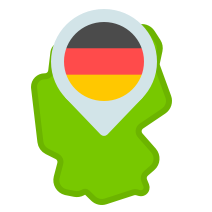
Earlier this year, I planned a trip to Italy and studied Italian for 4 months to prepare. It was great! I had lots of meaningful conversations, confidently navigated cities and towns in the countryside, and successfully ordered what I intended, every single time. 💯
But this time was different: I made plans to go to Germany for work, which was exciting except… I didn’t know any German! I've never studied it, everything I know comes from "99 Luftballons," and when I went to Germany in 2008 (pre-Duolingo days), I learned the word for "once" and mistakenly used it in coffee shops across Berlin ( einmal croissant, einmal coffee, "once croissant, once coffee"). Ack. 🎈
This time, I used Duolingo to prepare—and I only have 4 weeks! Here's how I prepared for my trip and how it went. Maybe it'll give you ideas of how to prepare for your own trip, especially if you only have a few weeks!
Learning German for travel:
Setting goals for myself.
- 4-week study guide
How I studied
What i learned in 4 weeks.
- Unpacking: Was 4 weeks enough?
Setting clear goals was important for staying motivated and keeping my learning on track, and it helped me be realistic about what I could accomplish in just 4 weeks. After a month, I was still going to be a beginner—definitely at the A1 level in the international language proficiency scale we use at Duolingo ( the CEFR )—so here were my specific, personal language-learning goals for German:
- Be able to greet and be pleasant to German speakers. I wanted to feel comfortable saying hello, good morning, thanks, you're welcome, see you later, asking basic questions, etc. I hoped to avoid the stereotype of the typical American who travels abroad and doesn't know a single word of the language!
- Be able to recognize information, especially on menus and schedules. I pictured having a quiet breakfast and coffee alone, and also wanted to visit a museum or two, so I wanted to understand what I'm ordering when friends and colleagues weren’t around to help, order it successfully, and buy the appropriate tickets for tours or at museums.
- ⚠️ STRETCH GOAL ⚠️ Have one small conversation in German. My reach goal was to have a short exchange in German—whether it was explaining where I'm from and why I'm in Germany, or a rave review of a meal (I was very excited about German bread!!), or being able to tell hotel staff about something I need. This was a wildcard! But wouldn't one real conversation be cool?
I could see that Unit 1 ("Order in a cafe, describe your family") is shorter than the others, and I know that Duolingo scaffolds lessons , so they'll gradually build on each other. I planned to work on regular lessons, the Stories that are mixed into the path, Legendary Levels , and the Practice Hub . I also resolved to mix up my practice with new side quests —these are lessons that you complete to earn stars under the Duolingo characters playing on either side of the path. They're timed, so they are a fun challenge, and they review material from the regular lessons.
I only had four weeks, so I focused on only what I needed to accomplish my goals. I consulted the titles and guidebooks at the top of each Unit to see what would be covered, so my goal was to get through Unit 7.
My 4-week study guide
I followed the same rhythm for the whole four weeks: each day, I completed about two circles of the path (does that make them pebbles ?), plus a little extra (like Legendary Levels or side quests), so that I completed about two Units a week. Here's a detailed look at my Week 1, followed by my 4-week plan:
4 week study plan
Since I didn't have much time before my trip, I was pretty serious about my study routine. It helped that many other parts of my day were focused on Germany, too, like my tasks at work and figuring out what to pack (for me: long underwear).
Here's how I studied:
- I focused on my lessons. When I was studying, I wasn't doing anything else, like listening to music or watching TV. (Two exceptions: once I did lessons quickly on the subway platform to not lose my streak, and on Thanksgiving I did my lessons while watching the oven!) This meant I was really thinking about German and was focused on everything I was seeing in my lessons.
- I spoke—a lot. Since my goals were mostly about speaking, I made sure to speak in all my lessons. I never turned off speaking exercises (...except on the subway platform), I repeated everything out loud, and I used the microphone to speak answers even when I could have typed them.
- I took notes by hand. During the first week, I started keeping track of what I was learning—and what I wanted to remember—in a notebook. I made lists of words from memory, and I categorized them by grammatical gender . I wrote important question phrases (like "Where is ___ ?" and "How are you?") and made little groups of words (like "always," "never," "sometimes," and "often"). I wrote mini dialogues and imagined telling someone about myself. It didn't matter that no one was checking my work or grammar, because there was no way my German was going to be perfect in time for my trip anyway! Plus, making myself remember everything "from scratch" was just what I'd be doing in Germany.
- I saved important words and phrases in screenshots. Whenever I came across an important word (especially if it felt hard to me) or a useful phrase, I took a screenshot so I could easily flip back to it to practice. I used my screenshots when I wanted to add things to my notes, and also as an easy way to remind myself of vocabulary throughout the day. They were also a sneaky reminder whenever I opened my photos app!
- I used German every chance I could. Now, I didn't have tons of chances to practice using my German before I left for my trip… but I used every one of them! 😂 I said Guten Morgen! (Good morning!) to my English-speaking colleagues, I muttered greetings and my breakfast order under my breath while I walked to brunch, and I thanked hotel staff in German when I emailed them with questions.
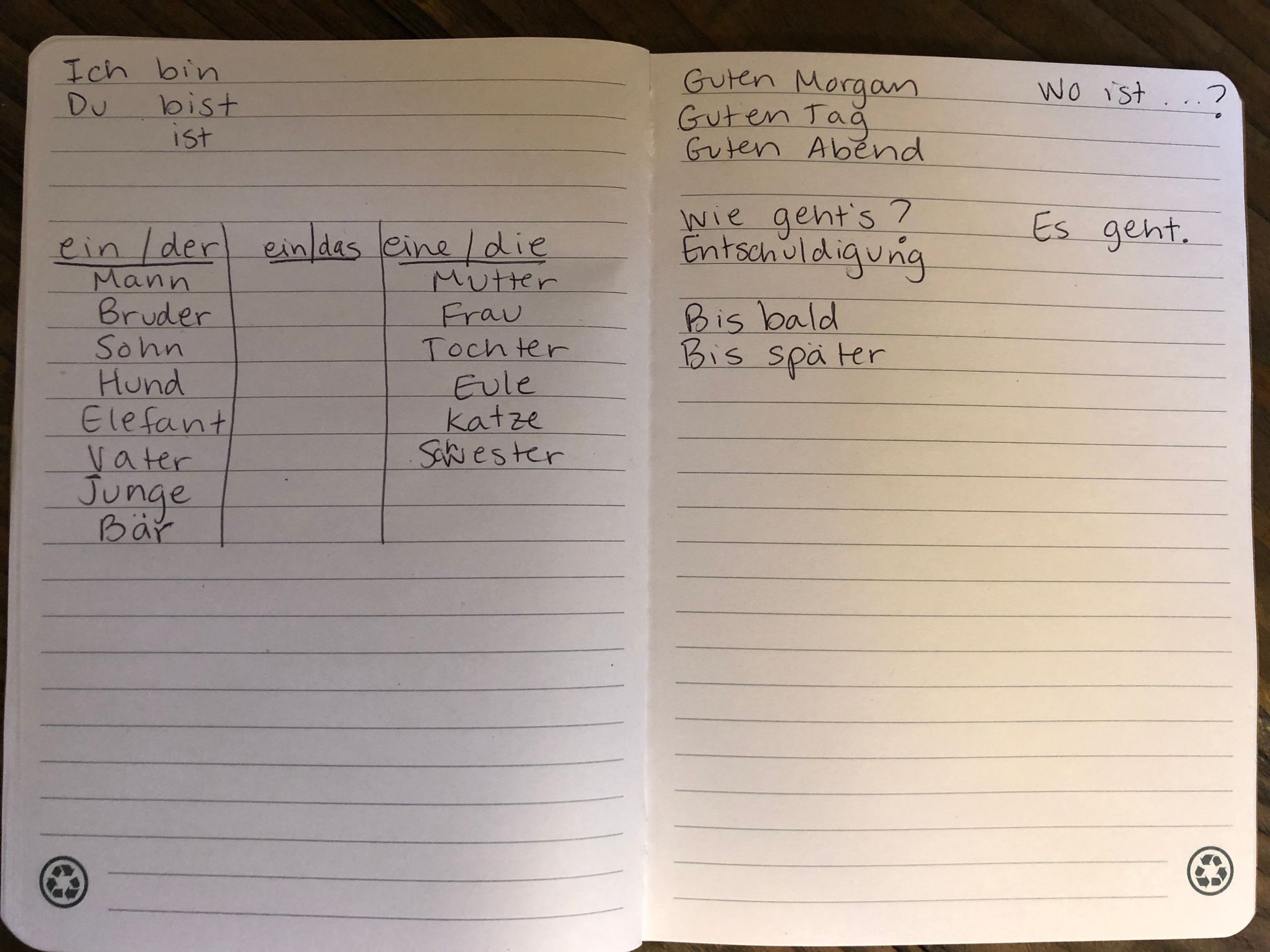
In just the first week—completing the first three units of the course—I had already learned a lot of the key expressions and building blocks that I used in Germany:
- Vocabulary about food and drinks, like Kaffee (coffee), Brot (bread), and Wasser (water)
- Some words for people and animals, including Schwester (sister), Mann (man, husband), and Katze (cat)
- The most important question for travelers: Wo ist ___? (Where is ___?)
- Combining words like und (and) and oder (or), which were especially helpful for my food orders (always mit Käse, bitte "with cheese, please")
- Grammatical gender categories and basic word order
- A lot of words that will help me interact in conversations, including ja (yes), nein (no), bitte (please), and tschüss (bye)
By the end of Week 1, I could also introduce myself, make simple sentences ( Die Katze ist sehr gut! "The cat is very good"—which wasn't even in my lessons, I don't think!), and be polite (I knew I'd need Entschuldigung (excuse me) a lot!).
Here's some of what I learned to do in Units 4-7:
- Talk about where people are from ( Ich komme aus Amerika und Frau Heidi Klum kommt aus Deutschland, "I am from the U.S., and Ms. Heidi Klum is from Germany")
- Use formal titles and speak formally to others (I'd need this if I met Frau Klum or Frau Angela Merkel, according to my lessons)
- Discuss some activities and hobbies, conjugate verbs about them (!!), and say how often they happen—which means I can make longer sentences to say it all!
- Describe all kinds of buildings and businesses and where they are located (and I heard those direction words a lot, for where bathrooms were, which train doors would open, and more)
- Count up to 10, which was basically all I needed for a quick trip, since large numbers like prices were usually printed on receipts or displayed on cash registers
So, was 4 weeks enough to learn German?
I wouldn't say I learned the entire German language, but I had a great time with the German I learned! I kept track of what I was able to do in German in a Twitter thread . This was a really fun way to celebrate using the language during my trip, and I love having it as a souvenir to remember not just what I did in Germany, but all the ways I was able to use German!
I also accomplished all my goals: I was able to greet and be pleasant to German speakers, I recognized information all around me (including on menus and train schedules)—and I achieved my stretch goal of having a small conversation! Or, sort of 😅 The conversations I had were very tiny, but my big accomplishment was ordering my breakfast at a German café, in a convincing enough way that staff responded to me in German—far more German than I could understand! 🏆
For my traveling style, I'm much more comfortable having a few months of language study under my belt, like I had for Italy , so I can express myself better, understand people's responses, and put more words togethers. I felt comfortable and confident using what I learned in under a month, and I wonder how my German will be after eight months, next summer! 😉 🇩🇪
Related Posts All Posts
Can i use chatgpt to practice a new language, dear duolingo: are arabic, hebrew, and persian related.
German for Travelers: The Basic Travel Phrasebook
- History & Culture
- Pronunciation & Conversation
You hear it all the time. Don't worry, everybody in Germany (Austria/Switzerland) speaks English. You'll get along just fine without any German.
Well, since you're here at the German Language site, you know better. First of all, not everyone in German Europe does speak English. And even if they did, how rude of anyone going there not to bother learning at least the basics of the language.
If you're going to be in a German-speaking country for a long period of time, it's obvious you'll need to know some German. But often travelers or tourists going for a brief visit forget one of the most important elements in planning their trip: Deutsch. If you're going to Mexico, you want to know at least " un poquito de español ." If you're headed for Paris, " un peu de français " would be nice. Germany-bound travelers need "ein bisschen Deutsch" (a little German). So what's the minimum for a traveler bound for Austria, Germany, or German Switzerland?
Well, courtesy and politeness are a valuable asset in any language. The basics should include "please," "excuse me," " sorry ," "thank you," and "you're welcome." But that's not all. Below, we have prepared a short phrasebook with the most important basic German phrases for a traveler or tourist. They are listed in approximate order of importance, but that is somewhat subjective. You might think that "Wo ist die Toilette?" is more important than "Ich heisse..."
In parentheses (pah-REN-thuh-cees) you'll find a rudimentary pronunciation guide for each expression.
Travel Deutsch: Basic German for Travelers
Mixing any of the above phrases-for example, "Haben Sie..." plus "ein Zimmer?" (Do you have a room?) may work, but requires a bit more grammar knowledge than a real beginner is likely to possess. For instance, if you wanted to say, "Do you have a rental car?" you would have to add an -en to "ein" ("Haben Sie einen Mietwagen?"). But leaving it off would not prevent you from being understood-assuming you are pronouncing the basic German correctly.
You won't find too many questions in our guide. Questions require answers. If you ask a question in fairly decent German, the next thing you're about to hear is a torrent of German in the answer. On the other hand, if the restroom is left, right, upstairs, or downstairs, you can usually figure that out-especially with a few hand signals.
Of course, it's a good idea to go beyond the bare minimum if you can. Several important areas of vocabulary are relatively easy to learn: colors, days, months, numbers, time, food and drink, question words, and basic descriptive words (narrow, tall, small, round, etc.). All of these topics are covered in our free German for Beginners course.
You'll need to set your own priorities, but don't forget to learn at least some essential German before your trip. You'll have "eine bessere Reise" (a better trip) if you do. Gute Reise! (Have a good trip!)
Related Pages
German Audio Lab Learn the sounds of German.
German for Beginners Our free online German course.
Travel Resources and Links A collection of information and links for travel to and in German Europe.
Wo spricht man Deutsch? Where in the world is German spoken? Can you name the seven countries where German is the dominant language or has official status?
- How to Write Personal Letters in German
- German Phrasebook: In the Classroom
- The Two German Past Tenses and How to Use Them
- Where To? (Wohin?)
- German Verbs with Prepositions 1 - German Lesson
- Capitalization in German
- How to Speak Business German
- English to German Language Lesson: Shopping Vocabulary and Phrases
- Top German Mistakes Made by Beginners
- Asking for Directions in German
- German for Beginners: Study Tips
- Denglish: When Languages Collide
- True or False: German Almost Became the Official US Language
- Which Countries Speak German?
- Reading Shakespeare in German
- Kinderreime - Nursery Rhymes in German and English

Home » Destinations » Europe » Germany » Helpful German Phrases That Make Your Trip to Germany Easier
Helpful German Phrases That Make Your Trip to Germany Easier
Links in this article may earn us a little money if you book/ order stuff. More here .

Begin to Learn Some German Phrases for Your Upcoming Trip!
If you’re heading to Germany, Austria, or parts of Switzerland (or any new country, for that matter) it’s best to learn a few phrases in the language spoken.
Learning to speak a few words can help you be polite and respectful in a new place, while also allowing you to get the most out of your experience. Learning German is no different.
Travelling to Germany for the first time can be exciting. Admittedly, it can also be a little daunting! So, we’ve put together a guide on 11 things you should know before travelling to Germany .
Hopefully, it’s helpful and you get to discover more beautiful places in Germany on your trip!
If you’re planning to stick to big cities there’s a good chance you’ll be just fine speaking in English. People in tourism and the service industries will also be able to speak English.
That said, if you are in smaller cities and/or speak to older people they might not know enough English to have a full-on conversation.
However, often they’ll understand more than they are able to speak! So whether you’re looking to chat up a storm or just want to be polite to those you meet, here are a few German words and phrases that you will need/will use if you’re travelling to Germany!
Table of Contents
Things to Know About Learning the German Language
Before we start, there are a couple of things we should say about learning the German language. Eric has been learning German since he and Lisa started dating and it’s been a slow but rewarding process.
He’s improved a great deal to the point where we can piece together simple sentences and respond according to lots of different situations.
The biggest barrier to learning fully is using it daily and committing time each day. Learning a new language takes time and commitment.
However, all of Lisa’s family speaks German and not much English so it’s kinda on Eric to learn German so they can communicate effectively!
Eric is using a few tools that make it easy to learn and stay on track. He started using the Duolingo app for simple words and uses Babbel currently to do lessons. One of the books he’s using is the Assimil German Paperback.
We bought it in Hamburg and it’s great for understanding conversations in context through little dialogues – while also including explanations as to why things are the way they are (eg. verb tenses, the reason a word is spelled differently than before, etc).
He also has the Berlitz German Phrase Book which is super tiny and really good as both a phrasebook and a dictionary for vocabulary and a few verbs. Pretty handy!
Formal and Informal Forms
Unlike in English, in German there is an informal (du) and a polite form (Sie) when you are addressing people.
As a foreigner that clearly doesn’t know the language well and is just trying some phrases you probably won’t have to worry about it too much. Generally, people will just be happy that you are trying to speak to them in their native language.
For a little more context, however: You would address anyone older than you that you do not know well with “Sie”, while you oftentimes could address people that are your age with “du”.
This is especially true for the younger generations who seem to be using “Sie” less. An exception would be in any formal situation: e.g. you’re eating at a restaurant, talking to a police officer, etc. – or whenever you are unsure, just go for the polite version.
Letters of the German Language
Pronouncing German words is actually not as difficult as people sometimes make it out to be. Of course, there are some complicated words, but in general, you’ll be just fine.
The German alphabet has four additional letters compared to the English alphabet. They are ß (sometimes also written as ‘ss’), ä, ö, and ü. Eric likes to call ß “crazy B” even though it has nothing to do with the English letter B.
Standard German Phrases
If you’re just looking to just learn a few of the standard basic German words or phrases, here is a short list of what you’ll need to know:
- Hallo = Hello
- Guten Morgen = Good Morning
- Guten Abend = Good Evening
- Tschüss = Bye
- Danke = Thank You
- Bitte = Please OR You’re Welcome
Since in German “Bitte” can be “please” as well as “you’re welcome”, the concept of having two separate expressions can be foreign to German speakers.
Take Lisa’s mom for example – in the beginning when she wanted to say “you’re welcome” in English to Eric’s “Thank you” and would often say “please”. We’ve since had a good laugh and it’s been corrected!
- Entschuldigung = I’m Sorry/Excuse Me
Introducing Yourself in German
- Ich heiße XXX/Mein Name ist XXX = I’m called XXX/ My name is XXX
- Ich komme aus (add country here, e.g. den USA, Kanada, Australien, Großbritannien) = I’m from (add country, e.g. USA, Canada, Australia, UK)
Ordering at a Restaurant/Café
In Germany, you usually don’t have to wait to be seated – especially not in a cafe. An exception might be a fancy restaurant or if you made a reservation prior to showing up since they will have a table ready for you. If you would like to see the menu, you can say:
- Die Karte bitte = The menu please
If you want to order a coffee, you could say:
- Einen Kaffee bitte = A coffee please
- Ich hätte gerne einen Kaffee = I’d like to have a coffee
Of course, you can also substitute this word “Kaffee” with others, e.g. einen Cappuccino, einen Orangensaft (orange juice), ein Glas Wasser (a glass of water), ein Bier (a beer).
You should note that the word “einen” could change as well if you use another word instead of coffee – that is because Germany uses masculine, feminine and neutral nouns so we can’t just use “a coffee, a beer etc.” for every word.
As a visitor that doesn’t speak German, you shouldn’t worry about it – everyone will still know what you mean even if the “a-part” in front of the noun is not the correct form.
Before you start eating, you would say:
- Guten Appetit = Enjoy your meal. This is something that is very common in German, but doesn’t really exist in English – so before you start eating just wish “Guten Appetit” to the people you’re with, they’ll likely do the same.
If you want to order a second beverage, you could say:
- Noch einen Kaffee bitte = Another coffee please
- Noch ein Bier bitte = Another beer please
When you’re done and ready to pay, say:
- Die Rechnung bitte = The check please
Asking for Help/Clarification
- Sprechen Sie Englisch?/ Sprichst du Englisch? = Do you speak English? (The first is the formal version, the second is the informal version)
- Ich spreche kein Deutsch = I don’t speak German
- Wo ist XXX? = Where is XXX? This is useful if you’re trying to find a train station, sight, specific street, etc. However, don’t expect the first person you ask to know the answer, especially in big cities.
- Kannst du das wiederholen? = Can you repeat that?
- Kannst du langsamer sprechen? = Can you speak slower?
- Ich verstehe nicht = I don’t understand
Numbers in German
When you are in Germany you might have to use some numbers. For example, if you want to order for groups (e.g. more than one beer) or when getting ice cream and you want more than just one scoop.
Of course, there are many other occasions when knowing basic numbers might come in handy.
- Drei = Three
- Vier = Four
- Fünf = Five
- Sechs = Six
- Sieben = Seven
- Acht = Eight
- Neun = Nine
Common Words You’ll See Around The Cities
When you walk through German cities you’ll come across lots of German phrases on buildings or signs.
These are some of the most common ones and knowing their meaning can be very helpful.
- Eingang = Entry
- Ausgang = Exit
- Drücken = Push
- Ziehen = Pull
- Right = Rechts
- Left = Links
- Straße = Street
- Bahnhof = Train Station
- Zentrum/Innenstadt = City Centre
- Strand = Beach
- Parkplatz = parking space
- Bahn = Train
And there you have it – some of the most important words and phrases you’ll need for your trip to German-speaking countries!
In short, try your best and you’ll be just fine. Often, it’s the effort that counts. If there’s anything you need or want to learn, feel free to get in touch!
We’re happy to answer any real-life German language questions you might have! And if you’re learning right now, stick with it like Eric and you’ll get there!
As always, fröhliches Watscheln! -L&E
- Compare flights on Skyscanner
- Check for Hotel Deals or Book A Hostel
- Get A Rental Car (depending on the destination)
- Research plug types and possibly get a travel adapter
- Go over our packing list
Related Articles
We write quite a bit about Germany (given half of P&P is German) so check out our other German posts for travel inspiration:
- A Massive Germany Itinerary Planner for 5 to 14 Day Trips
- Discover the Biggest Cities: Berlin and Hamburg
- Looking for a Giant Castle? Coburg has one – and so does Aschaffenburg !
- Like wine and old towns? Würzburg , Wiesbaden , or Mainz should be on your list.
- Discover Underrated Cities: Aachen and Bamberg !
- These are Great German Hostels we Loved Staying At!
Pin it for later!

As an Amazon Associate we earn from qualifying purchases.
Destinations
Privacy policy
Disclaimer & Affiliate Disclosure
Terms of use
© 2024 Creativlier Media Inc.
German Word Of The Day
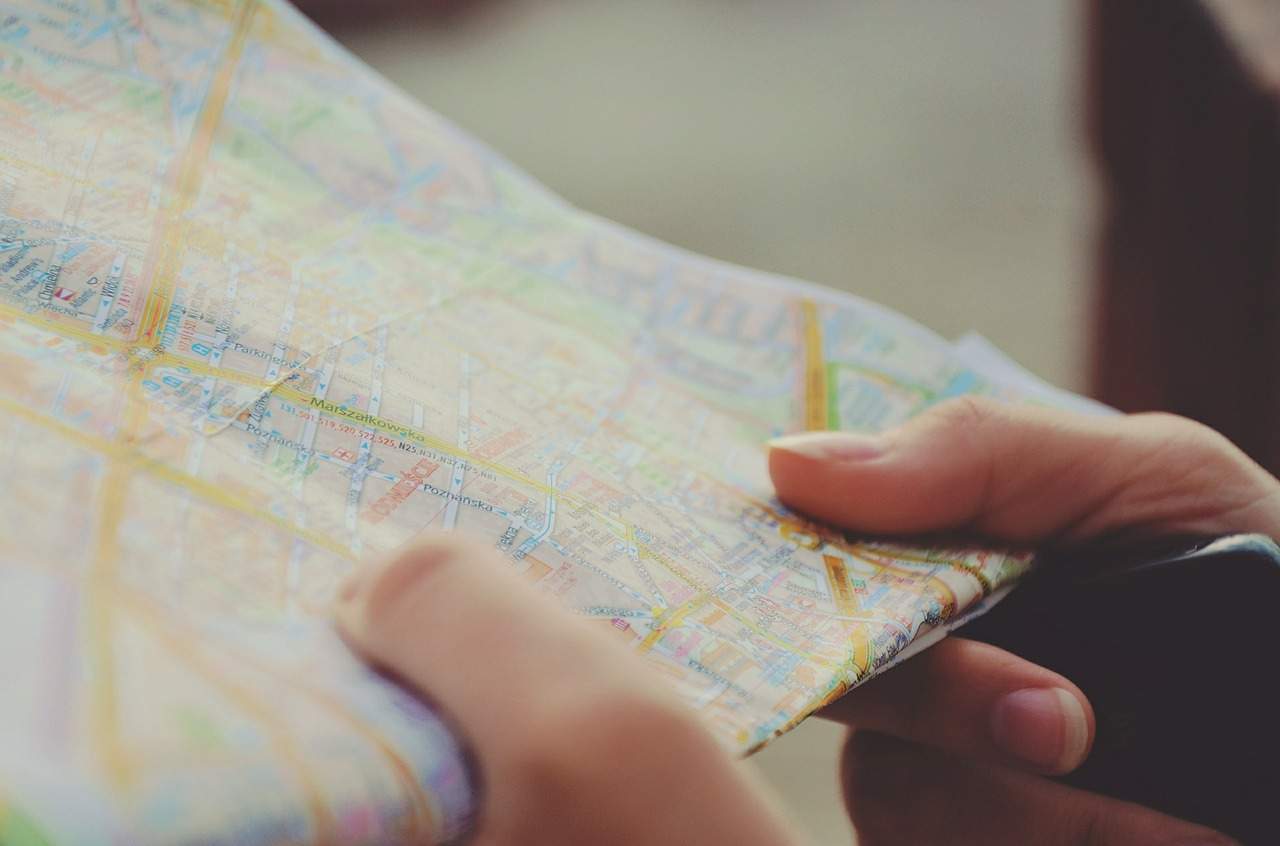
100+ German Travel Phrases And Words To Know Before You Visit Germany PDF
Let me start by saying that you don’t really have to learn German if you are planning to travel to Germany. I believe it’s pretty easy to travel in Germany without speaking German. Not all Germans speak good English, but as a tourist, you probably won’t have problems in tourist spots as the staff usually speaks English and often even other foreign languages like French, Spanish, Italian etc. Maybe if you travel to some less popular tourist places, some basic German skills can be handy.
And if you just want to learn a few basic German greetings and phrases, it will be appreciated by German speakers. Everyone likes it when you make an effort and talk to them in their native language. Besides, the phrases that you need as a tourist are pretty basic, so it can be fun to practice speaking German even if you are a beginner.
You can learn a few useful German phrases before you travel to Germany or just download and print this PDF or save it to your phone and use it whenever you need it during your trip to Germany.
The prases below include:
- German Greetings and basic expressions
- Simple questions
- Basic German phrases for shopping
- Some phrases for eating out: how to order food in German and ask for special requests( if you are vegetarian, vegan etc) and pay the bill
- A short list of German food words (if the restaurant doesn’t have an English menu)
I didn’t include the phases about introducing yourself in German on this list, because I feel you don’t really get to talk to people often as a tourist unless maybe you are traveling alone. But if you want to learn how to introduce yourself in German, check out this post (also downloadable PDF):
How to introduce yourself in German
All German phrases on this list are in a respectful “Sie” form because this is what you usually have use when you address strangers.
Download 100+ useful German phrases and words for travel PDF
Basic German expressions and greetings
1. Hallo! – Hi!
2. Guten Morgen! – Good Morning!
3. Guten Tag! – Hello!
4. Guten Abend! – Good Evening!
5. Auf Wiedersehen! – Goodbye!
6. Tschüß! – Bye!
How to say ‘Goodbye’ in German in 20 different ways
7. Schönen Tag noch! – Have a nice day!
8. Schönes Wochenende! – Have a nice weekend!
9. Ja – yes
10. Nein – no
11. Bitte – please/you are welcome
12. Danke – thanks
13. Danke schön – thank you very much
14. Vielen Dank – thanks a lot
15. Entschuldigen Sie – excuse me
16. Entschuldigung – Excuse me/sorry
A few questions that you can use to ask about things and places:
17. Wo finde ich …? – Where can I find …?
18. Wo ist ….? – Where is …?
19. Haben Sie …? – Do you have …?
Basic German vocabulary for shopping
When you are in a store, you might hear a shopping assistant ask you:
20. Kann ich Ihnen helfen? – Can I help you?
If you just want to look around, you can answer:
21. Danke, ich schaue nur. – Thanks, I am just looking.
Or ask some questions if you need help:
22. Wie viel kostet das? – How much is this?
23. Haben Sie das in Größe …? – Do you have this in a size …?
Everyday German: The Only 10 German Phrases I Use in Daily Life
Phrases for eating out.
Here are some useful German phrases that you can use in cafes and restaurants:
24. Einen Tisch für (zwei/drei/vier), bitte. – A table for (two/three/four), please.
25. Ich habe einen Tisch reserviert. – I reserved a table.
26. Ich hätte gern … – I would like …
27. Ich möchte … – I would like …
28. Zum Wohl! – Cheers!
29. Prost! – Cheers!
30. Guten Appetit! – Enjoy your meal!
31. Wo ist die Toilette? – Where is the bathroom?
32. Herren/Männer – m en
33. Damen/Frauen – w omen
These words will help you to understand the menu if the restaurant has the menu only in German language.
34. die Speisekarte – menu
35. das Essen – food
36. das Gericht(e) – dish(es)
37. das Hauptgericht(e) – main dish(es)
38. das Tagesgericht – the meal of the day
39. die Vorspeise(n) – starter(s)
40. der Nachtisch – dessert
41. das Frühstück – breakfast
42. das Mittagessen – lunch
43. das Abendessen – dinner
44. vegetarisch – vegetarian
45. laktosefrei – lactose-free
46. glutenfrei – gluten-free
47. gebraten – fried
48. gekocht – cooked, boiled
49. das Fleisch – meat
50. das Rindfleisch – beef
51. das Schweinefleisch – pork
52. das Hähnchen – chicken
53. der Fisch – fish
54. der Lachs – salmon
55. das Obs t – frui t
56. das Gemüse – vegetables
57. die Kartoffel(n) – potato(s)
58. die Karotte(n) / die Möhre(n) – carrot(s)
59. der Pilz(e) – mushroom(s)
60. die Paprika – bell pepper
61. die Zwiebel(n) – onion(s)
62. die Bohnen – beans
63. die Erbsen – peas
64. die Soße – sauce
65. das Salz – salt
66. die Suppe – soup
67. der Käse – cheese
68. die Wurst – sausage
69. das Getränk(e) – drink(s)
70. alkoholfrei – alcohol-free
71. der Saft – juice
72. das Wasser – water
73. der Sprudel – sparkling water
74. stilles Wasser – still water
75. die Milch – milk
76. das Bier – beer
77. der Wein – wine
78. der Weißwein – white wine
79. der Rotwein – red wine
80. der Sekt – sparkling wine
81. der Tee – tea
82. der Kaffee – coffee
83. der Zucker – sugar
84. mit – with
85. ohne – without
Special food requests:
86. Ich bin Vegetarier/in. – I’m vegetarian.
87. Ich bin Veganer/Veganerin. – I am vegan.
88. Ist das glutenfrei? – Is this gluten-free?
89. Haben Sie vegetarisches/veganes Essen? – Do you have vegetarian/vegan food?
90. Haben Sie vegetarische/vegane Gerichte? – Do you have vegetarian/vegan dishes?
91. Ist das Gericht glutenfrei/vegetarisch/vegan? – Is the dish gluten-free/vegetarian/vegan?
Many restaurants offer food and drinks to take away, so they might ask you:
92. Zum hier essen oder zum mitnehmen? – To eat here or to take away?
93. Zum hier trinken oder zum mitnehmen? – To drink here or to take away?
94. Zum mitnehmen, bitte. – To take away, please.
95. Zum hier trinken/essen. – To drink/eat here.
Paying the bill
When you finish eating and want to pay, you can say:
96. Die Rechnung, bitte. – The check, please.
97. Kann ich mit Kreditkarte zahlen? – Can I pay with credit card?
98. Kann ich bar bezahlen? – Can I pay cash?
99. Ich möchte bitte zahlen. – I would like to pay, please.
100. Möchten Sie getrennt oder zusammen zahlen? – Do you want to pay together or separately?
101. Zusammen oder getrennt? – All together or separately?
102. Zusammen, bitte. – Together, please.
103. Getrennt, bitte. – Separately, please.
How to say “I don’t understand” in German
104. Ich verstehe nicht . – I don’t understand.
105. Können Sie bitte wiederholen? – Can you repeat please?
106. Sprechen Sie Englisch? – Do you speak English?
107. Ich spreche nur ein wenig Deutsch. – I only speak a little German.
108. Ich kann nicht (so gut) Deutsch sprechen. – I can’t speak German (very well).
109. Ich spreche kein Deutsch. – I don’t speak German.
100+ German travel phrases and words PDF
I hope these phrases will be useful for your trip and enjoy your time in Germany!

germanwordoftheday
Leave a Reply Cancel reply
Your email address will not be published. Required fields are marked *
Save my name, email, and website in this browser for the next time I comment.

Traveling to Germany? Learn These Must-Know German Words and Phrases

If you are planning a trip to Germany, you will want to learn some basic German phrases and useful travel phrases before you go.
This will make it easier for you to greet people, ask for directions and order food, among other vital day-to-day activities.
Of course, many people in Germany will speak some English, but you cannot take this for granted. Moreover, it is nice to show willingness and learn some German as a sign of respect.
Now, before we dive into this quick guide to German travel phrases and everyday German phrases let’s introduce the German language.

The German Language
German is spoken by 95 million native speakers, predominantly around Western Europe. It is an Indo-European language and belongs to the West Germanic group of the Germanic languages.
Learning German is relatively straightforward for people who speak English. You can expect to speak German at an intermediate level after around six months if you dedicate yourself to your studies.
You can learn basic German words from language-learning apps like Duolingo. Beyond that, you should engage with German music and German TV shows and movies .
Listening to native German speakers will help you to develop your listening comprehension and vocabulary.
This is a style of immersive learning that is very popular in the language-learning community. Check out Lingopie for their large catalogue of native German content hand-picked for language learners.
The Very Basics
Before we delve into specific German travel phrases, let's go over the very basics. These are common German phrases for everyday use.
Danke (schön)
Starting with one you may already know, we have " thank you (very much) ". You may already be familiar with the more common German phrases from movies and your previous travels. Danke schön is one of the most useful phrases you can learn, so write it down!
Sticking with the theme of manners, we have " please ". Even learning just "please" and "thank you" in German will take you a long way. People love to see that you have made the effort to be polite in their mother tongue.
Another must-know pair of words is " yes " and" no " respectively. Both are very useful words and should be memorized before you begin to learn German travel phrases.
German Greetings
Now, we can move on to greetings in the German language. These basic German words will endear the locals to you and help you to make friends in Germany.
Guten Morgen
Beginning chronologically, we have " good morning ". You can use "good morning" until midday to greet someone, just as you do when you speak English.
For a more general greeting, you can use guten Tag, meaning " good day ", between the morning and evening in Germany.
Guten Abend
In the evening, you will say guten Abend for " good evening ". You can use "good evening" until you are ready to turn in for the night.
Then, before going to bed, you will say " good night ". These phrases are used much in the same way as we use them in English.
Auf Wiedersehen
This is one of the German expressions many people know, thanks to the Sound of Music , but if you don't, Auf Wiedersehen means " goodbye ".
To introduce yourself, you can say " my name is... "
Wie heißen Sie?
And ask your new friend in Germany " what is your name? "
Ich komme aus…
To introduce your home country or city, say ich komme aus… , meaning "I come from..."
Wie geht's?
Now for some more conversational German expressions. Wie geht's? is " how are you? "
Mir geht's gut
To which you can reply " I am good ". Basic but easy for beginners.
Sprechen Sie Englisch?
This phrase means " do you speak English? "
It is written here in formal language which is customary when speaking to someone you do not know. But you can also ask sprichst du Englisch? if you are speaking to someone younger than you or someone you know well.
German Travel Phrases
Now, let's look at all the fundamentals in the German phrasebook relating to travel.
Entschuldigung
First, when traveling, it helps to know some basic German travel phrases regarding directions, important sites and emergency situations. All of these interactions will begin with Entschuldigung , meaning " excuse me ".
This very helpful German travel phrase means " where is...? " and can be followed by any place name or item for which you are looking. The difficulty is that you will need to learn which articles go with which nouns (and in which German cases !)
Here are some examples:
- Wo ist die Toilette? - where is the toilet?
- Wo ist das Stadtzentrum? - Where is the city center?
- Wo ist der Supermarkt? - Where is the supermarket?
Wo finde ich…
You can also say wo finde ich..., which means " where will I find... " For example:
- Wo finde ich die Touristeninformation? - Where will I find the tourist information?
- Wo finde ich den Bahnhof ? - Where will I find the train station?
- Wo finde ich den Flughafen - Where will I find the airport?
- Wo finde ich die Bushaltestelle? - Where will I find the bus stop?
Wann fährt der nächste Bus?/ Wann fährt die nächste Bahn?
At the bus stop, you might need help reading the schedule, in which case you can ask " when is the next bus? "
Likewise, at the train station, if you do not understand the announcements or signs, you can ask a passerby " when is the next train? "
Ich bleibe für...
When discussing your stay with the hotel staff or friendly locals in a pub, you might want to tell them how long you are staying in town. For this, you say ich bleibe für... , meaning " I'm staying for... "
- Eine Nacht - One night
- Zwei Nächte - Two nights
- Drei Nächte - Three nights
- Das Wochenende - The weekend
- Ein paar Tage - A few days
- Eine Woche - A week
Wie viel kostet das?
When speaking German in a store, it is handy to know the phrase " how much does this cost? " This is one of the German basics that will get you far in a German-speaking country. Of course, you will need to understand the German numbers spoken back to you.
Ich verstehe nicht
When you cannot comprehend what someone is saying to you, you can always say " I don't understand ". While this can be a frustrating feeling, it is worth remembering that you are on a learning journey and it is perfectly normal that sometimes you will not understand every word or situation perfectly.
Ich habe mich verlaufen
Just as you might struggle to comprehend all of the spoken German on your trip, you may also wander into unknown territory. If you find yourself unsure of your bearings, you can tell a stranger " I'm lost " and show them your hotel address so they can help.
Haben (as in ich habe, "I have") is one of the most common verbs in German so it is worth learning its conjugation and main uses.
Ich brauche einen Arzt
Of course, when you learn German travel phrases, the hope is that you will not need some of the phrases reserved for emergency situations. However, it is always worth knowing how to say " I need to see a doctor ", just in case.
German Restaurant Phrases
Whether or not you have breakfast included in your hotel room, you will undoubtedly end up in a restaurant during your trip, at which point these phrases will come in useful.
Kann ich bitte die Speisekarte haben?
Use this phrase to ask " can I please have the menu ?"
Was empfehlen Sie
If you are overwhelmed by the choice or not sure what it all means, simply ask the server " what do you recommend? "
Ich hätte gerne...
When you know what you want, say " I would like... "
- Ich hätte gerne die Bratwurst - I would like the sausage
- Ich hätte gerne die Kartoffelklösse - I would like the potato dumplings
- Ich hätte gerne den Apfelstrudel - I would like the apple strudel
Guten Appetit
Similar to the French bon appétit , guten Appetit means " enjoy your meal ". Those who speak English do not have an exact translation, but we all know the French meaning.
Die Rechnung, bitte
At the end of the meal, you can ask for " the bill, please " - or simply use the universal sign for the bill if you do not want to use so many words!
Kann ich mit Kreditkarte / Bargeld bezahlen?
Finally, establish your payment method by asking "can I pay with credit card?" or "can I pay with cash?"
FAQs relating to essential German phrases for travelers
Now, let's look at some frequently asked questions relating to German travel phrases.
What is the best way to learn German?
The easiest way to learn German is to use a variety of resources and study a little every day. You will learn German easily with the help of German TV shows and movies, music, online German courses and language-learning apps that focus on German grammar and vocabulary.
What is a popular German saying for native German speakers?
There are a few popular and common phrases for natives. You might hear a native German speaker say Daumen drücken!, meaning "fingers crossed!" or in Teufels Küche sein Wo finde ich den Bahnhof?, which is "to be in hot water" (literally "to be in the Devil's kitchen"). There are many funny words and phrases in the German language to explore as you learn.
Which countries speak German?
German is an official language in Austria, Belgium, Germany, Liechtenstein, Luxembourg and Switzerland. It is also spoken in parts of Italy and Poland. It is the most widely-spoken language in the European Union.

Summing Up: Must-Know German Words and Phrases
This has been a comprehensive guide to beginner German phrases for everyday life, introductions, travel and restaurants.
Now you are well-equipped with the language necessary for talking to taxi drivers, navigating souvenir shops and ordering food.
Traveling in a German-speaking country is much more fun when you know these things. Interesting things happen on vacation when you can talk with the locals!
So, start learning German today with Lingopie. This streaming site also offers high-quality content in 7 other languages.

Milena Andrade

Spanish for Travelers: How to Speak Like a Local

Avatar’s Invented Language: Exploring the Linguistic World of Na'vi
You might also like.

30 Common German Slang Words And Phrases To Learn In 2024

10 Short Stories in German to Elevate Your Studies

50 Funny German Phrases You Need to Know
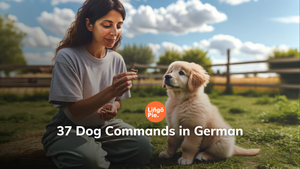
37 Dog Commands in German
Get the secret guide to language learning with tv and music for free, browse posts by popular tags.

17 Hilariously True Must-Knows Before You Travel to Germany
Last Updated: August 12, 2022
*FYI - this post may contain affiliate links, which means we earn a commission at no extra cost to you if you purchase from them. Also, as an Amazon Associate I earn from qualifying purchases. Check out our Privacy Policy and Disclosure. for more info.
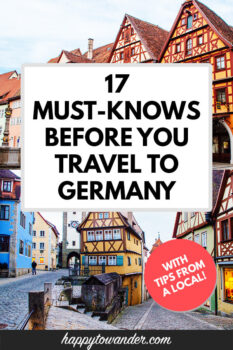
While I love exploring new places, there’s something special about travel in Germany that just gets me.
There’s mindblowing nature next to fairytale towns, big vibrant cities next to mounds of potato and meat 😉 By my accounts, it’s a near-perfect place.
… and that’s why I love it here!
There are certain quirks however that I wish was aware of before I decided to travel in Germany (and um, you know, eventually move there).
Save this post for later on Pinterest:
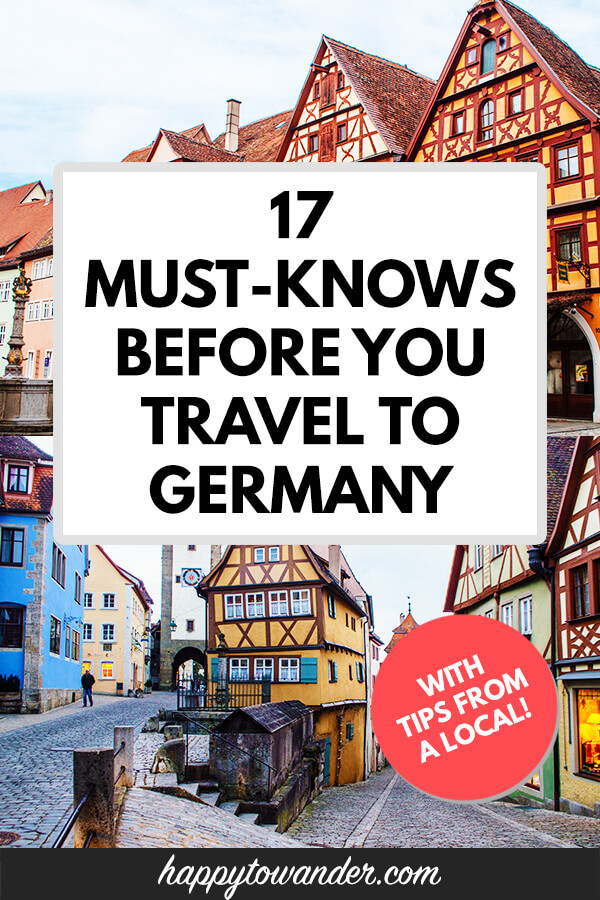
Despite being so similar to North America in many ways, there are radical differences to home that disorient even the most seasoned travellers.
Having learned most of these things the hard way, I’ve decided to valiantly compile my best tips for you – the important things you must keep in mind when you travel to Germany!
PS: I know, I know – Germany is a massive country, and it’s bad to generalize.
Much of my experience has been in Bavaria , where I live, and no, not all these tips will apply everywhere, but I have travelled a fair bit around the country as well and have found that much of this holds true.
Anyways, enough yapping – grab a beer and notepad – it’s time to travel Germany through these 17 important tips!
TIP: If you are still doing research for your trip to Germany, here are some recommendations. I always use Omio to compare/book transport options in Europe. It’s a free site that compares planes, trains and buses all at once and sorts them by price, convenience, etc. Also HotelsCombined offers a similar price check for hotels if you’re still needing a place to stay 🙂
17 Important Must-Knows Before You Travel in Germany
1. it’s all about that cash money, yo.
You might expect Germany, producer of supercars and epic technology to be on board with the whole credit card trend, but this simply isn’t the case.
I know it’s weird, but you’ll find that many places in Germany don’t actually take credit card, even shops in major transit hubs like central train stations.
So, if you plan to frolic/travel Germany for a while, make sure you have plenty of cash on you.
BONUS TIP: Coins are good to have as well. Carry at least some change with you at all times, especially if you have a weak bladder because…
2. Good luck if you wanna pee for free
The chance to travel in Germany is really like a fairytale come true… but sadly one where happily ever after involves paying to urinate.
Free public restrooms are quite rare, which means you’ll usually have to cough up 50 cents or more to pee at train stations, bus stations, shopping malls and even McDonalds (yeah, for real!)
NOTE: Often these places with paid washrooms will give you a little coupon to use on a future purchase, so if you need to go, head to the washroom first before buying your McNuggets.
Even restaurants and clubs aren’t immune to this, so that’s why I say you should bring change with you at all times.
Often washrooms in busy restaurants/clubs/events will have an attendant there who keeps it clean. In these cases, a tip isn’t mandatory, but heavily expected, sooo unless you enjoy getting vicious side-eye, bring some change with you.
3. On Sundays, may the odds be ever in your favour
So I’m not saying that Germany becomes the Hunger Games on Sundays…. but Germany kinda becomes the Hunger Games on Sundays.
In many parts of Germany, Sundays are a day of rest, which means that most shops (supermarkets, retail stores, malls, etc.) will be closed. Many restaurants will still be open, but if you’re hoping to run any errands or do any shopping, plan around the Sunday closures……. or you know, starve. It’s cool.
4. German punctuality is not a joke
Germans are crazy punctual. And for the most part, so is their public transport (at least in Munich, anyway!)
This means you should always get to your bus, tram and train and few minutes early, otherwise it will mercilessly leave without you.
Likewise, when making plans with a German person, don’t expect to get the whole 30 minutes buffer time you get in North America, where you both message “on my way! sorry! traffic is bad!” back and forth until one of you dies. No, a German will be on time. Maybe even ten minutes early.
Do not disappoint the German.
5. I hope you like staring contests
In my experience, Germans seem to really like staring.
Sometimes I like to pretend it’s because I’m a radiant goddess, but then the sensible part of me realizes it’s just a cultural thing.
If you think you’re being judged by that grumpy grandma sneering at you from two seats away, let’s be honest: you probably are.
We even have a special word for the older judgey people – the Oma and Opa-Polizei, (aka the grandma/grandpa police) who are sure to cast shade at you for even the most minuscule of offenses.
One time, an old woman stopped a friend of mine and yelled at him because she didn’t like his lederhosen. It’s just a way of life. Learn to laugh at it and move on. On that note…
6. Keep your voice down, lest you be judged
Germans don’t tend to speak very loudly (unless they’re shrieking folk songs after a few beers).
In fact, public transit is often eerily quiet, and if you don’t keep it down, your English voice will surely pierce through the calm and tear through the entire fabric of German social propriety.
Refer to #6 – people will stare at you, and you will feel awkward.
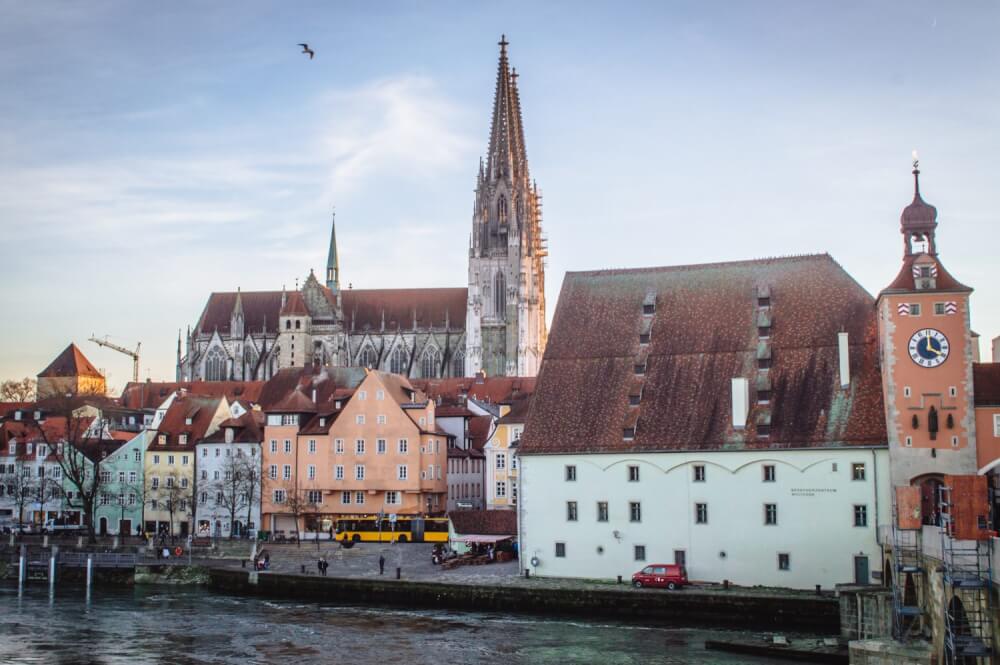
7. You might see some naked people
Ironically, for people who hate small talk and being loud on public transit, Germans are weirdly down with being nude.
Like, you wanna go to the park in the summer time? You will likely see a naked human being.
I mean maybe this is an odd Bavarian thing, but I learned it the hard way.
Once upon a time, I tried to have a peaceful picnic by the river in Munich’s English Garden (one of the world’s largest city parks). Eating my pretzel was difficult as an elderly man ran naked, wild and free across the river from me, periodically bathing himself and flaunting his body like he was Ryan Gosling on steroids.
Anyway, nudity can be common – just prepare yourself.
PS: In many saunas, wellness spas, etc., nudity is not only expected, but mandatory. This is another lesson I learned the hard way. *cringe*

8. When you travel in Germany, look for group discounts on travel/train tickets
If you decide to travel Germany by train, make sure you take advantage of all the amazing discounts!
Germans LOVE rewarding you for having friends, so group tickets will often save you ludicrous amounts of money.
As an example, in Munich a one-way bus ticket is 2.80, whereas a 3 day group ticket for unlimited travel for up to 5 people is less than 30! That’s only 6 euros a person, for 3 days of unlimited joy rides. It’s insane.
Likewise, look into special regional tickets for trains which get cheaper the more friends you bring. In Bavaria, we call this a “Bayern ticket”, but I know other states have them too. For us, you pay 25 euros for the first person, then 7 euros additional for every extra human you get on there, which means huge savings if you get up to 5 (the maximum) on the same ticket. It’s also valid for unlimited train travel within that region, which means Godzilla-sized savings. For more info, you can click here for my full Bayern ticket guide.
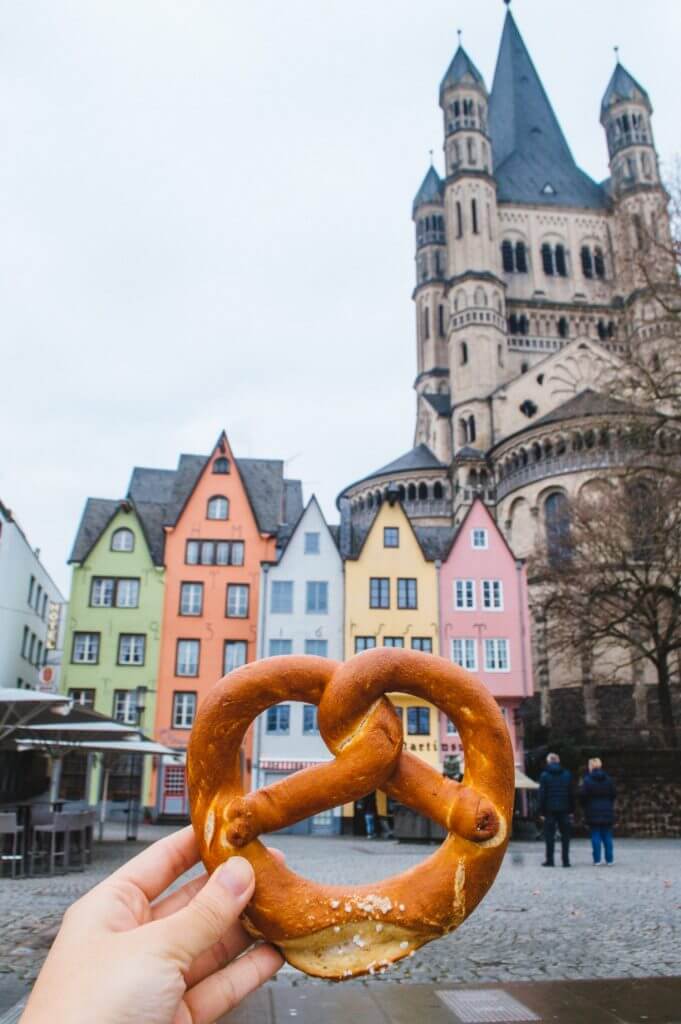
9. Water will cost you, and it’ll probably be fizzy
One of the biggest shocks for North Americans who travel to Germany is that in restaurants, a) water isn’t free and b) fizzy, carbonated water is usually what you get by default.
This thrills me because I would literally carbonate everything if I could, but I know a lot of folks hate fizzy water (ugh, weirdos ).
So, be sure to clarify whether you want still or sparkling. Sadly, there’s not much you can do about paying for it though (unless you have your own sneaky bottle of water with you).
PS: Buying bottled water at the shop will become the most confusing thing in the world (and a significant source of anxiety).
Every brand has their own colour code/name for which water has gas or not.
Some consider “natural” to be with gas, some without, some use blue for fizzy water, others use green…. They even categorize by how fizzy it is (e.g. Medium), and I just about lost it when once, I saw a teal bottle that said “EXTRA STILL” on it. What even is extra still water? How could still water possibly get any still-er? Turns out, it’s a cryptic German code for mildly fizzy water. Nothing is safe, folks. Enjoy your Russian roulette of hydration. [Sorry for the rant, I am just weirdly passionate about this topic]
10. Most people speak English, except (weirdly) where it counts
I always joke with friends that I could stop anyone on the street here in Germany and they would probably speak fluent English, yet as soon as I step into any bureaucratic environment (e.g. to get my visa sorted, to open a bank account, etc.), I’m left flailing in broken German.
Fair enough though – after all, remember that you’re in a foreign country so you shouldn’t expect people to automatically speak your language. That’s why it’s helpful to brush up on some basic German phrases, although you shouldn’t worry too much because there usually at least some fluent English speakers lurking around, especially in big cities like Munich and Berlin.
Craving more fuel for your wanderlust? Connect with me on Instagram for real-time updates, photos and stories!
11. Avoid the bike lane or risk certain death
Biking culture is pretty big here, especially in Munich where I live. Trust me when I say that you have not gotten a real taste of travel in Germany until you’ve stared death in the face while accidentally prancing down a bike lane.
There’s not often a clear division between the path for bikes/for people, and they tend to exist side by side to really shake things up and get you that sweet adrenaline rush. Here’s your best survival tip: check whether or not you’re in the bike lane!
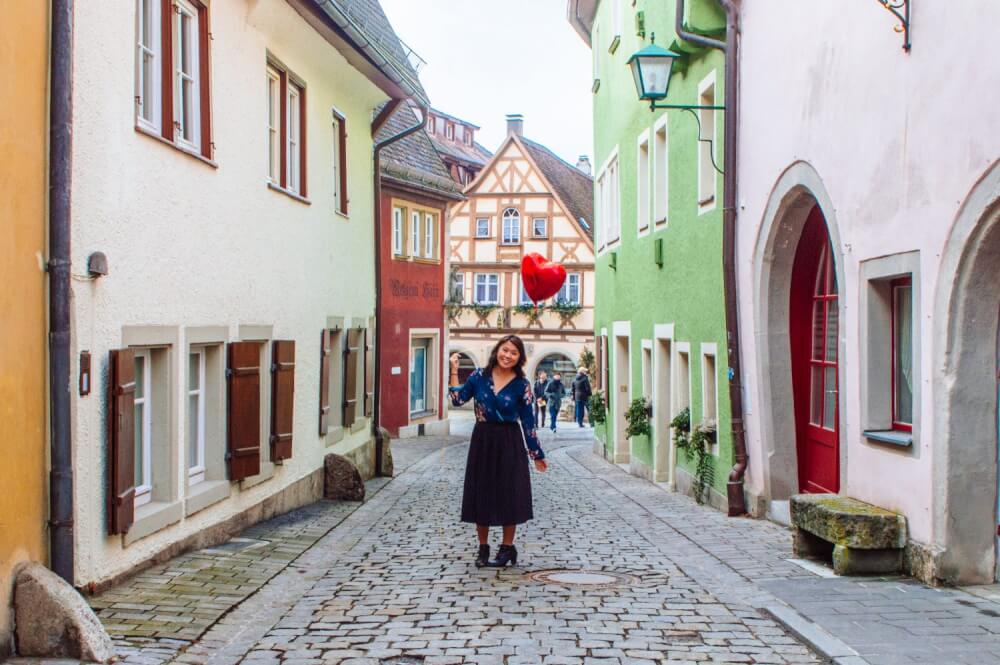
12. Oh yeah, jaywalking is worse than murder
So sure, maybe I’m exaggerating but I have literally never met a group of humans so collectively and vocally against jaywalking.
I once saw a guy in the suburbs who still waited dutifully for the light to change before crossing, despite not a single car or witness in sight (besides me, always a’lurkin).
Especially when there are kids around, parents get super angry at you for setting a bad example (which is fair enough), so it’s better safe than sorry.
There are few things more terrifying than being yelled at by an old German woman from across the street. Well, apart from trying to select the right water at the grocery store that is. Sorry – still not over it.
13. Travelling to Germany is a lot of Pfand
This is a very lame pun that won’t make sense unless you speak German, but Germans are really into recycling and the term “Pfand” essentially refers to a refundable deposit that you pay on things like cans, bottles and even glasses/mugs at beer gardens and Christmas markets.
It functions as an incentive for you to return those items to get your money back. So, in the case of cans/bottles, it encourages recycling and in the case of glasses/mugs, it prevents you from pocketing them as fun souvenirs (though many still do).
This is a really important word to know, because often items will be more expensive than the listed price at the store because of the pfand. So that 1 euro can of Coke might become 1.25 at checkout. Similarly, let’s say you’re at a German Christmas Market for the first time and want to get yourself a nice mulled wine for 3 euros. You might end up paying 5 euros at first, because of the 2 euro pfand on the mug. Extra picky places will even give you a token to return alongside your glassware to get your refund back.
Soooo remember: if your cashier slides you a plastic coin at the beer garden, it’s not some kind of sketch business dealing, it’s just something you must return to get your moola back.
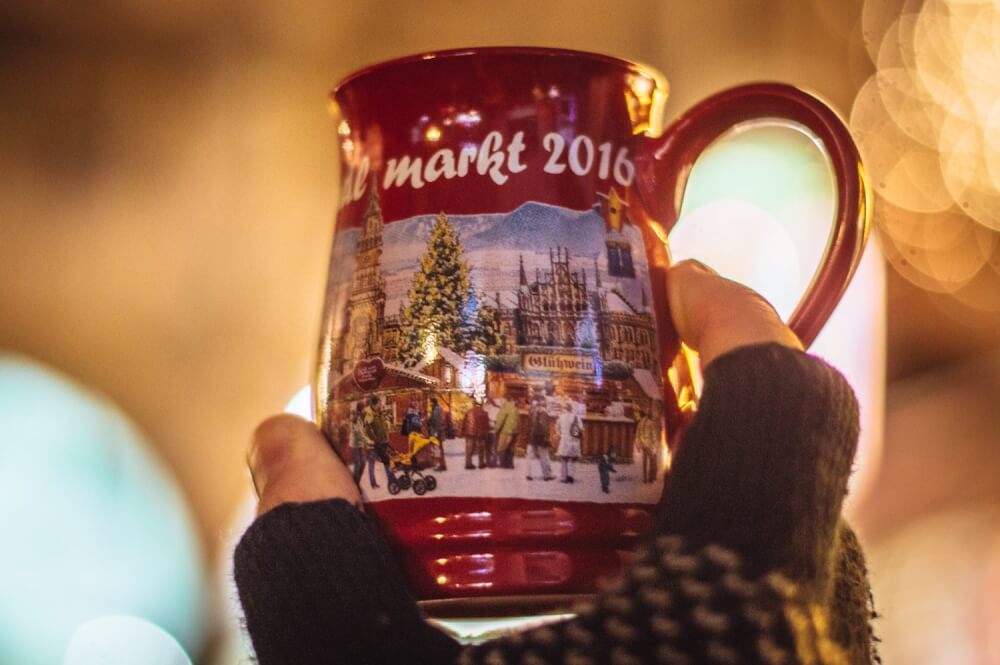
14. Small talk and pleasantries are not a thing
As a Canadian, it’s in my DNA to fill any voids of silence with meaningless chit chat. “It’s a windy day out, eh?” I’ll often murmur, yearning for that sweet human connection as I do.
Germans hate this.
Germans literally do not understand the point of small talk. Often, if you try it, they will be confused at why you are wasting their time and getting all up in their personal space. On that note…
15. Expect customer service to be frostier than a snowman on skis
There are of course exceptions to this, but generally speaking, customer service is not very friendly or warm in Germany. This goes for restaurants, retail shops and yes, official places like banks.
But hey, if you play your cards right and smile sweetly, you might get a vague acknowledgement of your presence in return 😉
Yay, little wins.
So, the next time your waiter ghosts you and doesn’t return for like, 10 years, don’t take it personally – it’s not you!
On that note, tipping is still expected – but not to the crazy extent that we take it to in North America. Generally, rounding up is enough.
16. Good luck at the Grocery Store AKA the freaking Olympic Games
Never in my life did I think I’d need to do warm-up exercises before visiting the grocery store.
… Then I moved to Germany.
I swear the cashiers in Germany are all training for the Olympic Games.
They scan items so absurdly quickly that it’s like a duel every single time. Like, dude – I just wanted some bananas, why are you rushing like your wife has gone into labour?
So, be prepared if you choose to visit the grocery store (which you should, because it helps you save loads of money!!).
Another important thing is to bring your own bag – most people do. There are bags you can buy at the checkout, but remember to pick one up and put it at the front of your item haul, otherwise you’ll be left with a million items from the Usain Bolt of groceries and nowhere to put them.
17. Be ready to giggle at fun words like “fahrt”
German is a different language than English. Duh, yes, hi – Captain Obvious reporting for duty.
BUT, there are some German words that sound just like words we have in English, usually with very different meanings.
Fahrt is one such word.
To complicate matters, it is SO common. You will literally see it everywhere – road signs, transit hubs, everywhere . And while I wish the Germans were simply big fans of flatulence, the truth is the word “fahrt” means a lot of things like trip, drive, way, outing, etc. Feel free to giggle about it though – you’re an adult who can do whatever you want.
Full disclosure: even after 2 years here, I still giggle when the little ticket machine tells me “Gute Fahrt!” after I’ve purchased a ticket. They really are trying to say “Have a good trip!”
PS: “Rathaus” (aka Rat House) means town hall and “schmuck” is actually jewellery. Heh. German is such a fun language.
A post shared by Christina 🇨🇦 happytowander.com (@happytowander) on Oct 17, 2017 at 10:09am PDT
I hope you enjoyed this roundup of must-knows for those who plan to travel in Germany! As always, if you have any more travel in Germany tips, let me know in the comments!
My Go-To Travel Favourites:
🧳 Eagle Creek: My favourite packing cubes
💳 Wise: For FREE travel friendly credit cards
🍯 Airalo: My go-to eSIM
🏨 Booking.com: For searching hotels
📷 Sony A7IV: My (amazing) camera
✈️ Google Flights : For finding flight deals
🌎 WorldNomads: For travel insurance
🎉 GetYourGuide: For booking activities
88 thoughts on “17 Hilariously True Must-Knows Before You Travel to Germany”
You crack me up Christina!!! I actually met a German trauma surgeon working here I. Seattle for a year and I am laughing out loud cuz I witnesssed some of these very things ha! ( no not the nudity )
I am actually thinking of going there to teach .. I am 3/4 German but have so many questions lol … maybe sometime I can email you and ask ?
Thx for sharing this ! Xo Valerie
Sure! I’d be happy to answer any questions you have, but I don’t have a load of experience with regular work visas (I’ve been here on student and youth mobility visas). Happy to chat about the experience of moving here though! And hehe so glad you liked the article!
I loved when shops were closed on a Sunday, they used to be like that in the Netherlands too until a few years ago. I see many similarities to the Netherlands really, great read.
It’s not so bad once you learn how to plan around it, and I totally get why it’s a thing, but I do miss the convenience of shops being open almost all the time hehe. I bet the Netherlands are super similar! Really happy you enjoyed the read 😀 Thanks for stopping by!
Haha, as a European I relate to many things, but I do think it’s funny 🙂 no. 16 is sooo true, but super weird i know 😀
Hahah so glad you could relate 😉 thanks for reading!
I love Germany SO much and loved this post! You captured so many of the great German idiosyncrasies. One other thing my husband and I can’t get enough of in Germany is how everyone always has to get the last word – or “Chuss!” in when we leave a store or a restaurant. If we say “Chuss” back they’ll end it with an “Abend!” It could go on forever! Love it 🙂
Oh my goodness you are SO write! I never realized that. I’m gonna be on a quest to always get the last word now hahah. Thanks for reading!
One of the few blogs that actually makes me laugh out loud! I really love your writing! (Yay you!! :-D) Great blog post and defo a few things I’ll keep in mind when I visit Germany.
oh my gosh you are too sweet! Thank you for appreciating my lame jokes hahah. You rock!
I have been to Germany once. Your tips just added to my knowledge. You’re a good writer, and if you lived my next door I would love to have you over for coffee. PS don’t get nervous your likely the age of my kids. GOOd JOB
Couldn’t agree more with everything! I live in Germany, in fact even Regensburg and I was surprised to see a picture of my beautiful adopted home town!
I LOOVE Regensburg! Naturally I needed a way to fit a photo in hehe. So happy you relate to this! Thanks for reading 🙂
I am a Canadian living in Germany for four years. Been here for two and a half – and agree with every single thing you said! Loved the article!
Hahaha hello from a fellow Canadian living in Germany!!! <3 Thanks for reading and laughing along.
This was very interesting, I had no idea about many of these, except for the naked people thing… I have a friend, he`s German and he loves being naked (he took his clothes off at a wedding party!!!) I had to send him this article… Like “Ahhhh, now I get why you do it!”
Hahaha that’s too funny, and I kinda want to know the story behind that wedding nudity….. 😉 but yes, I find that Europeans as a whole just find nudity a lot less taboo than we do in North America. It’s kinda nice actually – after the initial shock wears off!
I’m a German who’s living in Lima, Peru. When visiting Germany, I simply don’t have the patience anymore to wait for the green light, I’m too used to crossing the street when it’s somehow possible. On the other hand, I still remember my first grocery shopping in Lima. Oh great, just two people in front of me. Well, it would have been faster in Germany with 20 people in front of me ;-). As far as water is concerned, just drink tap water, cheaper and good quality. Punctuality is my most German habit and constantly giving me trouble in South America. I mean, I warn people beforehand that I am punctual and if I’m lucky, they’re just 10 minutes late :-).
Hahaha it’s so cool to hear your perspective! It must be so interesting bouncing between such different cultures. I had a Spanish friend I went to school with here in Munich and his lack of punctuality really drove our instructors insane lol.
I found this post so informative and helpful.
thanks for reading!!
Hahaha! I was laughing all along! The water bit, the jaywalking… it was all just spot on! Amazing article!
hahah yesssss! so happy you liked it 🙂 thanks for reading!
I’m glad Germany takes cash instead, haha, since I like to carry cash with me when I travel! When I went to London I felt like a dinosaur being the only one not paying with a debit card lol! 😛 – Charmaine Ng | Architecture & Lifestyle Blog https://charmainenyw.com
Sometimes I prefer cash too – helps me keep track of my spending haha
I think the naked thing is just much a stereotype as Lederhosen but I guess it does stick out to people that it is legal to go topless to the beach and that we do have coed saunas where everyone is naked. I remember it used to freak my American friends out.
I will send your post to the Deutsche Bahn because when it comes to punctuality they definitely have to catch up (pun fully intended).
Interesting about the stares – I never notices this as compared to countries like India. But as I said on FB I think it might also be a north south divide 🙂
Yeah it’s exactly those things! In North America we can be very prudish when it comes to nudity (being topless at the beach/naked saunas are definitely not a thing), so even those pretty “normal” things stand out to us a lot. And also re: the staring, it could very well be too that you blend in seamlessly whereas we expats/tourists have our ways of sticking out (being loud, speaking English, etc.) Just yesterday, my backpack accidentally grazed the tram ticket machine, which made a tiny sound and then this angry man looked up from his book and stared me down for a solid 5 seconds. It was awkward hahah
Hahahaha – this is so true!! The water thing – not being able to get tap water ANYWHERE drove me up the wall. And one of my colleagues (English) got done by the police for jay walking – now we just check for police before doing it! Oh and I ran into a nude man in my hotel… in the hallway…. gotta love the Germans
No way! I’ve never witnessed anyone actually getting ticketed for jay walking. I bet it wasn’t cheap either! I’ll definitely be more careful now. And LOL I feel like I need more context behind this nude encounter…….
Nicely done! I enjoy your witty writing and especially love the pictures.
Aw thanks so much, Mary!
So I learned some things about myself today. 1. As much as I hate the cold, I will definitely be visiting Germany in the winter so as to avoid the frolicking old naked men. 2. That Christmas mug is adorable and I will definitely steal it.
PS- your photography is so ridiculously gorgeous.
Hahahaa to be fair, it’s not like they’re *everywhere*. You’ll be more likely to see topless women around the parks than wrinkly old men. Maybe I just got lucky 😉 Also YES all the markets have different mugs too and it’s just the best thing. I highly recommend a separate suitcase just for them haha
You made me laugh so hard, Christina! I love this! I lived in Germany for 2 years and I can testify, everything is true!! I love this post.
Your comment makes me so happy!!! Thanks for reading, girl <3
I‘m German. I visited 18 differnt countries for job reasons, from US to Japan. And yes, you are totally right. It really tooks a smile on my face reading your 17 tips. They are so true. Brilliant. We are really a funny kind of peoples here. But wait, someone can easily write 17 funny facts for visiting the US
I would LOVE if somebody wrote that post. Even as a Canadian, there are certain funny things about the US I could write about haha
This is a fun idea for a post. I live in Germany, and what you listed is normal to me by now (still getting used to the staring, though). But I might try one about my passport country, or rather the Midwest. Something to ponder over the holidays… I only recently stumbled across your blog, and I’ll be back to read more.
Aw Beth – thanks so much! really glad you enjoyed it 🙂 One about the Midwest would be great! Let me know if you end up writing it!
Being of German descent and having visited Germany before this article rings so true and made me laugh out loud. I am taking my partner to Germany next year and this article is perfect for him as he is like the quintessential opposite of a German. One point made me want to share a story with you…. My friend and I weren’t aware of the jaywalking law and crossed on the red Ampel Man on a Sunday afternoon in Berlin, there was literally no one around and next thing we know we hear the revs and then screech of a police car mounting the kerb within a foot of our (now soiled) pants! The officer got out screaming at us, all the German I knew flew out the window. Let’s just say he thought it Germanly amusing when we finally muttered “Australien”! I still laugh about this to this day.
Hahaha wow – what a story! Thanks for sharing, Lear <3
I legit laughed out loud! Your righting is fan-freakin-tastic. I am an American who grew up around German culture here and have visited Germany many times so I can totally relate! I did not know about #8 – good to know! And #17… omg driving and you the AUSFARHT signs… I die every time! Thanks so much for sharing. Can’t wait to spend the rest of my day procrastinating real work and reading your blog!
Hey, I’m german and yes, you are so damn right about all those things! Really made me laugh! About speaking english in public offices (town hall, Bürgerbüro…) : Most of these guys there speak english, but they are not allowed to by law…
So glad you enjoyed it, Andrea! That’s really interesting – I had no idea there was a legal reason behind it. I’d love to learn more about why! Do you have a link or anything about the law in question?
I’m an American who’s been living in Munich for 5.5 years and I can say these are ALL true….hilarious. I’d also add to the supermarket olympics section to mind your spot in line so no one cuts in front of you!
Hahaha that’s a good one… some of those omas can be ruthless in getting ahead! Thanks for reading – so happy you liked it!
Great Article. I’m sure my husband will fail at #14 as he talks to everyone when we travel about anything! As for me, I’m just plain loud, so #6 is going to get me lots of stares, LOL As my husband is half German, your list also provided me with insight to his personality, ie #1 he likes paying cash for everything, #4 he has never been late a minute in his life, #7 he loves being naked (but what guy doesn’t). As for #2 we are in trouble…..he pees as if he were in his last month of pregnancy! LOVE your humor….and the article.
Hillarious read, quite entertaining. I loved it. Filled with useful information. I plan to visit Germany in the near future, I’ve been doing research and found your site. Gracias!
Thanks so much for the kind words, Ana! Glad you enjoyed it <3 <3 I hope you have an amazing time in Germany!
Always carry change! My 2 sister in laws and myself were chased out of a bathroom by “Broomhilde” the bathroom attendant. We figured out we only had 1 coin and all needed to pee . We didn’t let the door close and when she realized what we were up to chased us down the street shaking her fist and lecturing. It’s still our best story after 21 years!
I have a great jaywalking-story, as well. When I once crossed the street 3 seconds too early (the traffic lights for cars already switched to red), a police officer drove up to the christmas market I was heading to, jumped out of his car yelling and asked me if I planned to give my parents a dead daughter for christmas – then I had to pay 5 Euros. Haha he was crazy! However, here in NRW, the western part of Germany, people are generally much more friendly open-minded than in e.g. Bavaria!
What a fun read! I am a German, living in Texas with my family for 8 years. My 14 y old daughter often tells me “Don’t stare at the people!” while I am not aware of starring. I am just curious and interested … is that starring? The punctuality is really a thing. People who let us wait are rude because they are wasting our precious time (keeping us from being efficient). When we had our first big party here (Oktoberfest – what else – and I had cooked authentic food from scratch for three days) nobody showed up at the given time. We were totally irritated, double checking the (written!) invitations for time and date, calling some guests if they thought it would be in Oktober (since Oktoberfest is always in September!) etc. . The first guests showed up about 40 minutes late, some came more than an hour late and the most shocking thing: Some left after an hour, telling us that they also have to go to another party … this is like a total no-go in Germany. Well, we learned and adapted … to a certain point. But we are still always on time!
The credit card thing explained: The bank in Germany takes a high fee for credit card transactions. If you buy something for a small amount, it often would cost the store owner more to pay for the transaction than the item you bought. Germans have some sort of debit card which usually comes at a lower fee for the shop owner. But cash is still highly appreciated.
All 100% true, and not only for Munich. I grew up in the North of Germany and it is the same story. Then of course this stuff was normal for me until I moved abroad 😀 hilariously written!
Are the Christmas markets also closed on Sundays? Thank you!
Nope! Of course it depends on the actual market, but most will be open and very, very crowded haha 🙂
Hi Christina You just made my day I read your post and I as laughing sooo many times loud out . I am from Germany live now in the US ( east coast ) since 20+ years and same as you I LOVE TO TRAVEL and see the world. Mostly Asia You are mostly SO RIGHT in your description about Germany.Lucky me I am not from Bavaria but from the NORTH but most of your tips is true for all of Germany Again LOVE LOVE LOVE YOUR POST
Some are really hilarious .Nice Tips for travelers who are planing for germany trip.
Hi Christina, Germany is one of my favourite countries to visit and for many of the reasons above, especially the silence on public transport. And yes, the towns are pretty. My blogging never does them enough justice!
Hillarious read, enjoyed it. Was planning to visit Germany, found your site during my research, learnt quite a lot. Cheers!
Hallo Christina,
I love your post. I am German (from Oldenburg in Loxer Saxony) and have been looking for something exactly like this as I’ll be welcoming a Texan friend in summer time. How cool. I didn’t wanna bore her with my “preparation list” (I wouldn’t even have known how to start it!) and then I found your blog. How cool. Thanks for your brillant descriptions of literally everything a foreigner needs to know about Germany and Germans. 🙂
We Germans are so weird but of course pretty friendly and funny, too. 😉
Have a great time and be safe.
Susanne :-).
thanks for the information
Just moved to Bavaria from the states – reading up on some tips after being here nearly a month. This is super helpful but mostly a hilarious read! I loved reading your take on things! Well written. Thanks for the tips for my German adventures!
I love Germany and have travelled there three times and hopefully will visit again. I feel that the whole Ampelmann thing is peculiar as an American, but also, charming. I saw stores with Ampelmann merchandise in Berlin and in Munich. I also scratch my head over getting assorted wursts…in the U.S., long rolls are used to accommodate the shape… but I’ve only seen round rolls used, especially what we here call Kaiser rolls.
Bravo for the wonderful write up Christina. very helpful. anyone looking for further information about Germany or needs travel documents to Germany can contact this email [email protected]
Christina, my son was stationed in Germany and loved it. He’s been back home in USA for some time longing to go back. He just got notice he has job in Germany and will be moving there with his family soon. My sister and I will go visit him and travel around Europe for first and probably last time (we are 70 +) and your tips are great! I live in Louisiana and it is a very funny state.
ha ha, loved this. So much of it I remember from my German holidays
Love your article! I met my German husband in Austria, and have had 39 happy years! Our grandchildren call us Oma and Opa. You nailed it with the punctuality for sure! Germany is a wonderful country with friendly people. Love Munich, Rothenburg, Berchtesgaden, ….. Enjoy your stay!
Germany is a beautiful country with a Rich cultural heritage and the people here are honest and straight forward, thanks for sharing the travel tips which are of great help to travellers and save them from getting into awkward situations. October is the best time to visit Germany as Oktoberfest the best folk festival is held in this month.
Hi Christina, My husband and I are planning a trip to Munich, then Vienna, Italy and Switzerland in September 2020. I came across your article on “17 Hilariously True Must-Knows Before You Travel to Germany”…loved it. I would also enjoy advise on what to wear on our trip. We’re from Florida, where shorts and t-shirts are the norm. Thank you.
Your Travel Blog is really nice. I love german and culture. maybe I will do to visit one day. I would like to do a marathon run if someone invites me.
I don’t ever comment on blogs but I have quite a bit of experience in Germany and Munich is one of my favorites. Your post made me laugh out loud a couple times. I’m forwarding the link to my husband so he can enjoy it too. Thanks!
I agree with whatever you have mentioned here. I am here in germany for study and I have to change a lot of habits that is mentioned above. Speak in small voice, urinating, puncuality, taking care of cycle lane. Even some older people scold you, this is the most wierd thing. I thing the yonger genration is much better the older are sucking. But you will find good old people who speaks in english and help you. You cracked all the things i n your article. Thanks.
Next year I plan to visit Germany. This will be my first trip. Thanks for the exchange and your advices.
I love these tips! There is just so much to see in Germany! I went last year during the holidays and am dying to go back. There are too many cute towns to see!
Thanks for travelling tips to visit Germany. I will be visiting their very soon and I will probably use your tips and travel recommendation. Much grateful for the information though.
You made me laugh so much! Ah these are so true. Thank you for writing about them in such a hilarious way. It’s been four years since I moved home from Germany and escaped a few of these – and have missed some others. 🙂
Aw thanks for reading and for the kind words, Ava!! Hope you can make it back to Germany again sometime soon to visit haha 🙂
I LOVED this article! I have been living in Munich for about 18 months and all of these were spot on! I definitely laughed out loud when I read the one about the grocery stores. I still get soo stressed trying to bag my stuff! You just never get used to it!
Hey Christina, this very good written! I am actually german and do also live in Munich. I find it very interesting to see the german way of living from another perspektive from time to time 😛 Anyhow i wanted to add something about the jaywalking…(i think that is walking across the street with a red traffic light?) If you are unlucky and the police sees you while doing that it can be very expensive. I got caught once running over the strees a few seconds after the light changed and i had to pay 80€ So i do highly recommend to cross the street far far away from a traffic light (ofc after you made sure that there are no cars that could run you over) or just wait until the light turns green, because sometimes policemen also wait in plain clothes behind the traficlight for someone to cross it while its red… And there is someting else that i wamted to add to your list. I think that almost every household in Germany is a shoes off household. So if you get invited to someones house or appartement, take your shoes off or ask if you should/can leave them on. This could keep you from leaving a rude expression 🙂
Hi Lisa, thanks so much for reading and thanks for sharing your experiences/extra tips! I grew up in a shoes-off household too so it never crossed my mind that this was a cultural difference haha. Definitely a good tip for those who aren’t used to it!
The part about Still water killed me , i literally LOL! every time im in europe i break my head trying to find still water..
Doing research for my book where they visit Germany and this article was so HILARIOUS and helpful, thank you so much for taking the time to make it! <333
A very informative article about the German travel.I really appreciate your research. Thanks for sharing. Hope to read more articles on your blog…!!! Keep it up.
Christina I was laughing the entire time I read your blog thank you for the laughs and information I’m sure I’ll have a great time in Germany!
I AM a German living in Canada since a couple of years now. And what should I say: You are perfectly right with your accurate analysis. I laughed my ass of reading your blog. Thank you.
Great post, I want to thank You for sharing this as it contains a lot of details and it has been very useful.
It is great to know about places, I find such blogs which tell about a country like living, food, places to visit. Like I found a lot in this blog and I enjoyed reading it. I hope you will share such good blogs.
Thank you for sharing your valuable insights and tips on traveling in Germany. Your article is well-written, informative, and packed with useful information that will undoubtedly help anyone planning to visit Germany.
I appreciate the practical tips you’ve provided on topics such as transportation, accommodation, food, and culture. Your personal experiences and anecdotes add a relatable and authentic touch to the article, and I found your advice on interacting with locals and adapting to the local culture particularly helpful.
Your suggestions for off-the-beaten-path destinations and hidden gems in Germany were also a great addition to the article, and I appreciated the detailed descriptions and recommendations for each place.
Leave a Comment Cancel reply
By using this form you agree with the storage and handling of your data by this website. *
Do I need to speak German to visit Germany?

If you’re planning a trip to Germany and wondering whether you need to speak German to visit Germany , you’re in the right place. So let’s get started!
Is it important to speak German to visit Germany?
Germany has a rich history, beautiful landscapes, and a vibrant culture. It is also a popular destination for tourists from all over the world, who come to experience all the country has to offer.
Suppose you are planning a trip to Germany. In that case, you may wonder if it is necessary to speak German to enjoy your visit.
In this article, we will explore this question and provide some tips and resources to help you navigate your trip to Germany, regardless of your language skills.
The importance of speaking German
Speaking German can greatly enhance your experience while visiting Germany. It can help you navigate the country more easily, as many Germans need to speak fluent English and may not be comfortable communicating in other languages.
Being able to speak German can also help you better understand and appreciate the culture of the country. You can access more information about local customs, traditions, and history if you speak the language.
Additionally, speaking German can make it easier for you to communicate with locals, whether shopping, dining out, or just chatting with people you meet.
This can lead to a more authentic and immersive travel experience, as you will be able to engage more deeply with the culture and people of Germany. That being said, speaking German is optional to visit Germany.
Many people visit the country without speaking the language, and many resources and strategies are available to help you communicate and get around without relying on German.
However, if you are interested in fully immersing yourself in the culture and making the most of your trip to Germany, learning at least some basic German before your trip can be very helpful.

Tips for visiting Germany without speaking German
Suppose you plan a trip to Germany and need to speak something other than German. In that case, there are several strategies you can use to help you communicate and navigate the country. These include:
- Communicating in other languages: Many Germans, especially younger people and those in tourism-related industries, speak English, French , or Spanish . If you speak one of these languages, you can communicate with locals and get by without speaking German.
- Using translation apps and other technology: Many translation apps and other tools available can help you communicate in different languages. These can be especially helpful for reading signs, menus, and other written materials.
- Learning basic phrases in German: Even if you are not fluent in German, learning some basic phrases before your trip can be very helpful. This might include greetings, polite expressions, and simple phrases for getting around (e.g., “Where is the bathroom?”, “How much does this cost?”). You can find resources for learning basic German phrases online or using a language-learning app.
- Asking for help: If you are having trouble communicating, don’t hesitate to ask for help. Many Germans are happy to assist tourists, and you may be able to find someone who speaks your language or can communicate using gestures or other means.
Using these strategies and being resourceful, you can still have a great trip to Germany without speaking German.
It may take a little extra effort, but the rewards of experiencing a new culture and connecting with locals can be well worth it.
Resources for learning German
Many resources are available for learning German , both online and in person. Some options include:
Online courses and language learning apps: Some many websites and apps offer German language courses, including Duolingo, Babbel, and Rosetta Stone.
These courses can be self-paced and accessed from anywhere, making them a convenient option for those who are busy or unable to attend in-person classes.
In-person language classes and immersion programs: If you prefer a more structured learning environment, you can find German language classes at schools, universities, and language schools in your area.
There are also immersion programs available that allow you to learn German while living in a German-speaking country, which can be a very effective way to learn the language.
Cultural events and exchange programs: Participating in cultural and exchange programs can be a fun and rewarding way to learn German.
Many cities and towns offer events and activities that allow you to experience German culture and meet people who speak the language.
You can also look for exchange programs that allow you to spend time in a German-speaking country and learn the language through immersion.
Regardless of your chosen resource, it is important to find a method that works for you and stick with it.
Learning a new language takes time and practice, so be patient and stay motivated. With a little dedication, you can learn German and make the most of your trip to Germany.
Final words
It is optional to speak German to visit Germany . However, speaking the language can enhance your experience in the country and help you better understand and appreciate the culture.
Suppose you are interested in learning German before your trip. Many resources are available, including online courses, in-person classes, cultural events and exchange programs. With a little preparation and resourcefulness, you can have a great trip to Germany, regardless of your language skills.
Whether you learn some German or rely on other strategies to communicate, the most important thing is to have an open mind, be respectful of local customs, and embrace the opportunity to experience a new culture.
Related Posts
How to learn italian with the communicative approach.
Unlock the beauty of Italian effortlessly! Discover the Communicative Approach – a dynamic, fun, and effective way to master Italian fast! Introduction Learning a new
French: How to teach on Italki
Why a guide to teaching languages online I’m ready to reveal my small secrets as I transition from providing online instruction to managing my website.
German: Babbel vs Duolingo: differences
Numerous individuals use software and apps to learn new languages. These days, two well-known online resources for language learning include Babbel and Duolingo. They both
Languages: Babbel vs Duolingo: differences
In today’s post, we’ll talk about the differences between Babbel and Duolingo. These are unquestionably the two most well-known language learning programs out there. Let’s
Spanish for “nights”: words and examples
There are several terms and idioms in Spanish that refer to the night, each with its unique sense and function. In Spanish, the most basic
How to say no in Spanish: 15 different ways
Learn 15 different ways to say “no” in Spanish and understand their appropriate usage. Improve your communication skills and broaden your vocabulary. As we go
How to maximize your time in learning French: Tips and strategies for success
Efficiently learn French with expert tips and strategies! Discover how to maximize your time and achieve success in your language journey. Start mastering French today!
How do you say “bon appetit” in Spanish?
Savor the flavors of Spanish cuisine with the proper greeting “Buen Provecho” when dining. Say “Bon Appétit” in Spanish and impress your friends! Bon appetit
German Lifestyle vs American Lifestyle: How to Adapt to German Lifestyle
Discover the intriguing clash of German and American lifestyles and learn essential tips for seamlessly adapting to the distinctive German way of life. As our
7 Common Myths of Learning the German Language
Discover the truth behind learning German as we debunk 7 common myths. From grammar fears to accent hurdles, prepare to unravel the language’s secrets. Over
Top 20 Spanish words used in sports
Discover the top 20 Spanish words commonly used in the world of sports. Enhance your sports vocabulary and understanding with our informative blog. Introduction The
French Phrases You Need in Workplace
Mastering French phrases in the workplace is essential for effective communication. This blog explores key phrases to navigate the professional world en français. I. Introduction
Sea in French: How to say Sea in Italian
Discover the Italian translation for “sea” with our guide. Learn how to pronounce and use this common word in the beautiful Italian language. The sea
11 Must-Know German Gardening Vocabulary Words for Green Thumbs
Master the German gardening jargon with our essential guide! Explore 11 must-know vocabulary words to level up your green thumb skills. If you’re passionate about
10 Must-Know Spanish Gardening Vocabulary Words for Green Thumbs
Expand your green thumb with these 10 essential Spanish gardening vocabulary words. Master the language of plants and enhance your gardening skills. 10 Essential Spanish
12 Must-Know French Gardening Vocabulary Words for Green Thumbs
Enhance your green thumb with our blog! Discover 12 essential French gardening terms to elevate your gardening skills and knowledge. Bonjour! As the warm weather
Spanish adverbials: Mientras…
The word Mientras can be an adverb or conjunction depending on the sentence and its structure. You can use mientras to connect two actions in
Spanish imperative negative + pronouns
The Spanish structure imperativo negativo + pronombres enclíticos is a bit controversial topic since many Spanish students get confused when using it. Los pronombres enclíticos
French Restaurant Phrases for Ordering Food and Drinks with Ease
Je voudrais un verre d’eau, s’il vous plaît. (I would like a glass of water, please.) Pouvez-vous m’apporter le menu, s’il vous plaît? (Can you
Say It Like a Native Speaker: 7 French Sayings You Should Know
Sayings or proverbs have a very important role in any culture and language, and the French language is no exception. They provide people with insight
Avoid vocabulary mistakes about false cognates in french
False cognates, also known as “faux amis“, are words that are similar in French and in English but ultimately, they have completely different meanings. When
Why is it important to respect French grammatical gender?
The grammatical gender is a system of classification in the French language that assigns a gender to nouns and adjectives. This plays a very important
7 Common Myths of Learning the French Language
Unveiling the Truth: Debunking 7 Common Myths of Learning the French Language. Separate fact from fiction in your language journey! 7 Most Popular Myths about
7 Myths About Learning Spanish
Unveiling the truth behind learning Spanish! Discover and debunk the 7 common myths that may be holding you back from mastering this vibrant language. Are
Spanish Lifestyle vs American Lifestyle: How to Adapt with Spanish Lifestyle
Discover the vibrant Spanish lifestyle and learn how to seamlessly adapt to it, contrasting it with the American way of life. Join us on this
French Lifestyle vs American Lifestyle: How to Adapt to French Lifestyle
Know more about the French lifestyle vs the American lifestyle. Which do you think is better for you? Embrace culture, cuisine, and joie de vivre!
Famous French Food You Must Try
Indulge in the flavors of France with our guide to famous French food. Discover must-try dishes like escargots, coq au vin, and crème brûlée. Bon
Famous French Singers You Must Know
Discover the iconic voices that have made French music famous worldwide. Our list of famous French singers features timeless classics and modern hits. French singers
Famous Spanish Food You Must Try
Embark on a delectable journey through Spain’s culinary wonders! Discover the must-try famous Spanish dishes that will tantalize your taste buds. Spanish Food Spain is
Famous German Singers You Must Know
Get ready to immerse yourself in the enchanting world of German music as we showcase the extraordinary talents of renowned singers from Germany. From timeless
Famous Spanish Singers You Must Know
Let the music captivate your senses and ignite your passion for Spanish culture by knowing the famous Spanish singers that ever existed. Importance of Spanish
German Phrases You Need in the Workplace
Discover essential German phrases for the workplace. From greetings to professional conversations, equip yourself with the necessary language skills. German Phrases in the Workplace Learning
Spanish Phrases You Need in Workplace
Master the essential Spanish phrases for the workplace and enhance your communication skills. From greetings to professional requests, we’ve got you covered! Spanish Words in
Top Spanish Speaking Countries
Explore the vibrant cultures and diverse landscapes of the top Spanish-speaking countries in this blog. Discover their history, traditions, and more! Explanation of the importance
Top 20 German Words Used in Sports
Discover the top 20 German words commonly used in sports, from ‘Tor’ to ‘Abseits’. Enhance your sports vocabulary and impress your German-speaking friends! Introduction Explanation
Top 20 French Words Used in Sports
Discover the Top 20 French words used in sports! From “but” to “arbitre,” learn essential vocab to help you better understand the sports world in
How to Say “Food” in Spanish
“Learn the different ways to say ‘food’ in Spanish and expand your vocabulary with our comprehensive guide. Enhance your language skills today!” One of the
How to Say “Food” in French
Learn the various ways to say “food” in French with this comprehensive guide. Expand your vocabulary and impress your francophone friends! “Food” in French: La
How to Say “Food” in German
Learn how to say ‘food’ in German and impress your friends with your language skills! Check out our easy guide and enhance your vocabulary today.
Famous places in France: Where to go in France
Discover the most famous places in France with our guide to the famous places you can’t miss. Plan your trip today! France is well-known for
Top French Slang Words Used in Everyday Life
Discover the most popular French slang words and expressions that French natives use in everyday conversations. Improve your language skills and sound like a local!
Famous Places in Spain: Where to Go in Spain
Discover the most famous places in Spain and plan your next trip. From the iconic cities of Madrid and Barcelona to the stunning beaches of
Communication Skills in a Foreign Language: Achieve Fluency by Solving Tasks
Improve your communication skills in a foreign language by solving tasks. Our blog offers practical tips and strategies to achieve fluency. Start now! Mastering Communication
Top German Slang Words Used in Everyday Life
Discover the top German slang words used in everyday life with our comprehensive guide. Impress your friends and sound like a native speaker! Top German
Famous Places in Germany: Where to Go in Germany
Explore the must-visit famous places in Germany! Discover the top destinations and attractions to add to your itinerary for an unforgettable trip. Germany is a
Top German-Speaking Countries that You Must Know
Discover the top German-speaking countries to visit and explore their rich culture, stunning landscapes, and unique attractions. Start your adventure today! Over 130 million people
Top French Speaking Countries that You Must Know
Discover the top French-speaking countries around the world, their culture, traditions, and why learning French is beneficial. Start your journey today! French Speaking Countries French
How Useful German lessons on YouTube can benefit students
Discover how German lessons on YouTube can empower students with practical language skills, cultural insights, and engaging learning experiences. Boost your German fluency today! Would
How to Maximize Your Time in Learning Spanish
Unlock the secrets to mastering Spanish efficiently! Learn how to maximize your time in learning Spanish. Start your language-learning journey now! Learning a new
Language Learning for Communication: Acquisition is Best
Discover why acquiring Spanish language skills through communication is the most effective approach. Enhance your learning journey with our expert tips. The importance of Spanish
How Useful French Lessons on YouTube to Students
Discover the power of French lessons on YouTube for students! Learn language skills with engaging videos, practice exercises, and interactive lessons. Boost your learning and
Top Spanish Slang Words Used in Everyday Life
Discover the most popular Spanish slang words and phrases used in everyday life! Improve your language skills and sound like a native speaker. Learning Spanish
Communication skills in a foreign language: Achieve fluency by solving tasks
Improve your ability to communicate in a foreign language by solving tasks. This blog helps you work through problems that improve your accuracy and confidence.
Top 7 Reasons for learning French
Parlez-vous Français? Explore the top 7 reasons for learning French and unlock a world of opportunities. Start your language journey with confidence today! 7 reasons
Top 7 Reasons for Learning German
Discover the power of learning German! Unlock opportunities and expand your horizons with compelling reasons to study German. Start your linguistic journey today! Reasons for
Top 9 Reasons for learning Spanish
Is learning Spanish worth it? What are the top reasons for learning the Spanish language? Start your Spanish journey now! Reasons why learning Spanish is worth
How to learn Spanish through Podcasts
Do you want to learn Spanish through podcasts? Immerse yourself in the richness of the Spanish language with our podcast-based learning guide. Learn Spanish through
How to learn Languages through Podcasts
Unlock the power of language learning with podcasts! Explore the ultimate guide to mastering a new language through engaging podcasts. Start your linguistic journey now!
How to Maximize Your Time in Learning German
Learn German efficiently with expert tips! Discover effective techniques on how to maximize your time in learning German. Tips and strategies for efficiently learning German
How to learn French through Podcasts
Unlock the beauty of the French language with our podcast-based learning approach. Master French effortlessly with engaging lessons and practical tips! The Power of Podcasts
How to Learn German through Podcasts
Master German with ease! Explore the ultimate guide to learning German through podcasts. Gain language skills, cultural insights, and fluency. Start your German journey now!
How useful Spanish Lessons on YouTube can Benefit Students
Discover the power of Spanish lessons on YouTube for students! Boost language skills with engaging videos. Learn Spanish anytime, anywhere. ¡Vamos! Learning a new language
How hard is it to learn German?
How hard is it to learn German? Our comprehensive guide provides insights into the challenges and strategies to master the language. How hard is it
How hard is it to learn French?
Discover how difficult it is to learn French in our latest blog post, “Parlez-Vous Français?”. Gain insights and tips to improve your French skills. Parlez-vous
5 ways to say “excuse me” in Spanish and be a polite bilingual
Master the art of politeness with this blog on 5 ways to say “excuse me” in Spanish. Impress native speakers and boost your bilingual skills
Every meaning of Fare | German verbs and how to use them
Unlock the full potential of the German verb “fare” with this comprehensive guide! Learn all its meanings and how to use them in context. Check
How to Curse in French | 12 Most Popular Swear Words
You must have noticed by now that the French have a reputation for swearing a lot. If you are learning French, it’s a good idea
5 ways to say “excuse me” in French and be a polite bilingual
Learn how to say “excuse me” in five different ways in French and impress native speakers with your bilingual skills. Be polite and confident! Excuse
How to say in German
Looking to learn how to say common phrases in German? Check out this blog for tips and tricks on how to speak the language like
French Nasal Vowel /õ/ | Possible Spellings with Examples
The French language is renowned for its multiple nasal vowels, making it a challenging feat for non-native speakers to perfect. One sound that often trips
18 useful Spanish colloquial words and expressions
Spanish is a beautiful and expressive language, full of rich idiomatic expressions that can add flavor and humor to any conversation. If you’re learning Spanish,
French Preposition Dans | Usage and Meaning
Are you struggling with the usage of the French preposition “dans”? It can be confusing to determine when to use “dans” compared to other prepositions
7 ways to say “excuse me” in German and be a polite bilingual
In this blog, you’ll learn seven different ways to say “excuse me” in German, so you can be a polite bilingual and impress native speakers.
Chic Parisian Style: How to Dress when in Paris?
Excited about an upcoming trip to Paris, but not sure what to wear? Paris, the city of lights and fashion, is heaven for those who
French Nasal Vowel ɛ̃: Possible Spellings with Examples
One sound that often trips up learners is the nasal vowel ɛ̃, which is found in words like “temps” and “enfants”. In this blog post,
French Nasal Vowel ɑ̃: Possible Spellings with Examples
One sound that often trips up learners is the nasal vowel ɑ̃, which is found in words like “temps” and “champagne”. In this blog post,
What’s the meaning of “allons-y!”? A common French exclamation
Explore the meaning and cultural significance of “Allons-y!” in the French language. Discover its different uses and learn to use it correctly in conversation. What’s
Every meaning of “Fare” | Spanish verbs and how to use them
Discover the various meanings of ‘Fare’ in Spanish verbs and learn how to use them effectively. Expand your language skills with our comprehensive guide. Narrowing
Every meaning of Faire | French verbs and how to use them
Learn the various meanings of “faire” in French with this comprehensive guide. Master the verb’s usage in different contexts and improve your fluency. Meaning of
What’s the meaning of “¡vamos!”? A common Spanish exclamation
Discover the meaning and uses of “¡Vamos!” in the Spanish language. Learn about its cultural significance and how to use it correctly in conversation. What’s
Daring you to Pronounce the Most Difficult French Words
Ready to tackle some of the most notoriously difficult French words to pronounce? It’s time to flex those linguistic muscles and push your pronunciation skills
French Prepostion Chez: At someone’s place
One of the trickiest aspects of the language can be mastering French prepositions. The French preposition chez is used to indicate that someone is “at”
Enchaînement: Connecting French Sounds
As a French speaker, using enchaînement in French is key to achieving a natural and fluent French. Enchaînement is the glue that binds the sounds
How to Pronounce Luxury Brands in French?
Are you a fashion enthusiast struggling to correctly pronounce luxury brand names in French? Look no further! In this French pronunciation guide for luxury brands,
Understanding French Liaison: The Key to Fluent Speaking
Do you want to sound like a native French speaker? Then you need to master the French art of liaison. What is it? Simply put,
Silent French H: Mute and Aspirated
The silent letter h is often causing trouble to French learners. In this blog post, we’ll take a closer look at the “h” mute and
Learn How to Stress French Words Correctly
Are you ready to learn the key to speaking like a native French? Correctly stressing French words is an important aspect of speaking French accurately
What Not to Pronounce in French? Silent Letters
The most challenging aspect of learning French is spelling words with silent letters. You know you’ve nailed your French accent once you can tell which
Understanding the French Pronunciation Using IPA
Are you struggling with French pronunciation? When it comes to vowels, do you often struggle with the many nuances of French? What if I told
Diphtongs in French: Pronunciation and Spelling
Are you looking to improve your French pronunciation? To help you learn French diphthongs, we’ll discuss their pronunciation, spelling, and examples in this blog post.
Nasal Vowels in French: Pronunciation and Spelling
Are you struggling with the pronunciation of French nasal vowels? From the different spelling patterns to the complex sounds they produce, understanding nasal vowels can
French Vowels for Beginners: Everything You Need to Know
Vowels in French are notoriously difficult for English speakers because they differ greatly from those in other languages. This guide will teach you everything you
Faire la Bise: All about French Kiss
If you’re wondering how to greet in French, either through handshakes or kisses, you are at the right place. Today, you’ll learn how to navigate
Speaking practice: talk to yourself
Improve your speaking skills with these simple tips on how to practice speaking by talking to yourself. Start speaking confidently today! Read more here. Speaking
Spaced repetition for the German language
Master German faster with spaced repetition! Our blog explains how this powerful technique works and offers tips to incorporate it into your learning routine. What
French Art of Subtle Communication: How to Sound Polite?
Understanding the nuances of French communication can be challenging, but it’s essential to understand that the French place politeness standards are pretty high. From the
What does TE AMO mean in Spanish?
Discover the romantic meaning behind Te Amo, the Spanish phrase for ‘I love you’. Explore its cultural significance and usage in everyday life. Te Amo
What are the 10 most spoken languages in the world?
Discover the top 10 most spoken languages in the world with our informative blog. Learn about their origins, unique features, and cultural significance. The most
What does JE T’AIME mean in French?
Discover the meaning and cultural significance of “Je t’aime,” the famous French expression for “I love you.” Explore its nuances and usage in this blog.
Think Languages LLC
1309 Coffeen Ave, Suite 1200, Sheridan WY, USA, 82801
+1 917 9937880
Key things to know before you go to Germany
Jul 30, 2023 • 6 min read

Find out how to blend in like a local in Germany with this guide to what you need to know before you go © TommL / Getty Images
Germany is the world’s fourth-biggest economy, has a history that’ll take you a lifetime to unpack, a capital city that seems to be crawling into the future and a population of more than 80 million people, almost one-fifth of whom have an immigrant background – that makes it almost impossible to form any generalisations about a singular Germany. Instead, expect a country full of bewildering contradictions, quirky social norms and, in the capital especially, stereotypes turned on their head.

1. Get around on two wheels
Bike riding is a beloved mode of transportation in Germany, and there are many dedicated bike lanes in cities and along popular cycling routes in regional areas. Bike-sharing schemes are common, and in some cities you might even find shared cargo bikes – a popular way to get around with kids. Always err on the side of caution and lock your bike whenever you leave it unattended (especially in Berlin ). Motorists are generally aware and cautious of cyclists, though you should always remain alert and many people in urban areas wear a helmet (though it is not required by law).
Things are set to get even better for two-wheeled commuters, with the implementation of the federal government’s National Cycling Plan 3.0 , which aims to double the number of cyclists on the roads by 2030. Cycling infrastructure will be improved, extended and made safer – and help to cut carbon emissions.
2. Book train tickets in advance – and always reserve a seat
Traveling around Germany is relatively quick and easy if you take the high-speed ICE trains run by the Deutsche Bahn. Tickets can be expensive, especially for last-minute travel and over major holidays, but the trains are comfortable and generally arrive on time. It’s almost always worth paying extra to reserve a seat, otherwise you could find yourself sitting on the floor in the bike storage carriage for the duration of your journey. That, or drinking a beer in the onboard restaurant.
If you’re traveling with kids, try to reserve seats in the Familienbereich (family area) to save yourself sideways stares for if – or when – your kids go wild or lose their cool. The Kleinkindbereich is a closed compartment suitable for those traveling with babies and toddlers – it even has a carpeted space to crawl around!
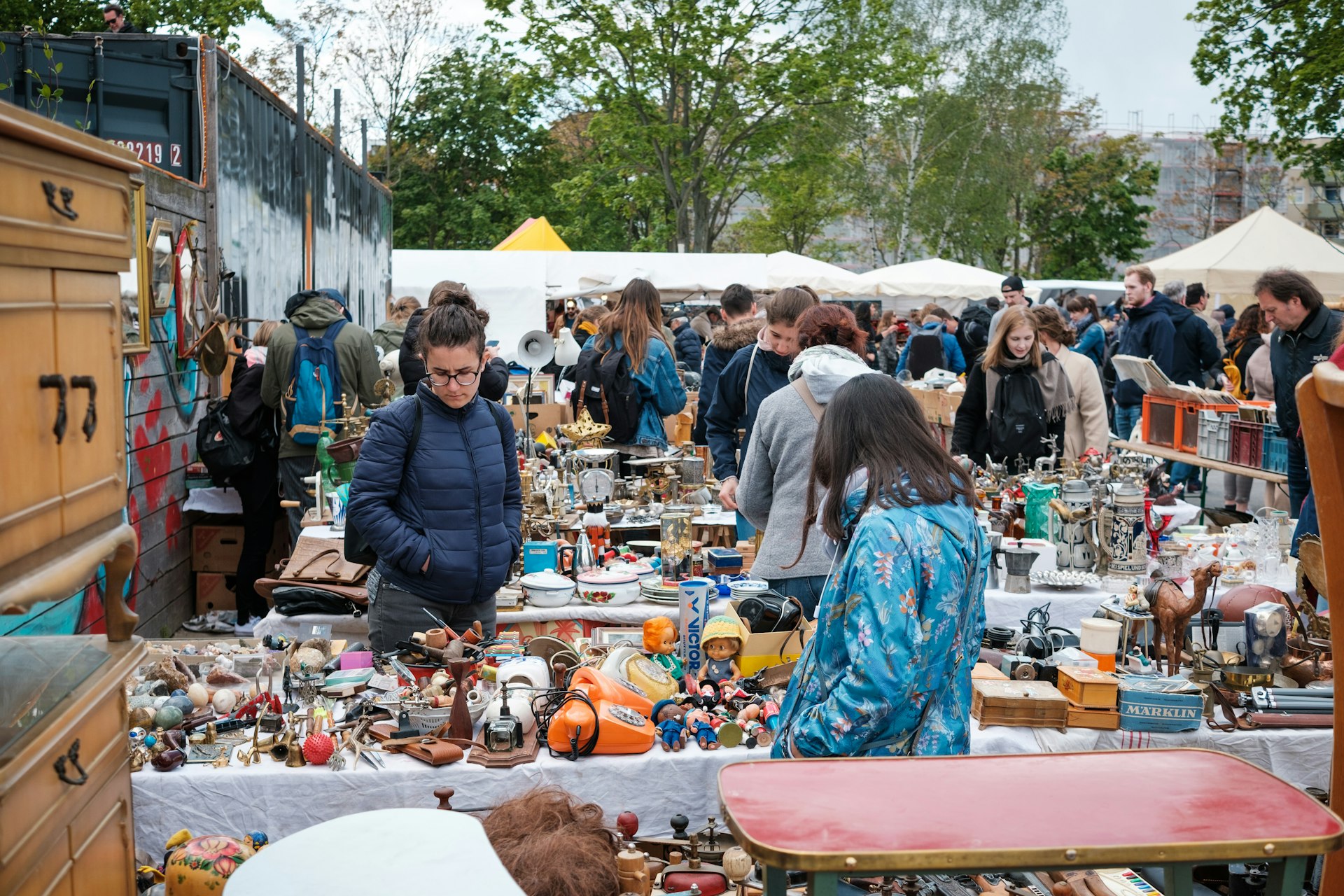
3. Forget about shopping on a Sunday
Shopping is generally a no-no on Sundays, when supermarkets and retail outlets are closed in accordance with the law. If you’re in desperate need of something, your best bet is to head to a major train or bus station where there might be a supermarket and Apotheke (pharmacy) open. Otherwise, almost everything else runs as usual – museums, tourist attractions, bakeries, cafes etc – including Spätis (small convenience stores) but with limited opening hours. Locals, instead, spend their Sundays indulging in simple pleasures like hanging out in the park, hiking, trawling flea markets, and going out for coffee and cake. In Berlin, it’s also a popular day to go clubbing.
4. Always carry cash in Germany
It remains surprisingly true: Germans prefer cash – even in the country’s capital – and it will make things infinitely easier if you carry some on you at all times – including coins for public toilets (which are rarely free). Many smaller cafes, bakeries and bars don’t accept card payments at all, but this is generally clearly stated at the door – or communicated once you’ve pulled out your card/phone to pay.
Things are changing, however, especially since the Covid-19 pandemic, and you will find card payment, as well as other cashless payment methods, available in far more places than you might have just a year or two ago. Indeed, there are now some places that don’t take cash at all.
5. Can I speak English in Germany?
German is the official language and it is spoken by the vast majority of the population. English is the next most common language and it is widely spoken, especially in cities such as Berlin, Munich, Düsseldorf and Frankfurt, though less so in regional areas. That said, you may receive looks of bewilderment if you enter a shop or cafe and address staff in English without first attempting a few words in German.
It’s definitely worth practising at least a few words and simple phrases to make your trip a little easier – Danke (thank you), Bitte (please), Entschuldigung (excuse me) and Tschüß (goodbye) are a good start. But the German language can be unforgiving to beginners, and many German speakers will switch immediately to English at even a hint of a foreign accent. Easy German has some excellent YouTube tutorials as well as insightful videos about life in Berlin and Germany.

6. Drinking on the street is nicht verboten
Drinking in public spaces in Germany is nicht verboten (not forbidden). There’s nothing to stop you from buying a beer from the Späti to drink while sitting on the street or in a public space such as a park. This is fairly common, socially acceptable behavior, especially at the end of the day, and there’s no need to hide your bottle in a paper bag.
Public drunkenness, on the other hand, and even public loudness, will quickly mark you as an outsider. Go easy and, if you’re drinking beer, check the alcohol content before swilling away – it might be higher than what you’re used to and drinking 0.5L bottles (the norm) can catch up with you.
When you’ve finished your beer (or almost any other bottled drink), never put the empty bottle in the bin or recycling – leave it, instead, in a discrete spot (such as next to a bin) and someone will eventually come along and collect it for the Pfand (deposit refund).
7. Are people friendly in Germany?
Small talk, pleasantries and welcoming smiles aren’t the most typical German way, and customer service can leave those used to more easy-going, chatty interactions feeling rather cold.
On top of that, many German locals won’t think twice about firmly redirecting you (sometimes harshly so) – say, if you walk in the cycle lane (which can sometimes be difficult to differentiate from the footpath), ride your bike on a footpath, walk against a red Ampelmann (pedestrian light), or take too long packing your groceries at the supermarket (yes, really!).
Berliners, in particular, are renowned for their lack of social niceties, epitomized by the Berliner Schnauze , the gruff attitude adopted by some locals. The Berliner Ausländer Memes Instagram account provides a good introduction to the curious ways of Berlin life and might provide a soothing sense of camaraderie with other baffled foreigners.
It sounds tiresome, but if you ignore any perceived hostilities and carry on with your business, you are likely to find that the majority of German locals are kind and helpful – if not always outwardly friendly.
Explore related stories
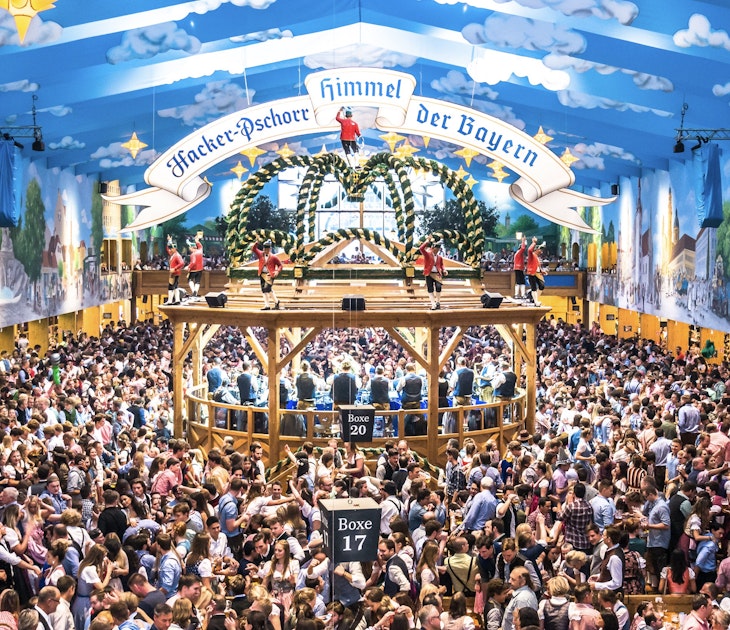
Feb 23, 2024 • 5 min read
As you plan your big trip to Germany this year, don’t sleep our our list of the the top places for scenery, culture, history and (yes) beer.

Jan 30, 2024 • 17 min read

Dec 19, 2023 • 6 min read

Nov 11, 2023 • 8 min read

Sep 29, 2023 • 7 min read

Aug 16, 2023 • 5 min read

Jul 28, 2023 • 3 min read

Jul 14, 2023 • 7 min read

Jul 9, 2023 • 7 min read

Jul 3, 2023 • 3 min read
LearnGermanOnline.org
Choose from dozens of free online resources for german learners.

German Language for Travellers: Learn German Travel Phrases
Last updated on February 17, 2023
If you are planning a short holiday stay or a business trip to Germany you do not need to learn any German as most people you are going to meet will speak some English anyway. But, it will not hurt if you learn some basic German phrases, such as greetings, just to sound nice. However, if you are traveling to Germany or any other German-speaking country more often, learning a few essential German travel phrases and expressions may help you get along in situations when there are no English speakers around. Below you will find an overview of free Internet resources that largely focus on German for travellers.
German for Tourists on YouTube
- German Phrases for Travelers is a 20 min video that will teach you the very basics of the German language that any foreigner travelling around Germany will find useful.
- Basic German Travel Phrases from expertvillage is a collection of fourteen youtube videos that will not only teach you essential German travel phrases like those used when greeting people, asking for directions, travelling through airports, seeking accommodation, ordering in a restaurant, renting a car or expressions used in emergency situations, but will also give you a couple of useful travel tips on must-see German locations for foreign visitors.
Interactive Online Courses for Travellers to Germany
- LingoHut offers a free German course suitable for tourists as most of their 109 lessons focus on travel topics such as understanding directions, airport and hotel conversations, moving around town, sightseeing, shopping, ordering food at a restaurant, etc. You will learn basic vocabulary and phrases related to each topic. Each lesson includes vocabulary training, flashcards, and matching, tic-tac-toe and concentration games as well as a listening game.
- Goethe Verlag has prepared a German course for beginners as part of their series called 50 languages. This course contains many lessons that frequent travellers to German-speaking countries may find useful. In the first 80 or so lessons you will learn basic German phrases related to the most common conversational topics whereas the remaining lessons provide examples of sentences illustrating the use of German grammar (this part may be difficult to understand without further explanation, though). You can access this course online for free, download all of its 100 lessons as mp3 files or try it on your mobile device. However, only the first 30 lessons are free in the mobile application. Complete course for portable devices will cost you $2.99.
German for Travellers on Mobile Apps
- Bravolol is a mobile application for foreign visitors to Germany who wish to learn some basic German phrases and vocabulary most frequently used when traveling around. You will be listening to the speaking parrot and repeating the phrases and expressions you heard. Whenever needed you can search for phrases by keywords. This app can also be used offline. The basic version is free but the full version will cost you $4.99.
German Travel Phrases on PDFs
- German for Confident Travel is a free downloadable German travel phrasebook in the PDF format. It contains hundreds of German phrases with English translations and explanations on when to use each phrase. This phrasebook also provides pronunciation guidance for English speakers. The main focus is on travel-related topics such as greetings, food, accommodation, shopping, transportation and socializing.
Social Platforms for Travellers
- PolyglotClub is a social platform where people can find conversation partners in foreign countries who are native speakers in the language they are trying to learn. However, this platform is also used by travellers who wish to connect with natives in the country they are planning to visit. They can ask them all sorts of questions about their country, language and culture to become more familiar with the place before they leave on a trip. Likewise, travellers can ask their language exchange partners before they go on a trip to teach them correct vocabulary to be able to take a taxi, check at a hotel, ask for directions or order meals and drinks at a restaurant.
- Interpals brings together people from all over the world who are learning foreign languages and/or are looking for travel buddies abroad that will show them around when visiting their town. Although this platform is not specifically designed for teaching travel phrases, it is very likely that these will be some of the first expressions you will learn before and during your visit to another country.
Other Great German Learning Resources for Travelers
Also, do not forget to check out our section on German beginner courses where you will certainly find additional lessons that teach vocabulary and phrases you can use on your next trip to Germany or any other German-speaking country. Alternatively, for making friends in foreign countries who can help you learn their native language and introduce you to their culture see the list of free language exchanges . Your German language exchange partner will not only help you learn some basic German travel phrases but may also want to meet you in person and show you around their town next time you are visiting Germany.
Travel German FAQs
‘Ja’ (yaa) and ‘Nein’ (nain).
The first words you may want to learn before your trip to Germany should include: ‘Ja’ (yes) and ‘Nein’ (no), greetings such as ‘Hallo’ (hello), ‘Guten Tag’ (good day), ‘Auf Wiedersehen’ (good bye) and a couple of words to sound polite such as ‘Bitte’ (please), ‘Danke’ (thank you), ‘Entschuldigung’ (sorry, though many Germans also say sorry) and ‘Gesundheit’ (bless you).
‘Bitte’ is one of the most frequent words you will hear when visiting Germany and usually means ‘please’ or ‘yes, please’. As an interjection it can also translate as ‘you are welcome’, ‘here you go’ or ‘go ahead’. ‘Die Bitte’ is also a noun meaning a ‘plea’, ‘request’ or an ‘appeal’.
‘Bitte schön’ are actually two words used most often as a polite response to someone saying ‘Danke schön’ or ‘Danke sehr’ (i.e., different ways of saying thank you such as ‘many thanks’ or ‘thanks a lot’) and it means ‘you are welcome’, ‘my pleasure’ or ‘not at all’.
The most common casual German greetings are ‘Grüß dich!’ and ‘Hallo!’.
The German word for tip is ‘Trinkgeld’ which literally means ‘drink money’, suggesting that you usually tip the waiter. It is a kind of gratuity, not a service charge. Hence, if you were happy with the service, you round up the bill by adding up to 10% extra. But, if you were not satisfied, there is absolutely no reason to leave a tip.
You may hear people say ‘gerne’ quite often while travelling in Germany, especially as a response to saying ‘thank you’ to them. It is a polite expression that translates as ‘gladly’ or ‘with pleasure’, meaning that the person enjoyed helping you.

3 Weeks in Germany Itinerary
DISCLAIMER: This post might have links to travel services and products that we enjoy. We might make a commission from it at no extra cost to you.
Escape into a world of enchantment and discovery as you embark on a three-week vacation in Germany. This captivating country has it all – from historic cities to breathtaking landscapes, cultural treasures to culinary delights.
As you explore the charming streets of Berlin, immerse yourself in a vibrant blend of art, history, and modernity. In Munich, dive into the heart of Bavaria, where the spirit of Oktoberfest lingers year-round and architectural wonders captivate at every turn.
And when you venture into the enchanting depths of the Black Forest, be prepared to lose yourself in a fairytale-like realm of dense forests, cascading waterfalls, and picturesque villages. From savouring traditional delicacies to embracing local customs, you’ll genuinely immerse yourself in the spirit of Germany.
This 3 weeks in Germany itinerary will give you an idea of where to go, how many days to spend in each city, where to stay, and what to do during your trip.
THINGS TO KNOW BEFORE GOING TO GERMANY
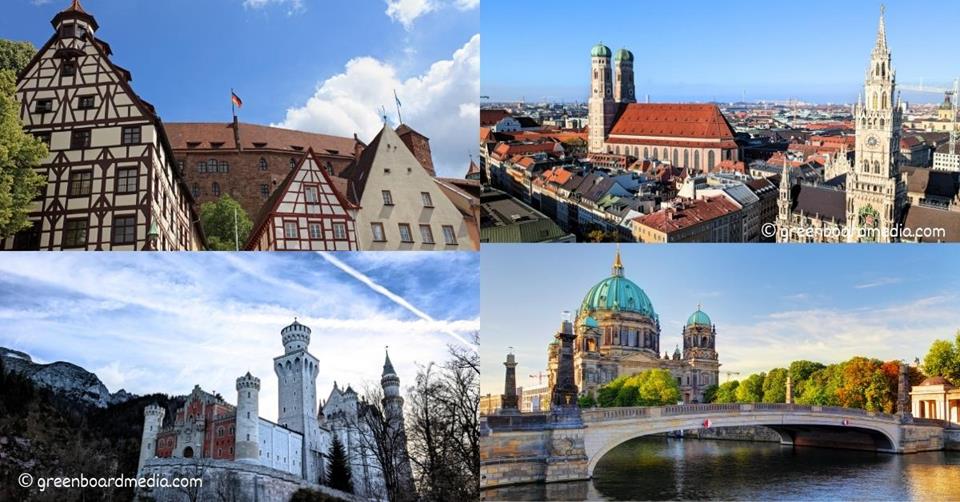
If you have 3 weeks in Europe , where would you want to go? Germany is not the usual answer, but maybe those people are missing out on something.
Before heading to Germany, there are a few essential things to know. Below is a quick list of what you need to know and remember, including transportation, currency, budget, what to pack, visa and more.
When is the best time to go to Germany
The best time to visit Germany for a vacation largely depends on personal preferences and the experiences you seek. From June to August, summer offers pleasant weather for outdoor activities and festivals nationwide.
Spring (April to June) and autumn (September to October) boast milder temperatures, fewer crowds, and vibrant foliage. If you’re a fan of Christmas markets and festive charm, consider planning your trip from late November to December during the magical Advent season.
Keep in mind that weather conditions and regional variations should be considered when choosing the best time to visit specific areas of Germany. I’ve been to Germany a few times and went in different seasons. I enjoy the autumn and spring seasons when it’s neither cold nor hot.
Although summer is a great way to enjoy the warm weather, you’ll notice that the locals are also spending time outside and in a much better mood. But remember, the summer and Christmas seasons are the busiest time in Germany, and tourism prices are much higher.
RELATED POST: Best destinations for a 3-week Spring trip
Are 3 weeks enough for Germany
Three weeks can provide an excellent vacation experience in Germany, allowing ample time to explore its diverse cities, picturesque landscapes, and immerse oneself in its rich culture. With this duration, you can visit iconic destinations like Berlin, Munich, and the Black Forest, as well as discover hidden gems and indulge in local experiences.
However, the specific itinerary and areas of interest should be considered to maximise your time. It’s best to play to see between 3-4 cities during your 20 days in Germany. Choosing the mode of transport will also affect how easy or challenging it would be to get from point A to B.
What to pack
A must-pack item for a 3-week trip to Germany is a reliable and comfortable pair of walking shoes. With so much to explore, from historic city centres to scenic trails, having comfortable footwear is essential.
In general, walking plays a big part in exploring a European city. Although there is reliable public transport, if you’re on a budget, it’s best to rely on your feet when exploring each city since trying to learn the metro can be time-consuming, and you really don’t want to get off the wrong station.
Opt for shoes that provide good support and cushioning to ensure you can comfortably navigate cobblestone streets, museums, and natural landscapes. Don’t let sore feet limit your adventures – pack those walking shoes and embark on a memorable journey through Germany.
Make sure to check our what to pack for a 3-week trip . But we also have a specific packing list for the spring , summer , and winter holidays .
How to get around
Thanks to its well-developed transportation network, getting around Germany is convenient and efficient. For affordable travel, consider utilizing the extensive train system operated by Deutsche Bahn (DB). With various ticket options, including regional passes, you can explore multiple cities at a reasonable cost.
Buses, particularly long-distance coaches like FlixBus, offer affordable alternatives, albeit with longer travel times. On the other hand, buses get to places where trains and planes are not an option.
If speed is a priority, domestic flights are the fastest option, connecting major cities with shorter travel durations. However, flights tend to be more expensive compared to trains or buses.
You can also rent a car at the beginning of your trip and drive throughout your time here. If Berlin is the start of your itinerary, you can arrange a car rental at the airport. Companies such as Avis, Europcar, Budgetcar, and other popular brands are available here.
Around €40-€70 per day is a reasonable budget depending on the size, style, and other additional features you wish to have. If you go with the most affordable choice and basic feature, around €800 for a 20-day car rental, and €1,400 for a higher-end option.
Ultimately, the best mode of transportation depends on your budget, time constraints, and personal preferences, so plan accordingly to make the most of your German adventures.
Language and currency
For visitors to Germany, the official language spoken is German. While many Germans can communicate in English, especially in tourist areas, learning a few basic German phrases to navigate daily interactions is helpful.
The currency used is the Euro (€), and cash is widely accepted throughout the country. Credit and debit cards are also widely used, but carrying cash for smaller establishments and having flexibility in rural areas is advisable.
ATMs are easily accessible, and major credit cards are accepted in most places. It’s worth noting that some businesses may not accept foreign cards, so having some cash on hand is always handy.
Average travel cost for 3 weeks in Germany
For backpackers on a budget, it’s possible to keep costs low by staying in hostels or budget accommodations, cooking your meals or opting for inexpensive local eateries, and using public transportation. A rough estimate for a backpacker budget would be around €40-60 per day, totalling approximately €840-1260 for three weeks.
For mid-range travellers who seek a balance between comfort and cost, staying in mid-range hotels or guesthouses, enjoying a mix of affordable local dining and occasional restaurant meals, and using a combination of public transportation and occasional taxis, the average daily cost would range from €80-120. This would amount to around €1680-2520 for three weeks.
Luxury travellers can expect a higher budget for their trip. Staying in upscale hotels or luxury accommodations, dining at fine restaurants, and utilizing private transportation or chauffeur services will naturally increase expenses. A luxury trip in Germany could easily cost €200 or more per day, resulting in a total budget of approximately €4200 or more for three weeks.
Visa and COVID-19 protocol
Visa for Germany is relatively straightforward. Since it’s an EU member, the government has the same visa policy as the Schengen States. This means that visitors enjoying the visa-free program can stay and travel in Germany for up to 90 days.
If you need to apply for a visa (Schengen tourist visa), the amount of days you can stay in Germany depends on how many days the embassy grants.
Travellers carrying a passport from most countries in the Americas, including New Zealand, Australia, Japan, Malaysia, Singapore, South Korea, and UAE, can enter and travel around Germany or Schengen Area for up to 90 days in a 180-day calendar.
EU nationals have a freedom of movement in Germany. If you’re applying for a Schengen tourist visa, you can submit your application no earlier than six months before your trip.
As of December 2022, Germans are still wearing masks in public transportation and spaces.
Other travel tips
Pinned map of must-see places in germany.
Click the enlarge button on the top right corner. Credit: map data: Google
3 WEEKS IN GERMANY ITINERARY
Whether you’re a history buff, a nature lover, or a culture enthusiast, Germany has something to offer everyone. So, get ready to embark on a journey of a lifetime, where each day unfolds a new chapter in your German adventure.
But if you want to see more places in Europe but not too far from Germany, check out our 3 weeks in Central Europe itinerary . We also have 3 weeks in Western Europe itinerary .
Berlin for 4 days
Start your trip on a captivating four-day vacation in Berlin, Germany’s vibrant capital city. Begin your exploration with a visit to iconic landmarks such as the historic Brandenburg Gate and the stunning Reichstag building. Immerse yourself in history at the Berlin Wall Memorial and Checkpoint Charlie, and gain insight into the city’s past.
Delve into Berlin’s rich art scene by exploring renowned museums adorned with captivating murals like the Pergamon Museum and the East Side Gallery. Indulge in the city’s culinary offerings at bustling food markets and traditional beer gardens.
This is a great place to start your 20 days in Germany because many flights land in this capital city. Plus, from here, you won’t have a hard time getting to other parts of the country, whether by train, plane, bus, or driving.
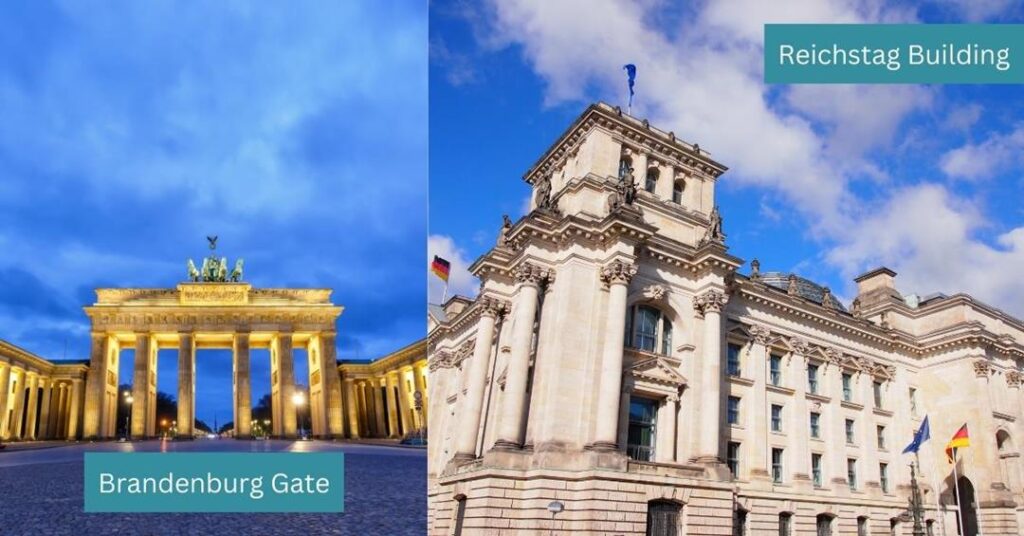
Things to do in Berlin
- Brandenburg Gate
- Discover Berlin – join a walking tour or a specific Third Reich WWII tour or a street art tour or get a hop-on, hop-off bus pass
- Reichstag Building
- Berlin Wall Memorial and East Side Gallery – check this tour
- Museum Island
- Holocaust Memorial
- Sachsenhausen Concentration Camp – book an affordable tour
- Checkpoint Charlie
- Berlin Television Tower (Fernsehturm) – get your skip-the-link ticket
- Charlottenburg Palace
- Explore the nightlife and culinary via a food tour and/or pub crawl
Accommodations in Berlin
- Affordable: a&o Berlin Hauptbahnhof or Ballhaus Berlin Hostel or New Hostel Berlin Mitte
- Mid-range: Living Hotel Großer Kurfürst or NH Collection Berline Mitte
- Luxury: Steigenberger Hotel Am Kanzleramt or Berlin Marriott Hotel
Nuremberg for 3 days
Soak up the city’s captivating history by exploring the medieval wonders of the Old Town. Admire the awe-inspiring Nuremberg Castle and soak in panoramic views of the city. Discover the poignant chapters of World War II at the Documentation Center Nazi Party Rally Grounds.
Try out the iconic Nuremberg sausages and indulge in traditional Franconian cuisine at cosy taverns. Wander through the charming streets, taking in the Gothic architecture and visiting notable landmarks like the Frauenkirche.
Enjoy the vibrant cultural scene by visiting renowned museums such as the Germanisches Nationalmuseum. Enjoy an evening of entertainment at lively music venues and beer gardens.
On your final day, visit the picturesque Nuremberg countryside and explore the scenic landscapes and charming villages.
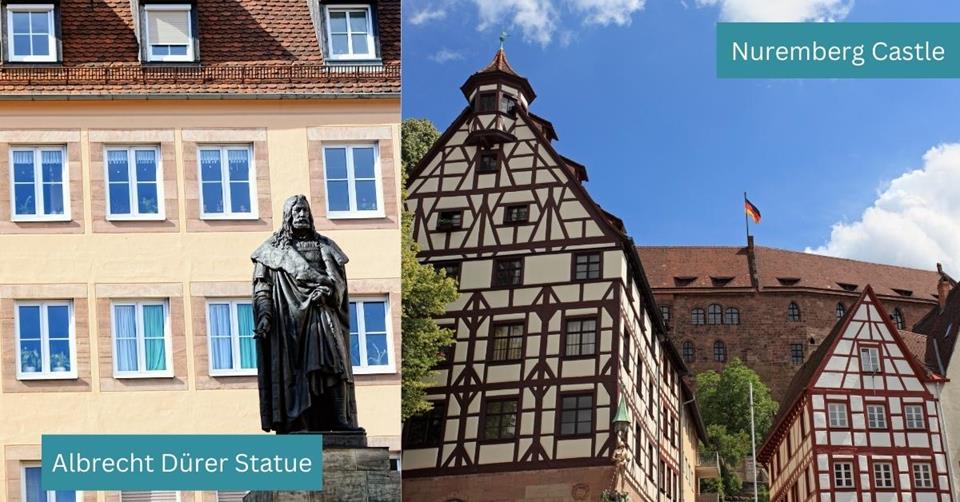
Things to do in Nuremberg
- Nuremberg Castle
- Old Town (Altstadt) – join a 1.5-hour walking tour or sign up for a sightseeing train tour or get a hop-on, hop-off bus pass
- Documentation Center Nazi Party Rally Ground
- You can also do a combo tour for Old Town and Nazi Rally Ground
- German National Railway Museum
- Nuremberg Toy Museum (Spielzeugmuseum)
- World War II in Nuremberg – Courtroom 600 and 3rd Reich Sites tour or
- St. Lorenz Church
- Albrecht Dürer House
- Nuremberg’s Medieval Dungeons – book a tour
- Nuremberg Trials Memorial (Memorium Nürnberger Prozesse)
- Christmas Market (Christkindlesmarkt) – if visiting in December, don’t miss one of the world’s oldest and most famous Christmas markets
- Go on an exciting pub crawl
Accommodations in Nuremberg
- Affordable: a&o Nurnberg Hauptbanhof
- Mid-range: B&B Hotel or Hotel-Gasthof Bub or Hotel Continental
- Luxury: Best Western Hotel or Hotel Elch or Melter Hotel & Apartments
Munich for 4 days
Munich, a vibrant city with rich history and culture, is a must-visit destination. It offers an array of world-class museums, beautiful architecture, and a unique blend of traditional and modern German life. The city’s heart, Marienplatz, boasts the stunning New Town Hall and its Glockenspiel, a major crowd-pleaser with its animated figures dancing to chimes.
The Munich Residenz, the former royal palace, offers insight into Bavarian history with its opulent interiors. Art enthusiasts shouldn’t miss the Alte Pinakothek, home to European masterpieces from the Middle Ages to the 18th century.
For relaxation, the English Garden is one of the world’s largest urban parks, perfect for a leisurely stroll or picnic. Nymphenburg Palace’s grand baroque architecture and extensive gardens are a testament to the city’s royal past.
And for a taste of Bavarian tradition, visit the Hofbräuhaus, one of the city’s oldest beer halls, for some local brew and pretzels. Making a day trip to Neuschwanstein Castle and Linderhold is also highly recommended – it’s definitely one of my favourite places during my 3 weeks in Germany.
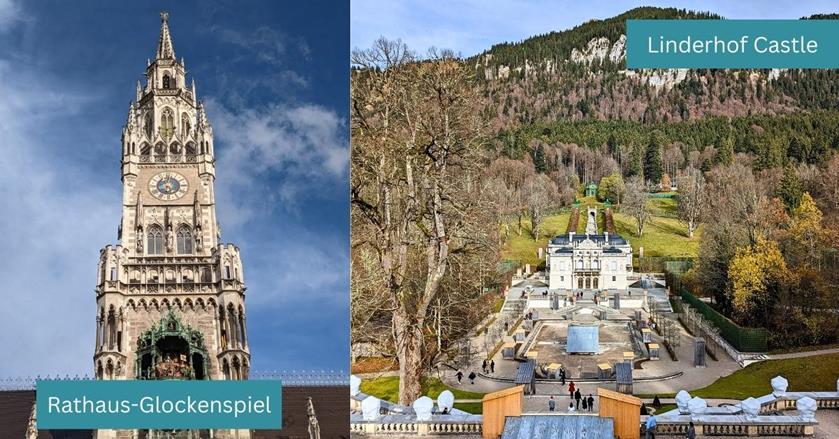
Things to do in Munich
- Marienplatz (Old Town)
- Nymphenburg Palace
- Explore Munich – sign up for the Third Reich WWII tour or join a ghost and spirit tour
- English Garden
- Munich Residenz
- Neues Rathaus
- Deutsches Museum
- Viktualienmarkt – join a food tour around the market or a Bavarian dinner and drinks
- Hofbräuhaus München
- Neuschwanstein Castle and Linderhof Palace – book a full-day tour – take a day trip to this fairy-tale castle nestled in the Bavarian Alps, a masterpiece of the Romanticism Era
- The Olympic Park
- Cuvillies Theater
- TimeRide VR Time Travel – read the reviews
- Salzburg day trip tour from Munich
- Dachau Concentration Camp Memorial Site – get there by train
- Allianz Arena
- Day trip to Rothenburg and Nordlinger Ries – beautiful medieval towns and houses, book a tour
- Day trip to Salzburg – birthplace of Mozart, join a tour and take the train
Accommodations in Munich
- Affordable: 1st Creatif Hotel Elephant or The 4YOU Hostel
- Mid-range: Hotel Jedermann or Hotel Demas City
- Luxury: Hotel Torbrau or Eden Hotel Wolff or Hotel Mirabell
Stuttgart for 4 days
With 3 weeks in Germany, you could visit a less-popular city like Stuttgart. It is nestled in the heart of Germany’s Baden-Württemberg region and is a city where rich history intersects with vibrant modernity. It’s renowned as a hub of the German automotive industry, housing headquarters and museums of world-famous brands like Mercedes-Benz and Porsche.
Stuttgart’s architecture is a fascinating mix: Medieval castles and palaces contrast with contemporary buildings like the Stadtbibliothek (City Library) and the Staatsgalerie, an ultra-modern art museum. Don’t miss the Schlossplatz, the city’s largest square, surrounded by historical buildings and lush green parks.
Culinary enthusiasts will enjoy Swabian specialities, such as Maultaschen and Spätzle. Finally, Stuttgart is part of the largest wine-growing region in Germany, so wine tasting is highly recommended.

Things to do in Stuttgart
- Mercedes-Benz Museum
- Porsche Museum
- Schlossplatz
- Wilhelma Zoo and Botanical Garden
- Staatsgalerie Stuttgart
- Stuttgart Television Tower (Fernsehturm
- Killesberg Park
- Old Castle (Altes Schloss)
- New Castle (Neues Schloss)
Accommodations in Stuttgart
- Affordable: a&o Stuttgart or Jugendherberge International
- Mid-range: Hotel Wartburg or Mirage City Hotel
- Luxury: Hampton by Hilton or Arcotel Camino or Le Meridien
Frankfurt or Dusseldorf for 5 days
I personally visited both. Since I rented a car in Frankfurt, it made it easy for me to travel to Dusseldorf as well. Cologne, Essen, and Dortmund are just around the corner as well, making my day trip quite fruitful.
But if you want to choose one city only, between Frankfurt and Dusseldorf, it depends on your interests. If you decide on Dusseldorf but can see that you can squeeze in Frankfurt, this one-day in Frankfurt guide will definitely come in handy.
Frankfurt, Germany’s financial hub, boasts a futuristic skyline and historic sites like the Romerberg area and St. Bartholomew’s Cathedral. The Palmengarten offers a botanical oasis, while the Stadel Museum hosts an impressive art collection.
Conversely, Dusseldorf is known for its fashion industry and art scene and offers a vibrant old town, ‘Altstadt’, hosting over 300 bars and restaurants. Stroll along the Rhine embankment promenade for riverside views, or visit the modern Media Harbour.
Art lovers will enjoy the Kunstsammlung Nordrhein-Westfalen and K20. If you go to Dusseldorf, this means that you can also visit Cologne, Essen, and Dortmund since these places are very near one another.
Both cities offer unique experiences, Frankfurt blending old and new and Dusseldorf thriving in fashion and arts, making either an excellent choice.

Things to do in Frankfurt
- Römer (Old Town)
- Frankfurt River – book a cruise
- St. Bartholomew’s Cathedral
- Palmengarten
- Städel Museum
- Discover nightlife via a fun pub crawl
- Museum Embankment (Museumsufer)
- Kleinmarkthalle – try local food and produce at this indoor market in the city centre
- The River Main
- Scavenger Hunt – which is a fun self-guided city tour
- Museumsufer
- Goethe House and Museum
- Eiserner Steg
- Old Sachsenhausen
- Schirn Kunsthalle
- Half-day trip to Heidelberg – check the tour price
- Escheimer Turm
- Day trip to Rhine Valley – including a cruise
- Klassikstadt
- Day trip to Baden-Baden, Black Forest, and Strasbourg – check the schedule and price
- There’s a 7-day tour around Central Europe that leaves in Frankfurt – check the price and itinerary
Things to do in Dusseldorf
- Königsallee (King’s Avenue)
- Rhine Tower and Rhine River Cruise – book a boat tour
- Altstadt (Old Town)
- North Rhine-Westphalia Art Collection (Kunstsammlung Nordrhein-Westfalen)
- Media Harbour (MedienHafen)
- Benrath Palace (Schloss Benrath): Explore this Baroque-style mansion and its beautiful gardens.
- Carlsplatz Market – savor local flavours at this vibrant market, offering fresh produce, local delicacies, and more.
- Day trip to Essen, Cologne, and Dortmund
Accommodations in Frankfurt
- Affordable: Hotel Scala or Hotel Miramar am Romer
- Mid-range: Motel One or Ruby Louise Hotel
- Luxury: Sofitel Opera or Hilton Hotel
Accommodations in Dusseldorf
- Affordable: a&o Dusseldorf or B&B Hotel
- Mid-range: Leonardo Hotel or Holiday Inn Express
- Luxury: The Niu Tab or Clayton Hotel or Carahotel
MUST-TRY GERMAN DISHES AND DRINKS
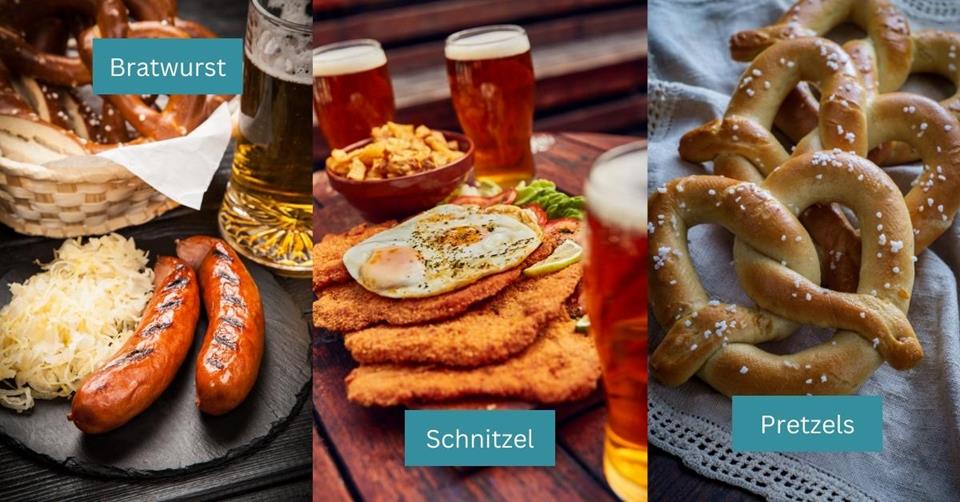
Don’t forget to visit a beer hall or two. It’s where you’ll find the best traditional German food and drinks. During your visit to Germany, make sure to indulge in these must-try German dishes to savour the country’s culinary delights:
- Bratwurst – traditional German sausages
- Sauerkraut – fermented cabbage
- Pretzels – iconic soft baked bread products with a twisted knot shape
- Schnitzel – breaded and fried meat cutlets, typically pork or veal
- Sauerbraten – classic pot roast made from marinated and braised beef
- Kartoffelpuffer – crispy potato pancakes
- Black Forest Cake (Schwarzwälder Kirschtorte) – decadent dessert featuring layers of chocolate sponge cake
- Maultaschen – Swabian-style pasta pockets
- Currywurst – popular street food dish consisting of sliced bratwurst topped with a tangy curry ketchup sauce
- Apfelstrudel – delectable apple strudel with a flaky pastry
- Glühwein -warm and spiced mulled wine
- Schanpps – various flavours to try
- Apfelschorle – refreshing combination of apple juice and sparkling water
- Apple Strudel (Apfelstrudel) – classic dessert consisting of thinly rolled dough filled with spiced apples, raisins, and nuts
- Stollen – traditional Christmas cake made with a yeasted dough
SUMMARY OF 3 WEEKS IN GERMANY ITINERARY
From the vibrant streets of Berlin to the enchanting beauty of the Black Forest and the cultural charm of Munich, this well-crafted 3 weeks in Germany itinerary allows you to immerse yourself in the country’s rich history, indulge in delectable cuisine, and soak up the diverse landscapes.
Whether you’re exploring historic landmarks, savouring traditional dishes, or simply wandering through picturesque towns, Germany offers a treasure trove of delights to discover. I hope that this itinerary helped you plan your own that suits your needs and style.
SAVE THIS TRAVEL ITINERARY ON YOUR PINTEREST:


Love Exploring
Germany’s Most Scene-Stealing Road Trips to Enjoy
Posted: January 31, 2024 | Last updated: January 31, 2024
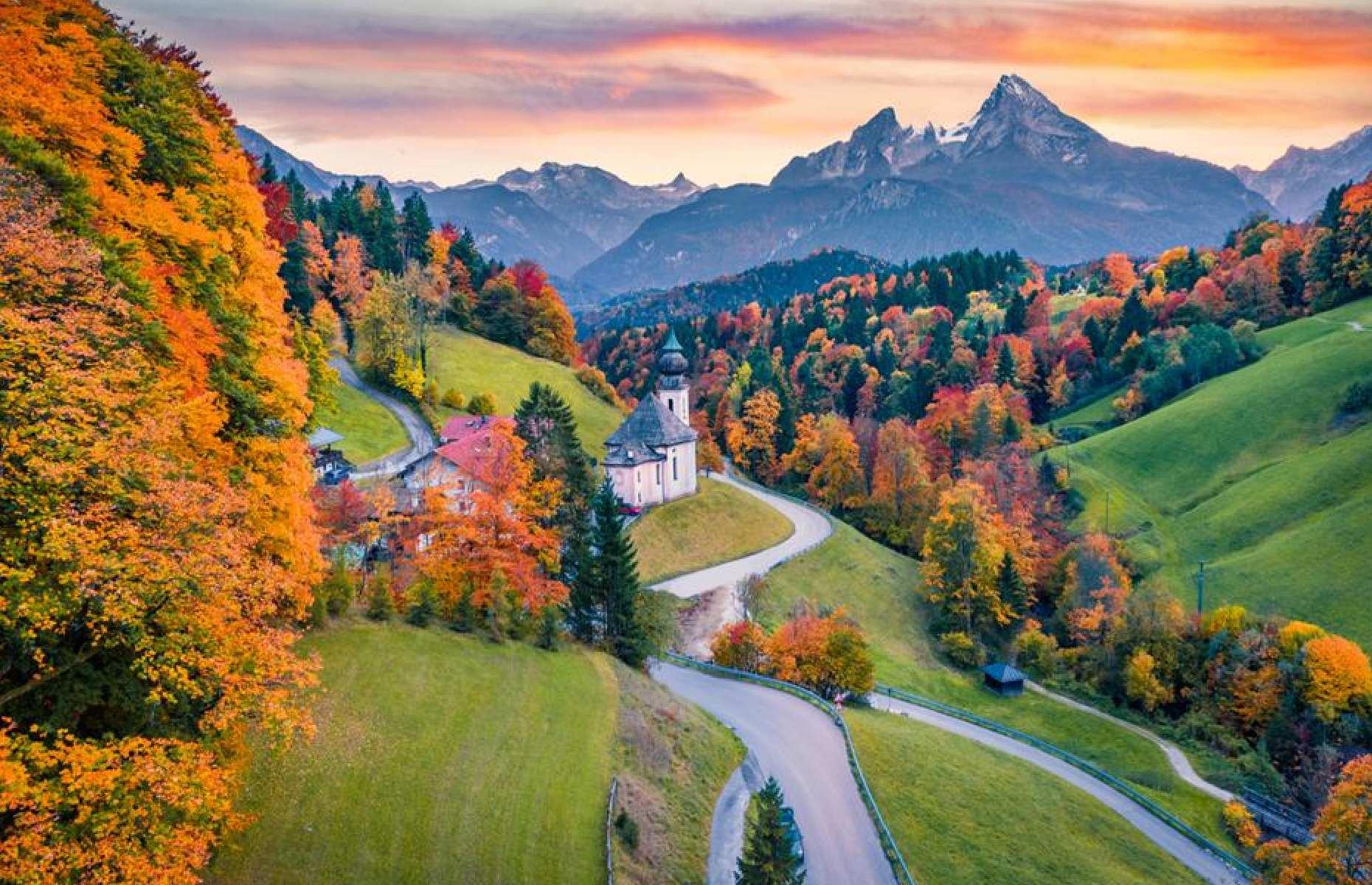
From castles to coast
Germany has many highlights, from cities overflowing with culture and world-famous landmarks to mountains that harbor fairy-tale castles. Then there’s the nature: the less-explored Baltic coastline, waterfalls found deep in the Black Forest, lakes dotted with islets and vast nature reserves. The best way to appreciate all this loveliness is on a road trip. From a journey inspired by the Brothers Grimm to roads that follow the salt-sprayed “German Riviera”, here are some of the best scenic road trips in Germany.
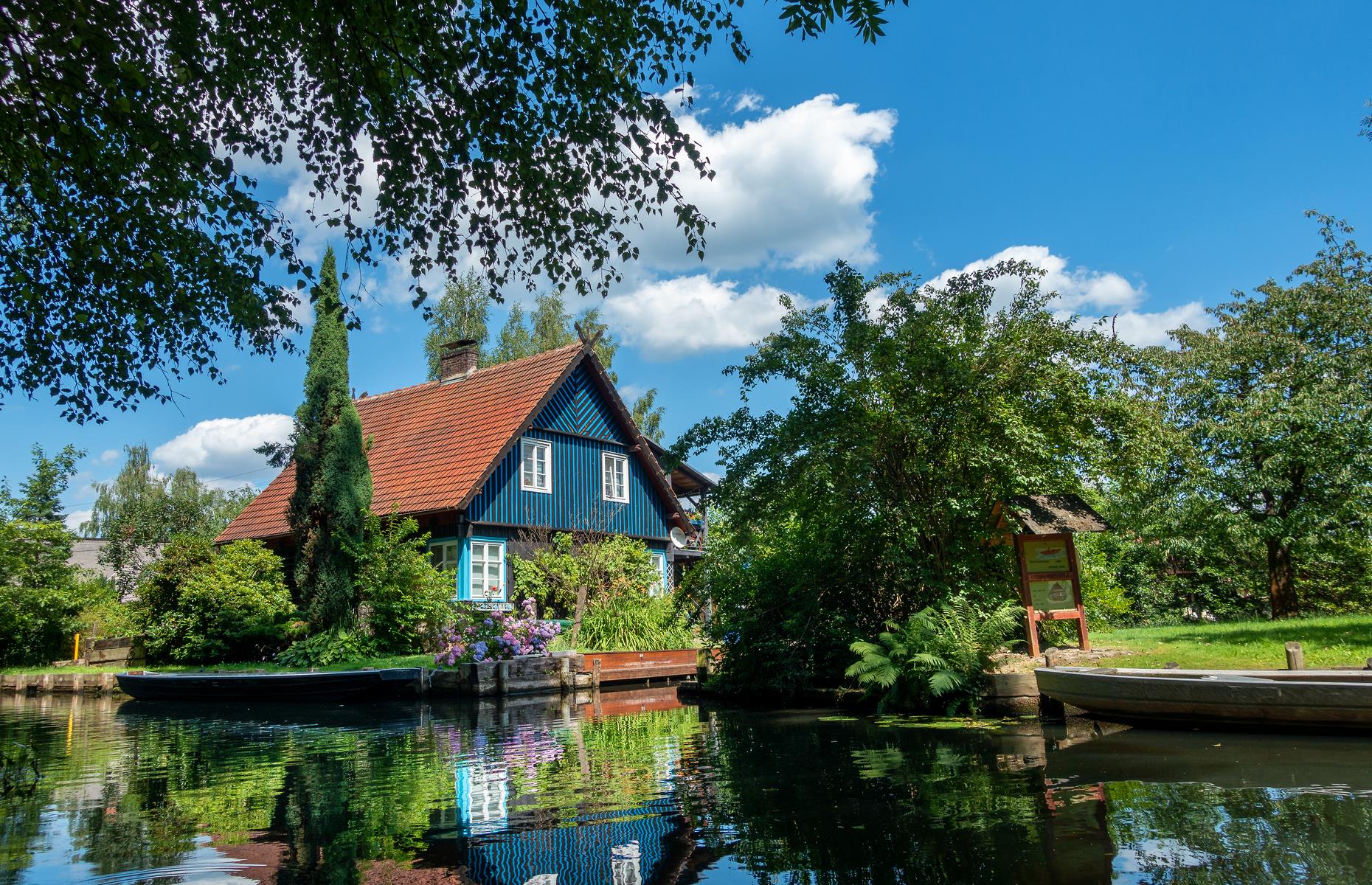
Berlin to Hainich National Park
This route is like a series of snapshots of Germany’s best bits. Starting in Berlin, and lasting for around 350 miles (563km), the journey first dips south to Potsdam, with opulent buildings like the 18th-century Sanssouci Palace, dubbed the “Prussian Versailles”. Then there's the medieval town of Brandenburg, famed for its Gothic architecture. Among more enchanting stops along the way is Spreewald or Spree Forest, a forest and biosphere reserve laced with wetlands and canals, and dotted with “floating” houses (pictured).
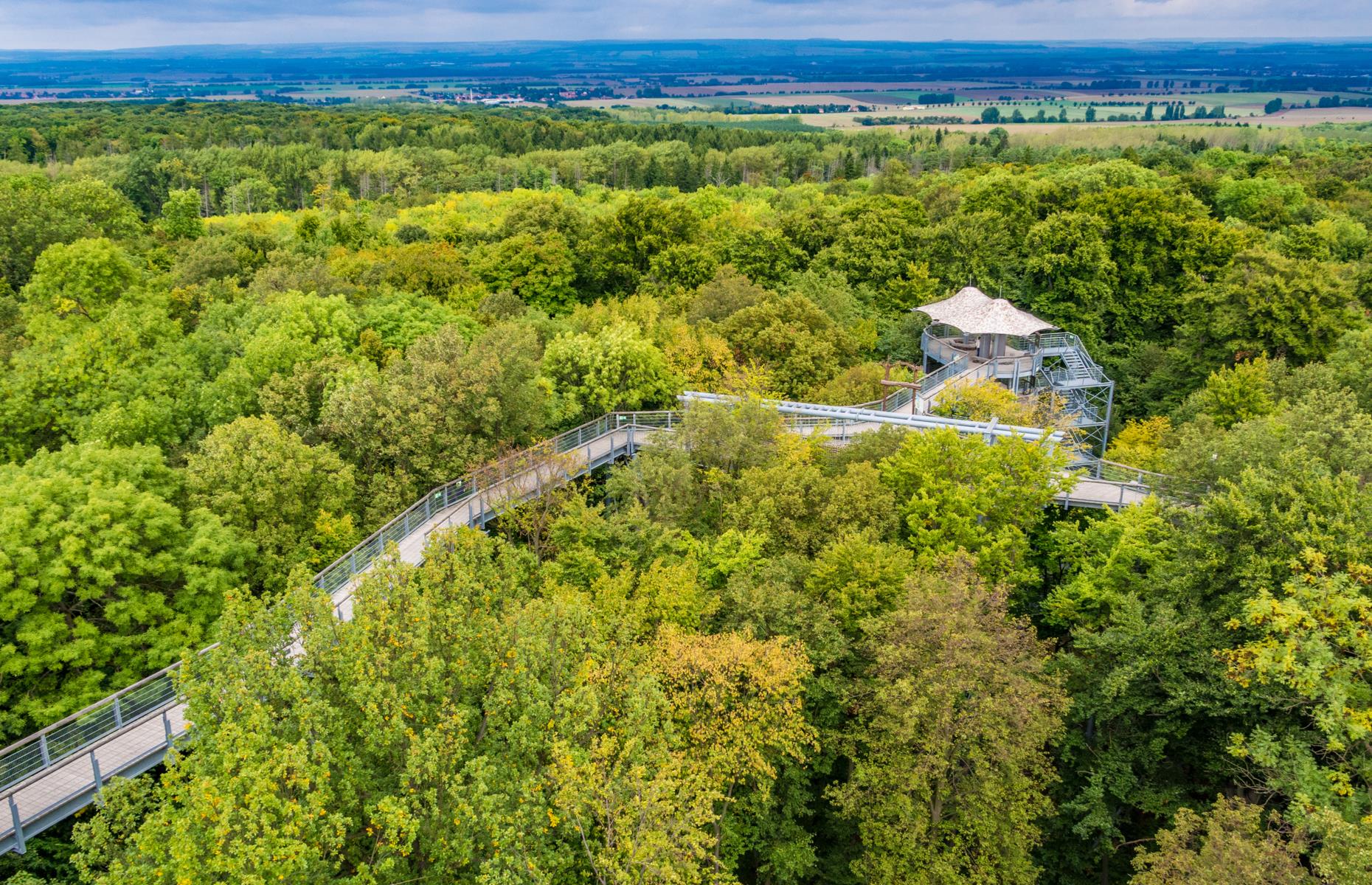
Drivers can travel via scenic roads that skim past nature reserves and wiggle through the conservation area of Naturpark Thüringer Schiefergebirge, so the journey is best taken leisurely over a few days. The destination is also worthy of slow exploration. Hainich National Park (pictured) is one of the last remaining primeval beech forests in Central Europe, with a canopy walk that takes hikers through the treetops as lynx and wolves roam the forest below.
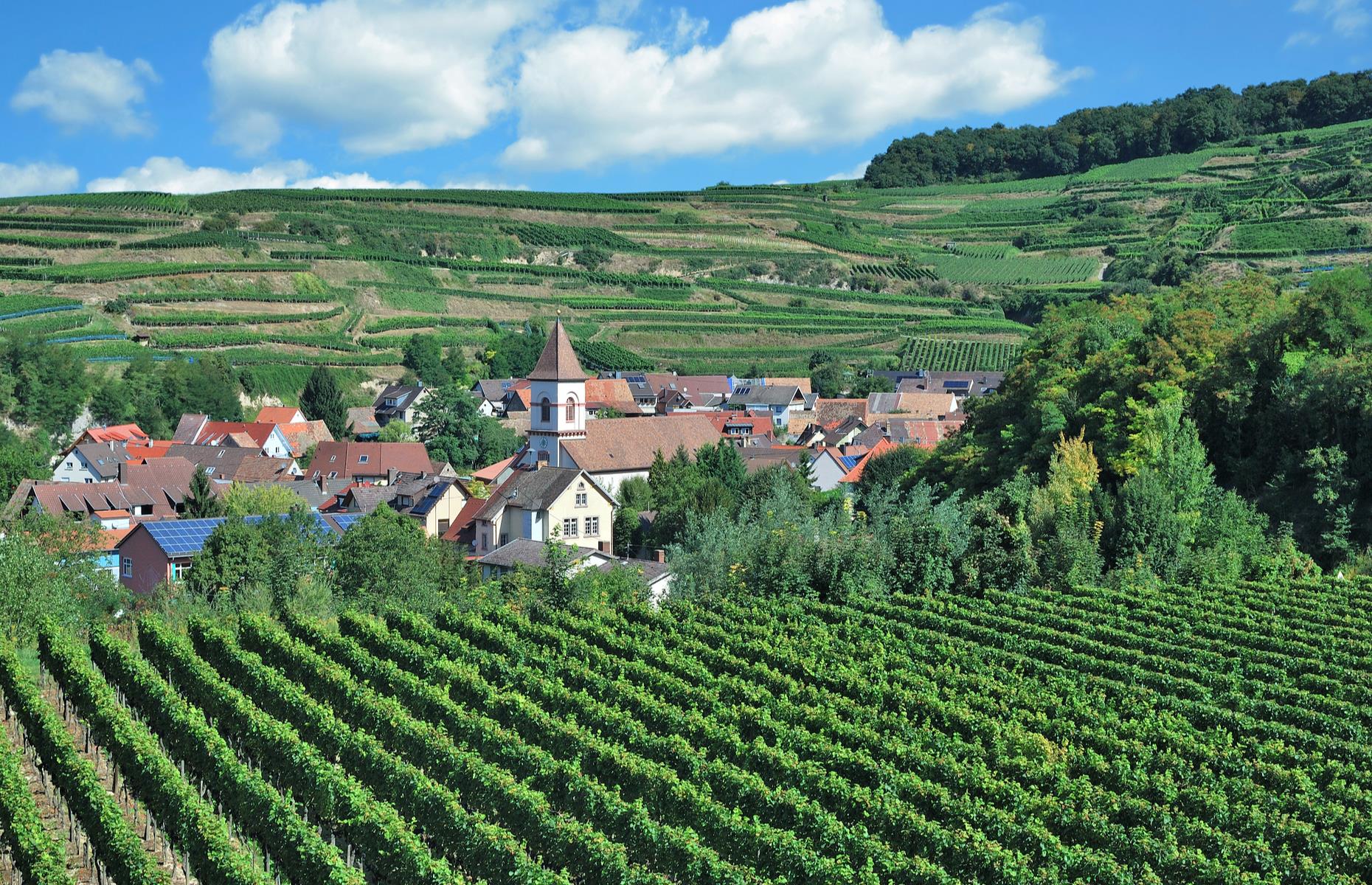
Stuttgart to Weil am Rhein
This delightful route delves into parts of the ever-popular Baden Wine Route , while also devouring portions of the Black Forest. Covering around 175 miles (282km), the journey out from Stuttgart weaves through wine-growing villages on the edge of the Black Forest while also taking in vineyards in the foothills of the Upper Rhine Valley. The elegant spa town of Baden Baden and the Kaiserstuhl wine region (pictured) are among the string of scenic highlights.
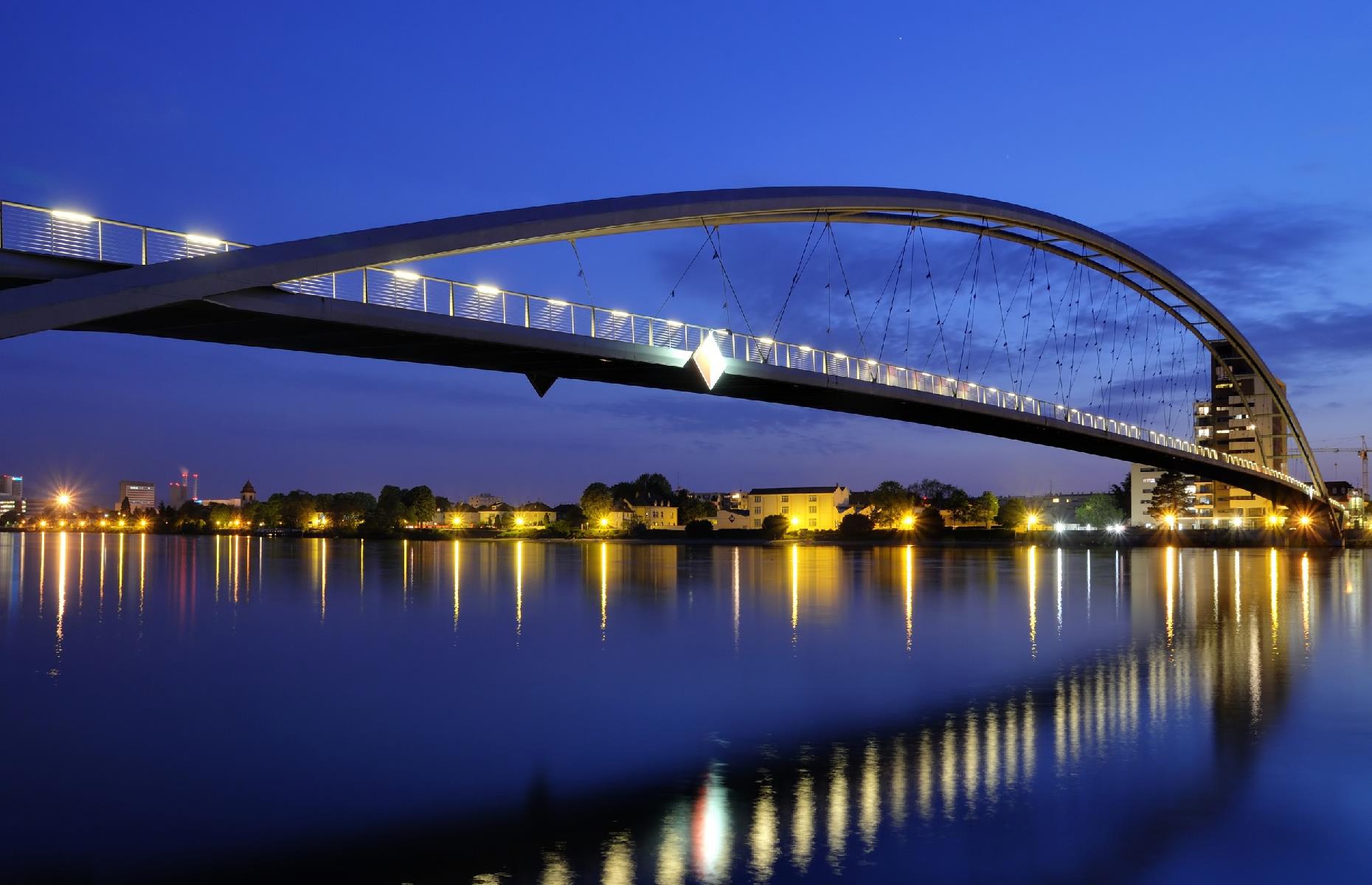
There are many opportunities to take detours through different wine areas along the route, heading into the hilly Kraichgau district, known for pinot noir, or spending time around Badische Bergstraße near Heidelberg. A natural journey’s end is Weil am Rhein, the most southwesterly town in Germany on the east bank of the River Rhine. The town is home to the striking Vitra Design Museum , which has buildings designed by Frank Gehry and Zaha Hadid, and the Three Countries Bridge (pictured), which crosses the Rhine to link Germany with Switzerland and France.
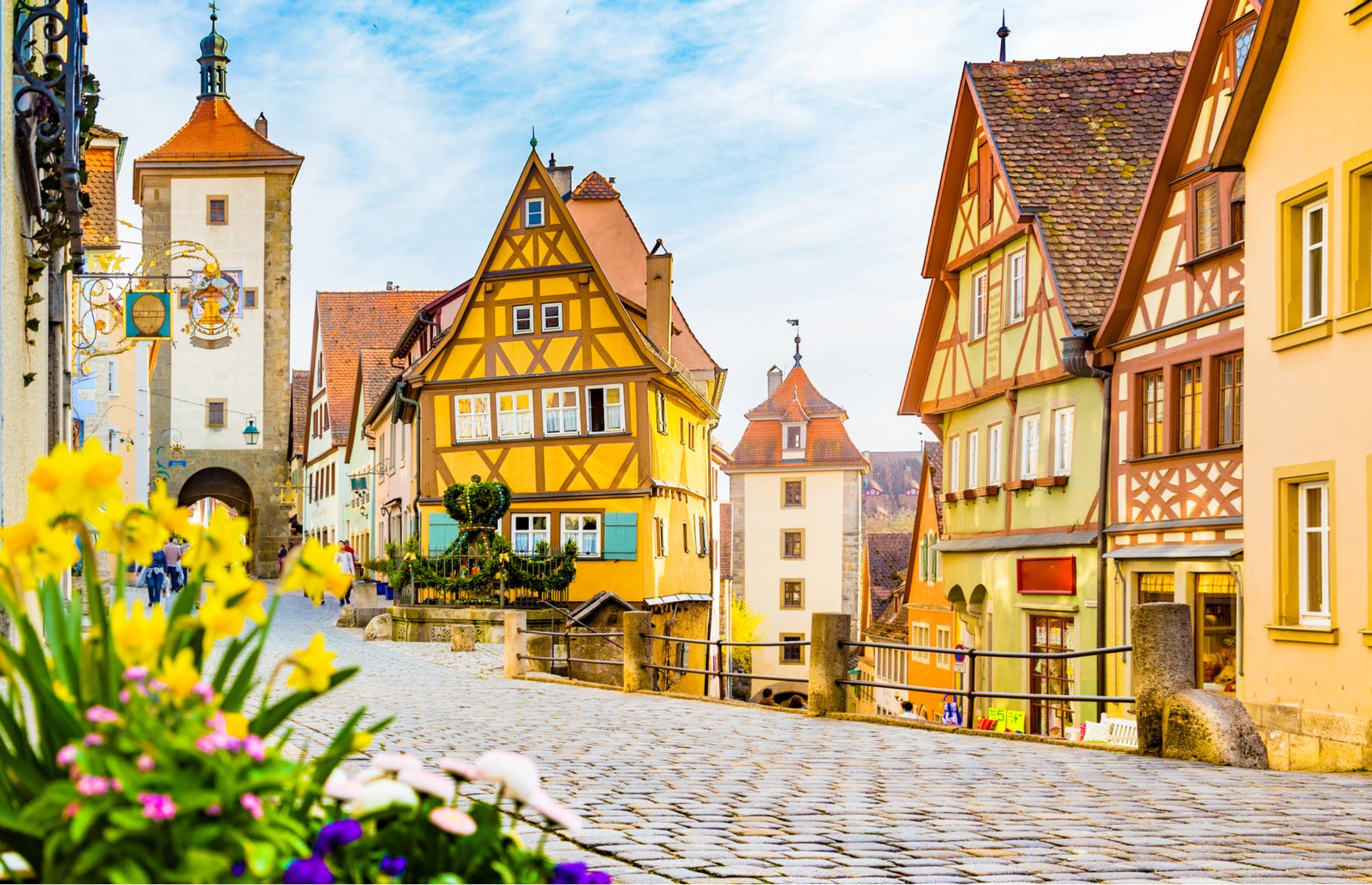
Mannheim to Bayreuth
Stretching for an epic 746 miles (1,200km), the Castle Road runs all the way to Prague in the Czech Republic. This 373-mile (600km) section weaves through southern Germany, incorporating some of the country’s most fascinating fortresses. The line-up of captivating castles and royal residences is dizzying, with the Baroque 18th-century Mannheim Palace at the start of the route and jaw-dropping stops at Nuremberg and Heidelberg Castles. Picturesque towns along the way include the incredibly pretty Rothenburg ob der Tauber (pictured).
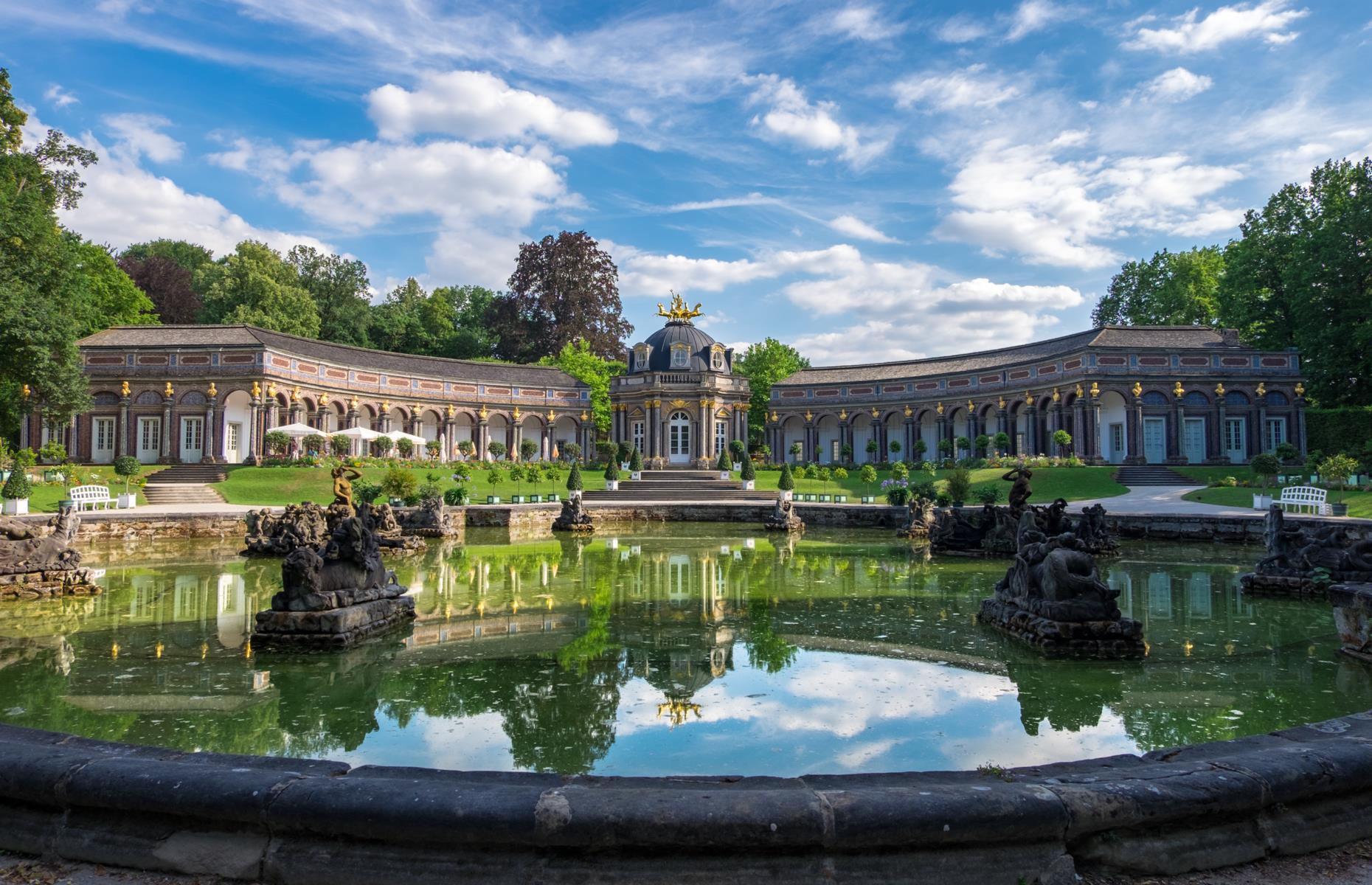
Driving this route spans millennia and passes through some of Germany’s most stunning architecture, from hilltop fortresses and medieval ruins to lavish palaces and summer residences. The final castle is Hermitage Old Palace in Bayreuth, built in 1715 by Margrave Georg Wilhelm for his wife Wilhelmine, who extended it into a lavish example of Rococo architecture (pictured).
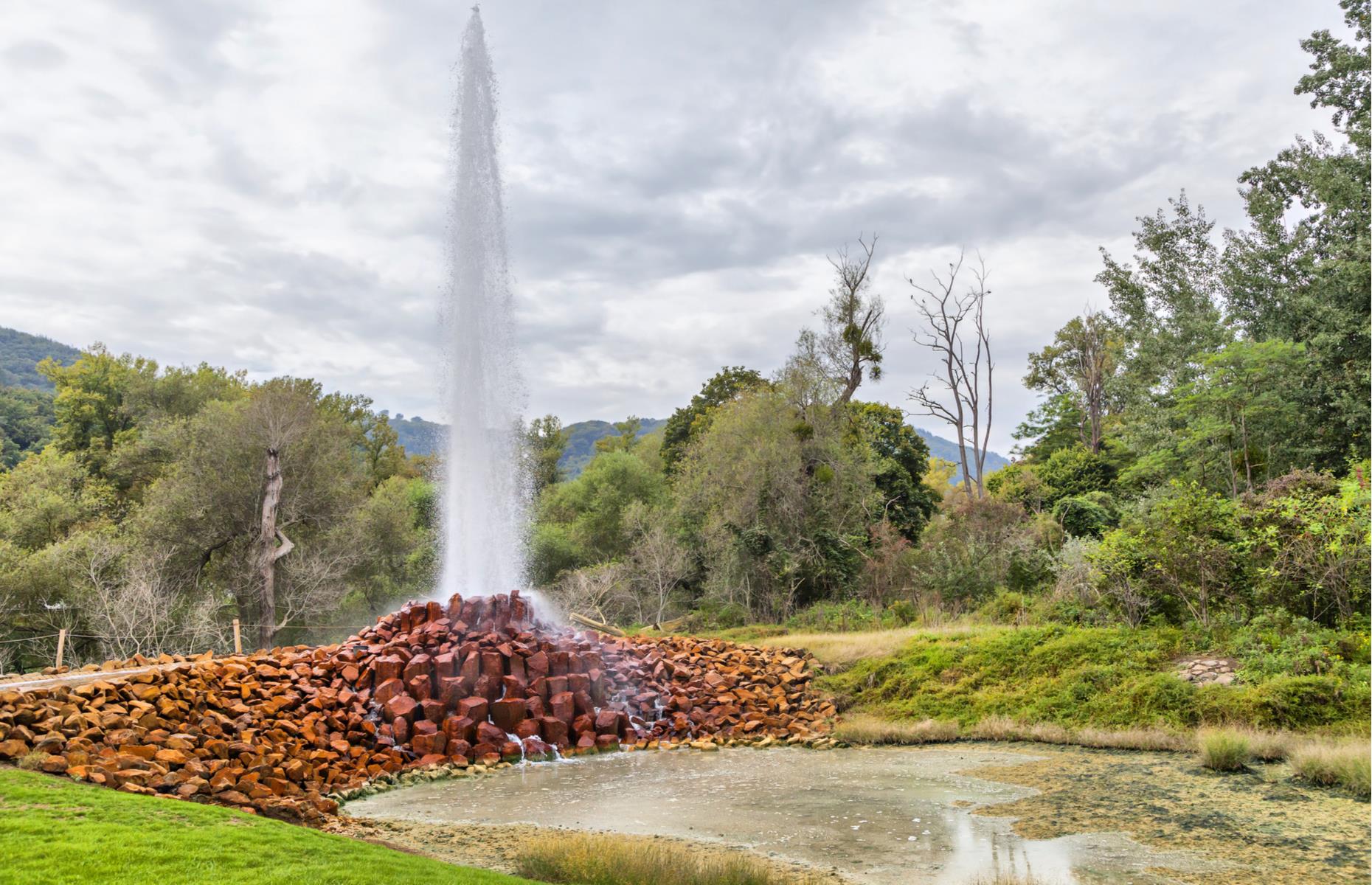
Bonn to Trier
The Volcanoes Route showcases a side of Germany beyond its famous castles and captivating, culturally rich cities. This 174-mile (280km) journey passes through the mountainous Eifel region, which is the country’s most geologically active area and – as the scenic route’s name suggests – strings together several volcanoes. It’s a starkly beautiful landscape shaped by lava flow, although thankfully the volcanoes have laid dormant for around 10,000 years. Signs along the route weave together stories of eruptions, while highlights include the caldera lake Laacher See and nearby Andernach Geyser (pictured).
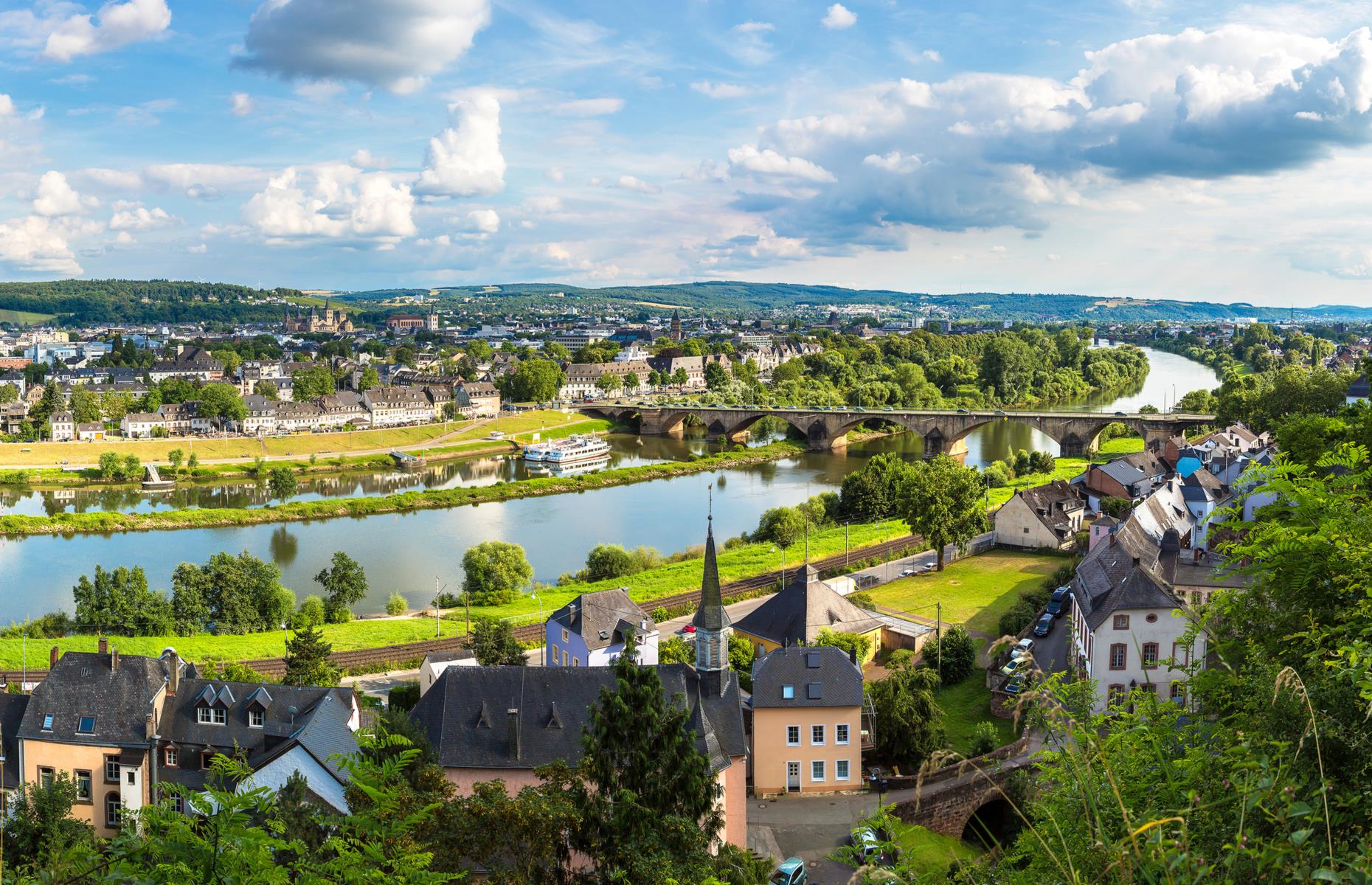
Easily completed at a leisurely pace within a day, the route also passes cinder cones, quarries and spurting geysers. It ends at the southwestern city of Trier (pictured), once a Roman colony and trading hub known as the “second Rome”. Unsurprisingly it’s rich in architecture, including the 4th-century High Cathedral of St. Peter, the oldest bishop’s church in Germany. It stands above a former emperor’s palace, with the original Roman walls still visible inside. The setting is particularly lovely, with the city arranged by the Moselle River and surrounded by vineyards.
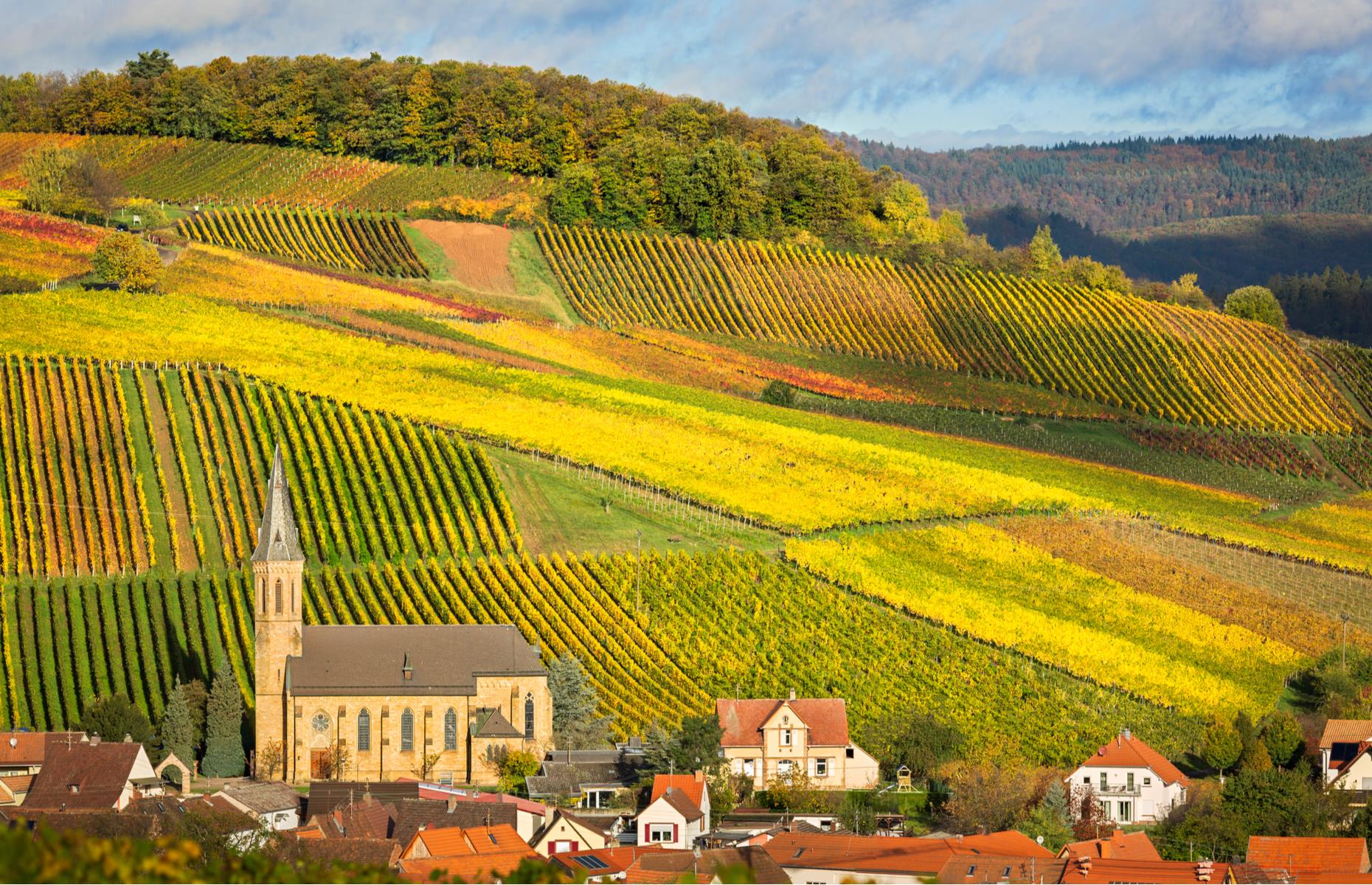
Frankfurt to Schweigen-Rechtenbach
Incorporating the country’s oldest scenic drive, the German Wine Route which was designated in 1935, these 115 miles (185km) or so are best taken slowly, especially for those who plan to taste some of the renowned Riesling wines along the way. From Frankfurt, the road dips south to Bockenheim, the route’s official starting point, and plunges right into the heart of the Palatinate or Pfalz wine region (pictured).
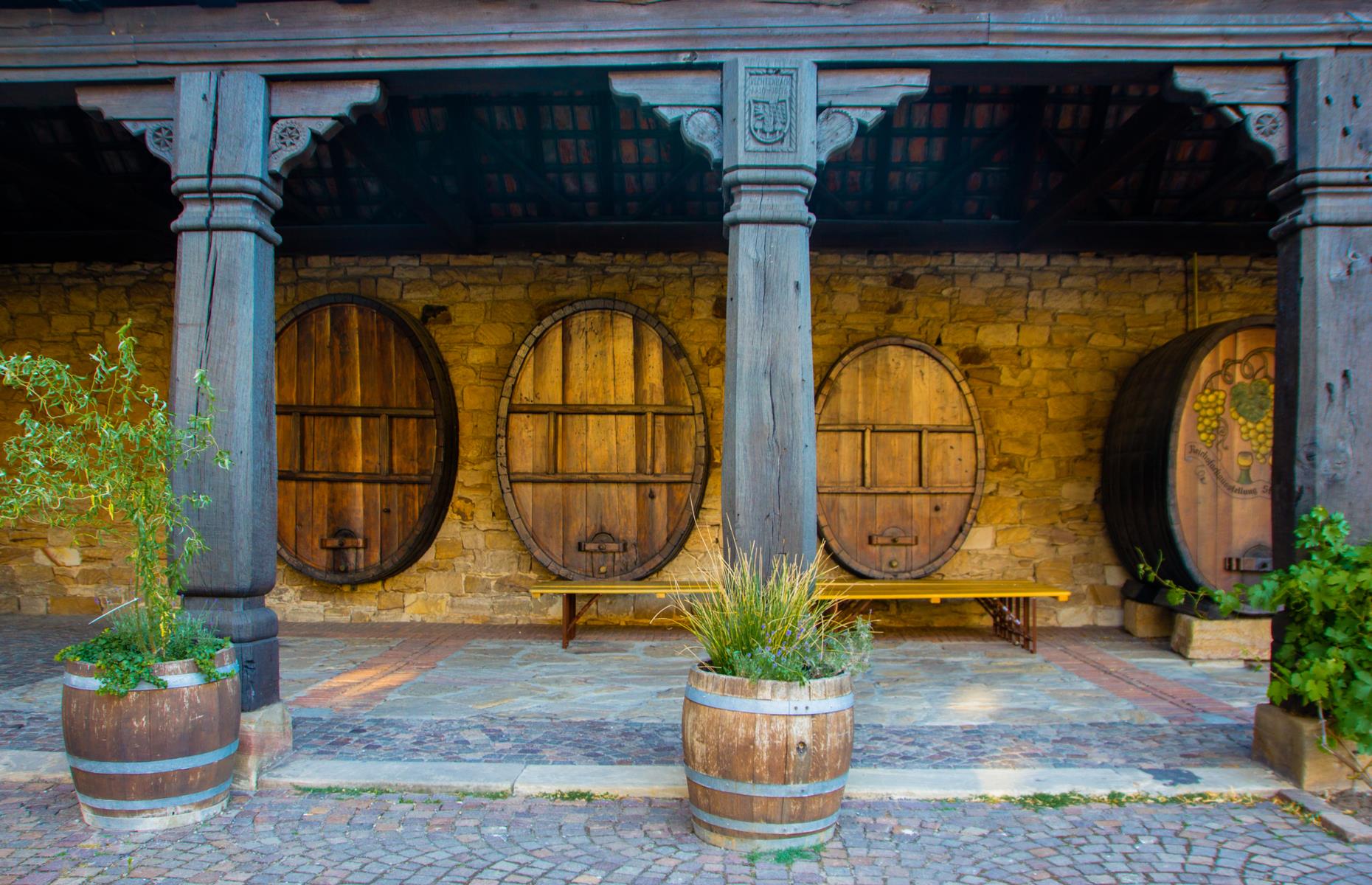
Tasting rooms, pretty villages and even roadside sampling spots line the route, while the Dürkheim Barrel – the world’s largest wine barrel used for dining and tasting – is a must-stop. It’s an especially pretty stretch in spring, when almond trees are in full blossom and fruit shrubs are bursting into life. The route ends at the German Wine Gate (pictured) in Schweigen-Rechtenbach on the border with France.
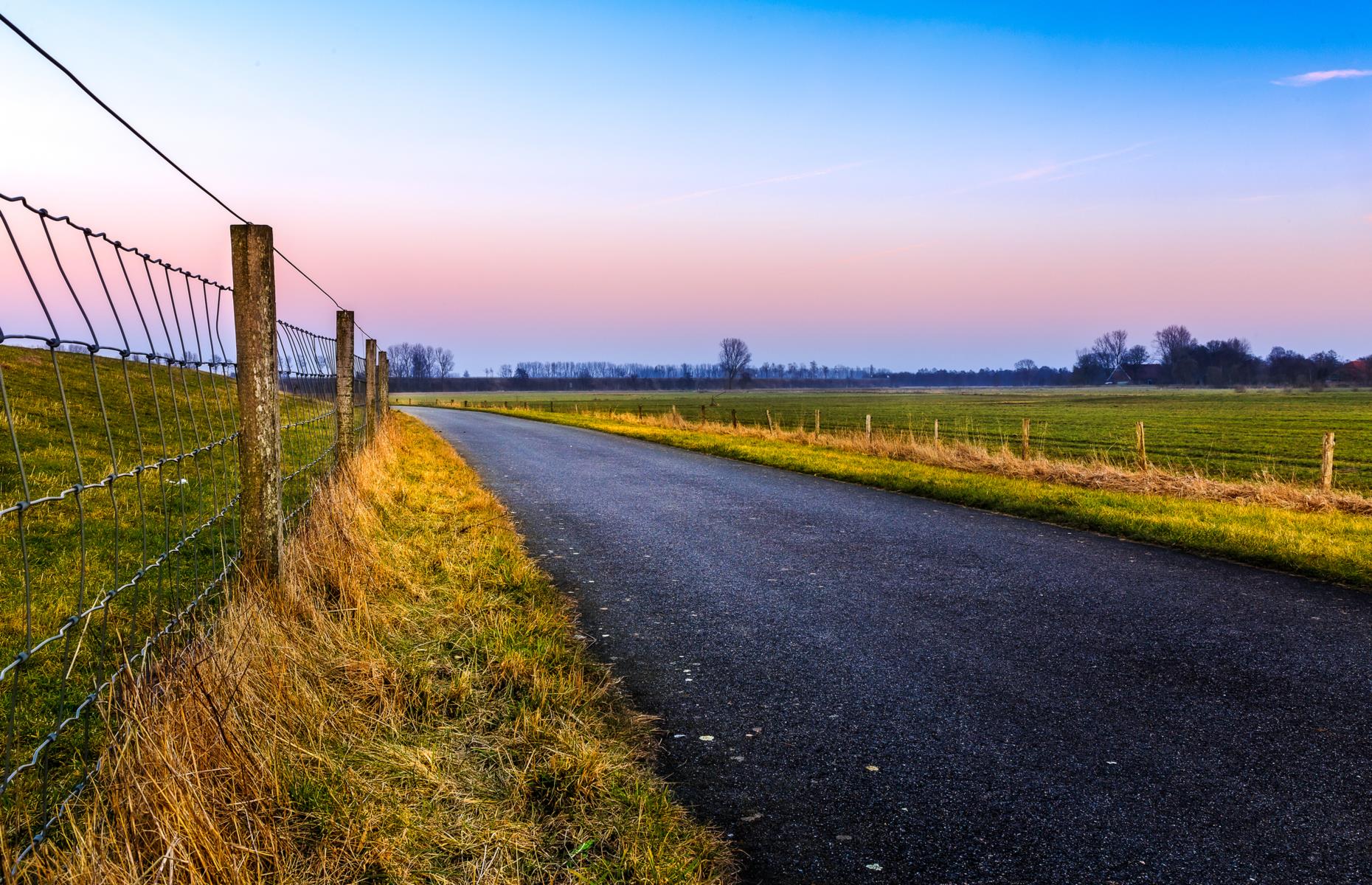
Papenburg to Papenburg
Starting and finishing in Papenburg, a city in the northern Emsland region of Lower Saxony, this scenic 106-mile (170km) loop – also a popular cycling route – heads north to Aurich before circling back. Along the way, it takes in landscapes from a patchwork of greenery and farms in the Ammerland region, to charming canal-side villages. Skirting near the border with the Netherlands, the Fen Route is named for the Dutch word “fehn”, referring to the methods used in the 16th and 17th centuries to dig canals for drainage by marshland.
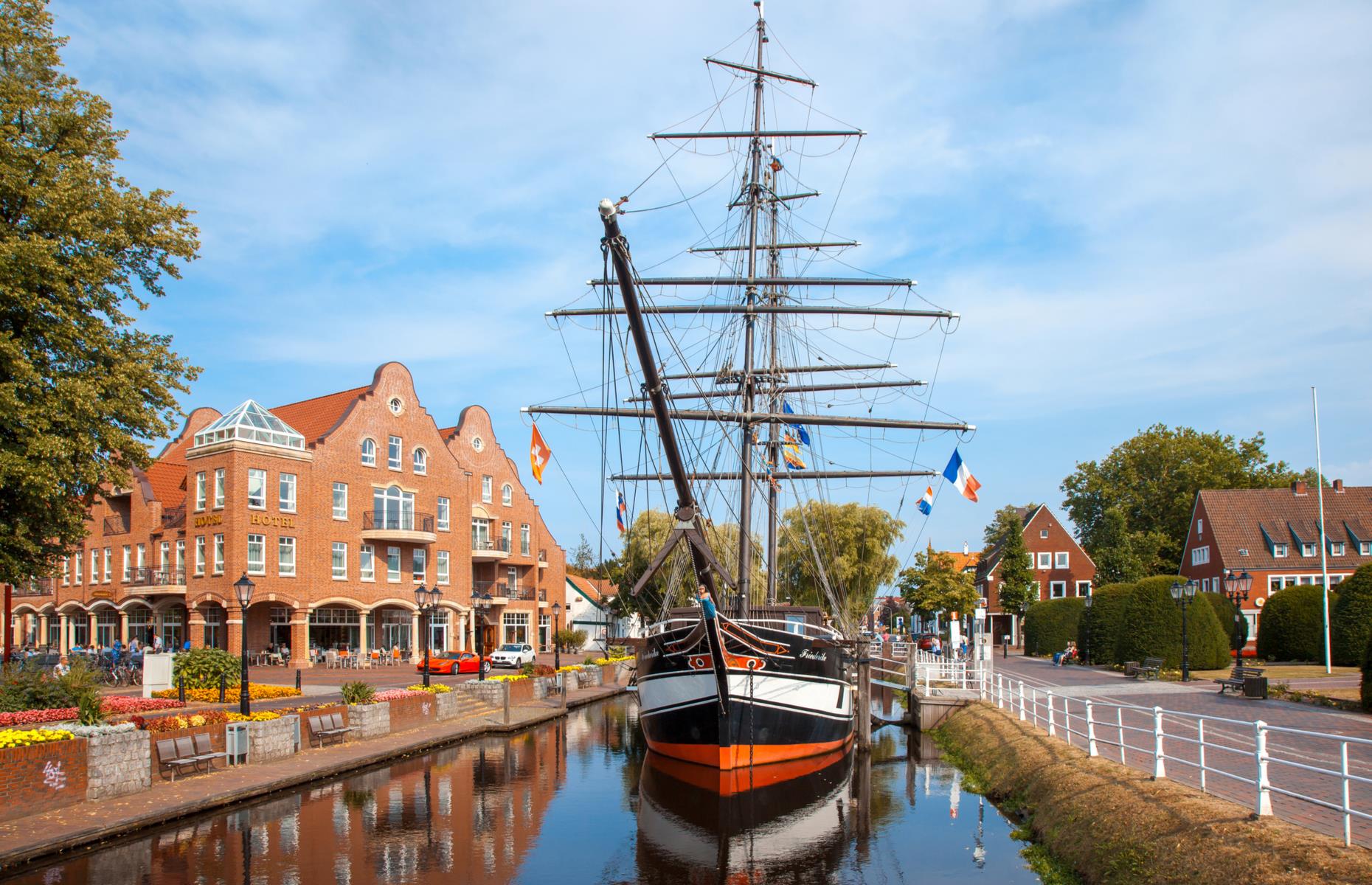
The views are unrelentingly glorious, from meadows with picture-book windmills to nature reserves. Back in Papenburg , a vibrant port city known for shipbuilding, several museums trace the history of sailing and the shipping industry in the region. The city is also laced with canals, crossed by bascule bridges (drawbridges) and dotted with permanently moored, historic ships (pictured).
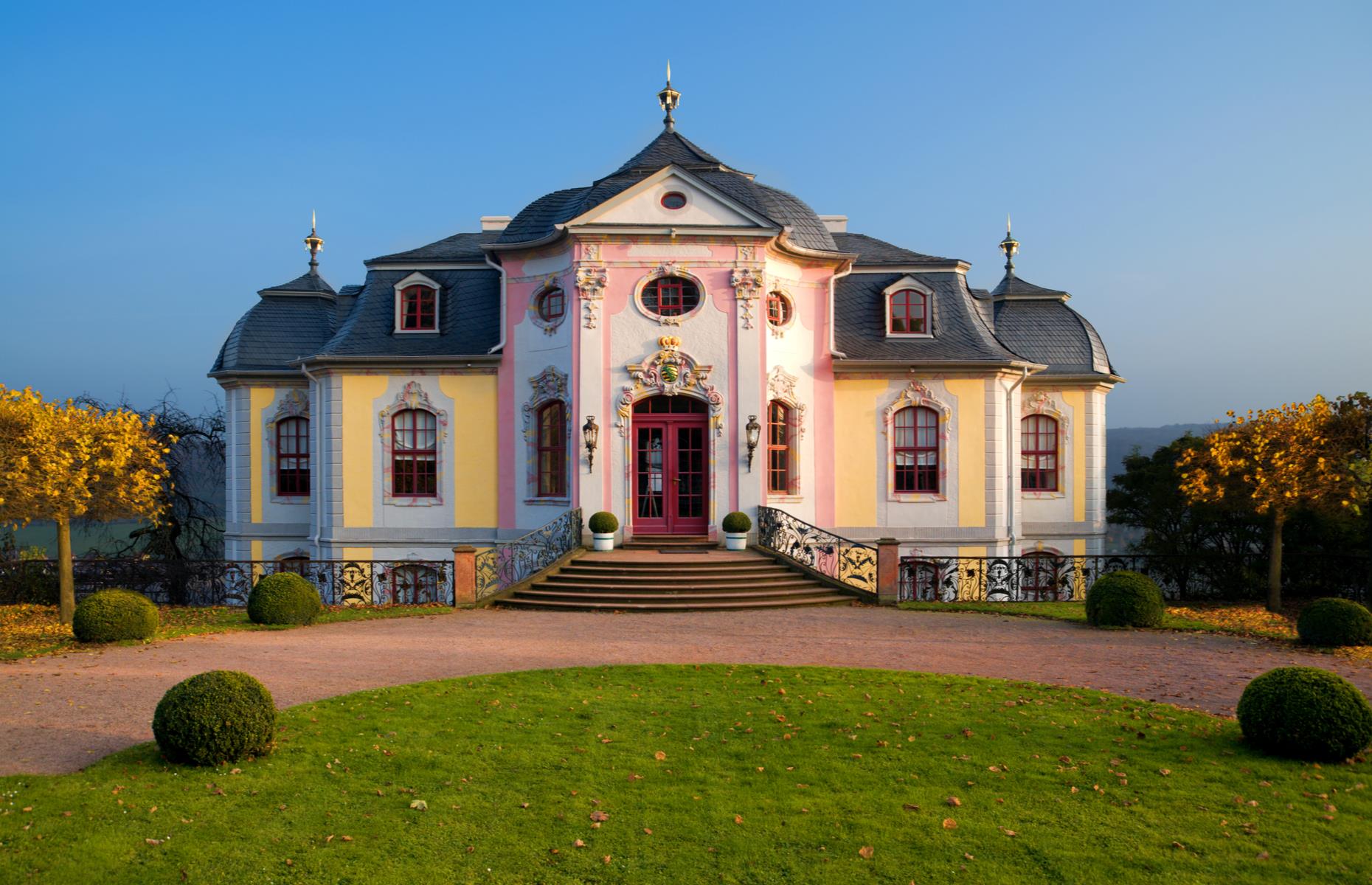
Weimar to Dessau
The influence of Bauhaus, a progressive design movement born in Weimar in 1919, can still be seen in buildings around the world. But its tenure in its home country was relatively short-lived, with the school forced to close by the Nazi regime in 1933. This fascinating trip – covering around 178 miles (286km) – takes in important Bauhaus sites including Weimar’s new museum , 1923-built experimental house Haus am Horn and Dornburg, whose Rococo palaces (pictured) are home to the Bauhaus Pottery Workshop.

Other stops include Chemnitz, known as the City of Modernity thanks to buildings such as Villa Esche , and Leipzig’s Grassi Museum whose distinctive stained-glass windows were designed by Josef Albers, who taught at Bauhaus. The final stop – Dessau – was home to the school from 1925 until it was forced out of the country. Here, the Bauhaus Building , designed by the movement’s founder Walter Gropius as the new school and workshop, is now UNESCO-protected.
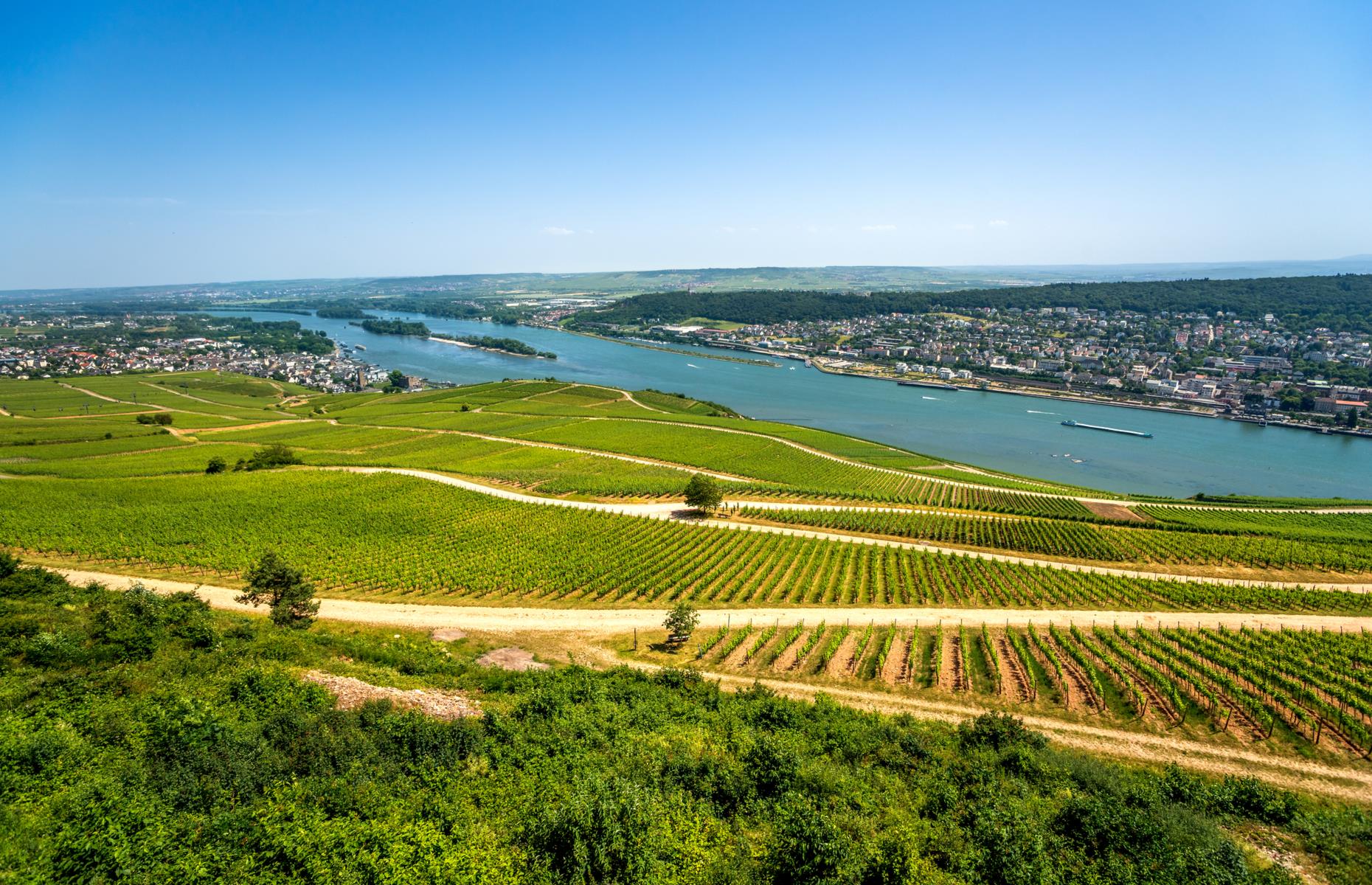
Düsseldorf to Mainz
Officially designated as the Romantic Rhine route, this road trip scoops up some of the country’s most beguiling cities and stunning landscapes into its 155 miles (250km). Think majestic cliffs, rolling vineyards and fascinating castles clinging to forest-blanketed hillsides. The scenic journey starts in riverside Düsseldorf before heading south to Cologne, whose fabled Gothic cathedral dominates the landscape. The road continues to beautiful Bonn before unfurling through the spectacular Rhine Valley (pictured).
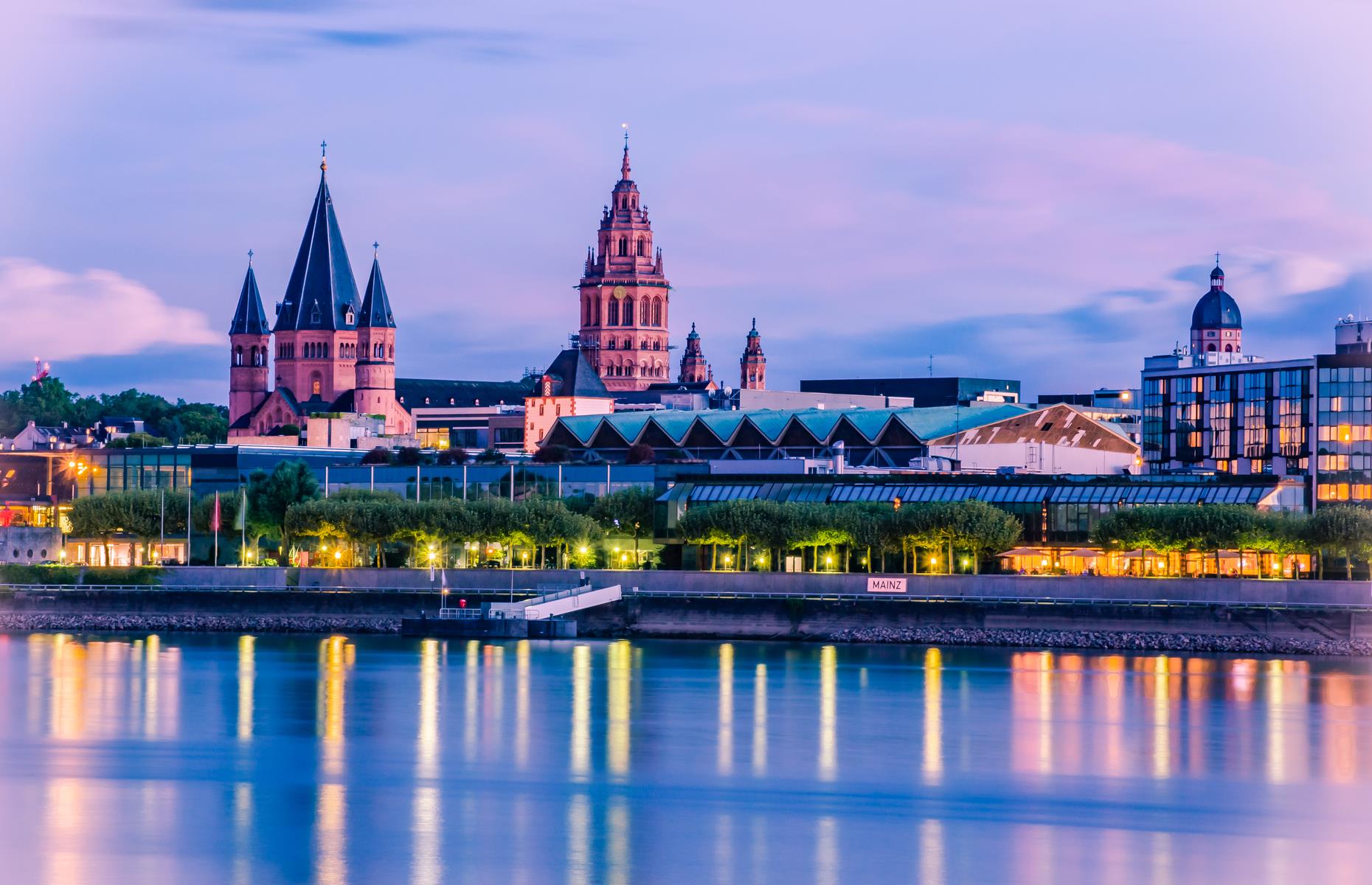
The final destination on this inspiring route is Mainz (pictured), just south of Frankfurt. Sitting pretty at the confluence of the Rhine and Main Rivers, it’s both charmingly quaint and wonderfully vibrant, with wine bars and restaurants in half-timbered houses. The city’s crowning glory is the Romanesque Mainz Cathedral, dating back to the 10th century.
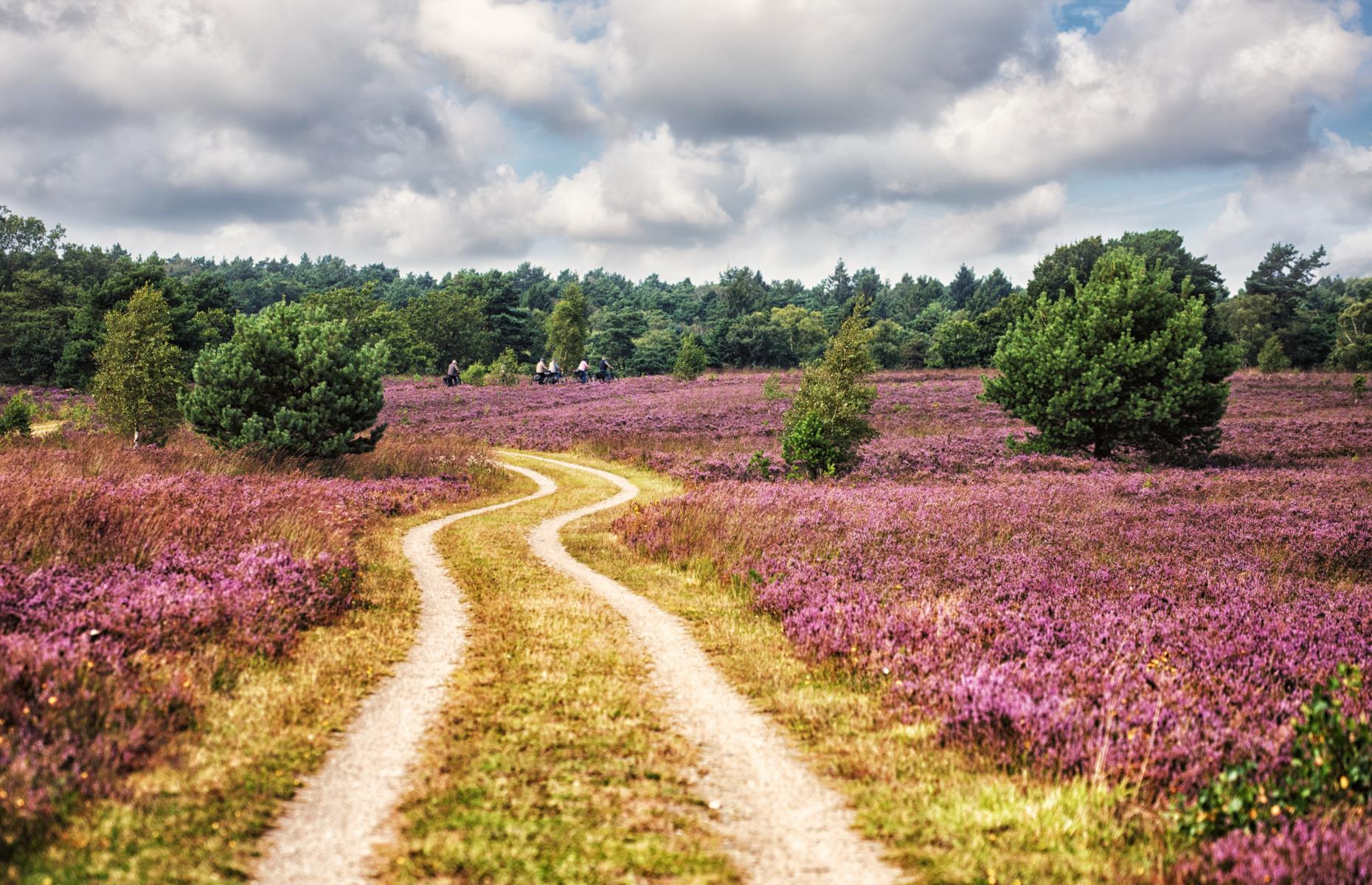
Hanover to Hanover
Dubbed the Asparagus Route , this journey really is all about the vegetable, although the pretty scenery should appeal even to those who dislike the spears. Lower Saxony is the heart of asparagus growing in Germany and this loop links up around 470 miles (756km) of towns, farms and countryside. The route officially starts and ends in Burgdorf, known for white asparagus, though Hanover is the closest big city (around half an hour away by car). Then it’s a journey tracing the vegetable’s heritage from root to tip, with Lüneburg Heath (pictured) among the gorgeous places it grows.
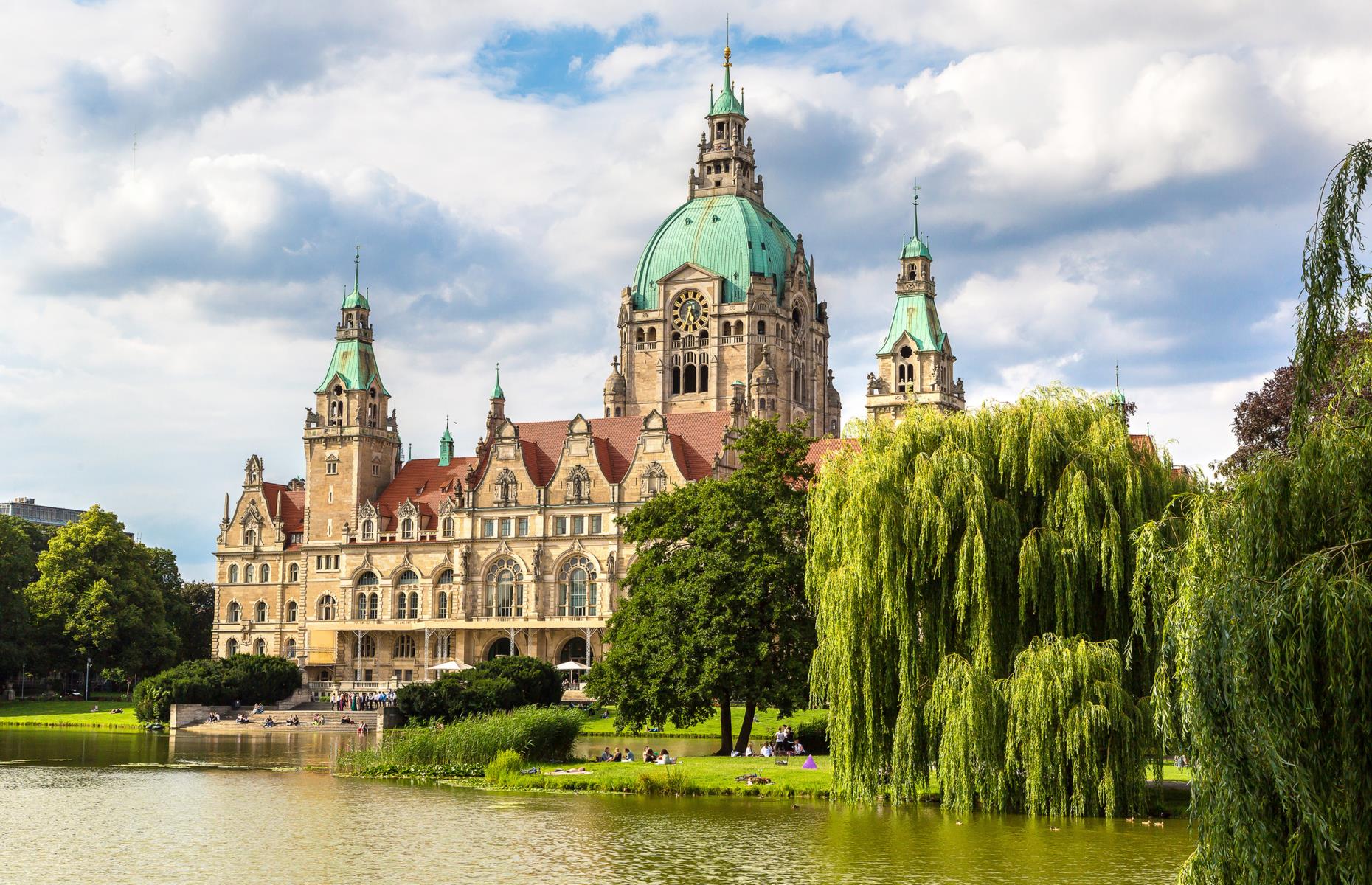
The road is happily well-signposted and also traverses the asparagus-growing regions of Brunswick, Mittelweser and Oldenburg Münsterland. During harvest season, usually from April to June, the spears can be sampled along the route and in restaurants, while the plants – bearing red berries – look lovely in fall too. Bookending the trip, Hanover has some incredible architecture including the 14th-century Market Church and the elegant, castle-like New Town Hall (pictured) dating from 1913.
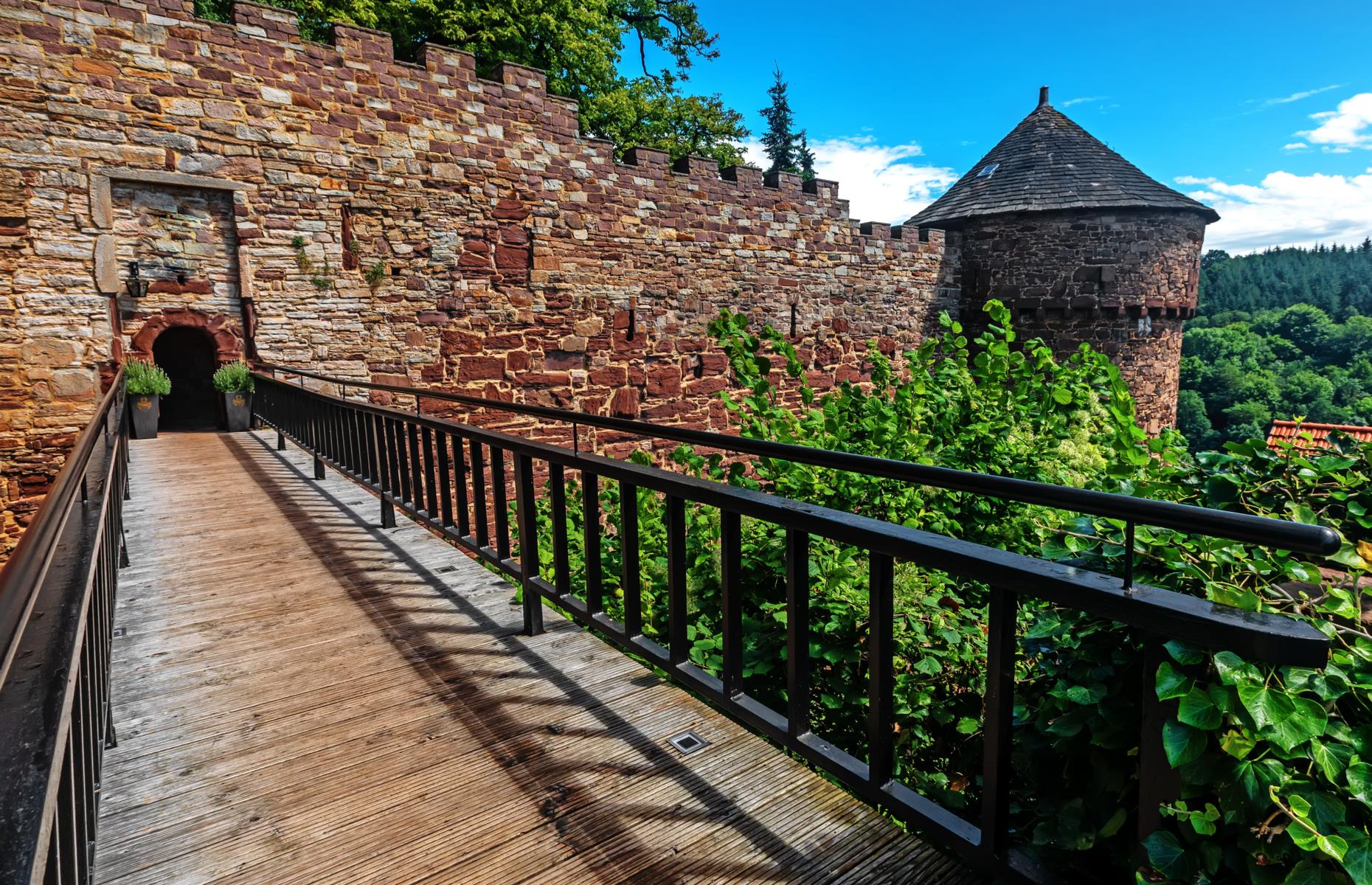
Frankfurt to Bremen
Fairy-tale scenery is almost commonplace in Germany, so it stands to reason there’s a designated Fairy Tale Route , known as Märchenstraße. The route joins up magical sites connected to the works of the Brothers Grimm (Wilhelm and Jacob). There are more than 60 stops marked out along its 375 miles (604km), including the brothers’ birthplace in Hanau, enchanting villages, and castles and palaces straight from a children’s picture book – including Trendelburg (pictured), the purported setting for Rapunzel. In Hamelin, the pavements are inlaid with brass rats, while Kassel’s Grimm World houses original manuscripts.
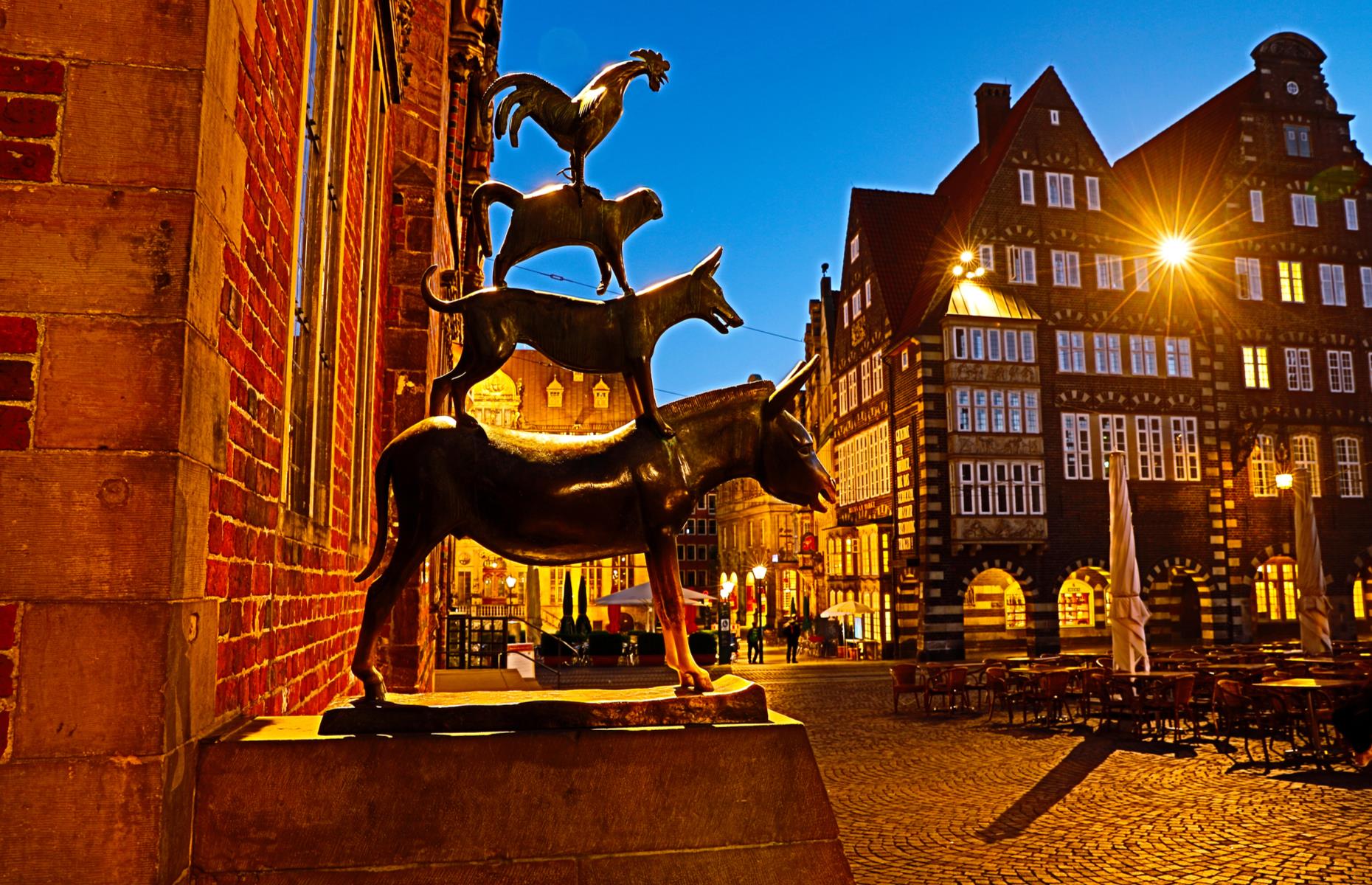
The journey is so pinch-me pretty that it doesn’t feel real, which is apt given the theme. Aside from fairy tales and folklore, the scenic route includes several nature parks, forests, flower-strewn meadows, mountains and rivers. At the journey’s end, Bremen has its own connection to the Brothers Grimm as the setting for their tale Town Musicians of Bremen , about a donkey, a dog, a cat and a rooster who journey to the city in search of a better life. A bronze statue in the market square pays homage to the legend.
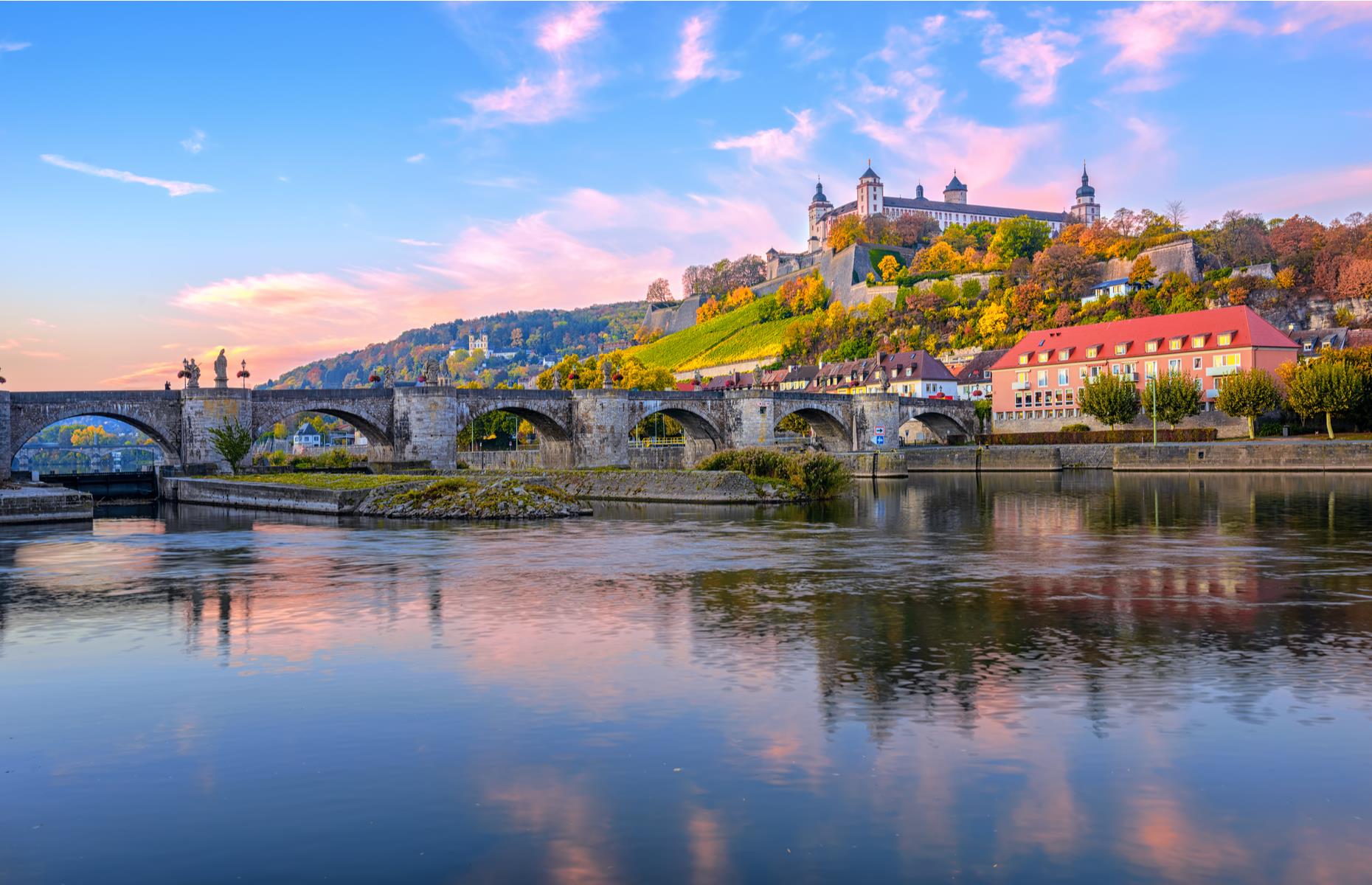
Würzburg to Füssen
The storybook scenery continues on this north-to-south route, known as the Romantic Road or Romantische Straße. It’s one of Germany’s most popular road trips for good reason. Lots of reasons, actually: chocolate-box Bavarian villages, vineyards in the Alpine foothills, medieval walled towns and dreamy hilltop castles are just a few of them. The 249-mile (400km) journey begins in Würzburg (pictured) and continues along to Füssen with a string of stunning sights.
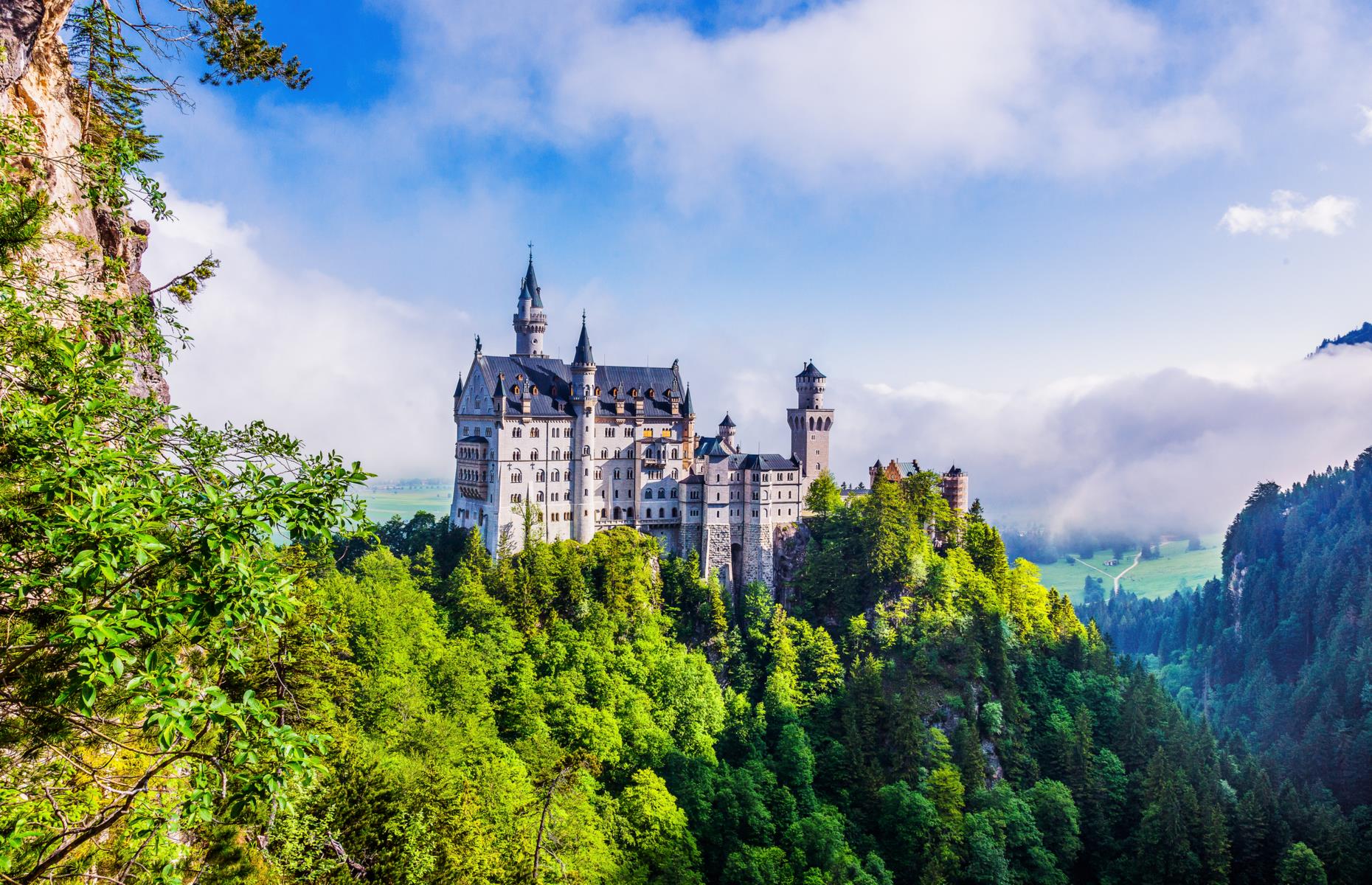
One of the route’s most spectacular sights is actually right at the end, near the Bavarian town of Füssen, and it links this journey with another spectacular road trip – the Alpine route or Alpenstraße. Bavarian King Ludwig II’s 19th-century Neuschwanstein Castle (pictured) is so ethereal and picture-perfect that it’s believed to have inspired Walt Disney’s Sleeping Beauty castle. Nearby Hohenschwangau Castle, the king’s childhood residence, is equally lavish.
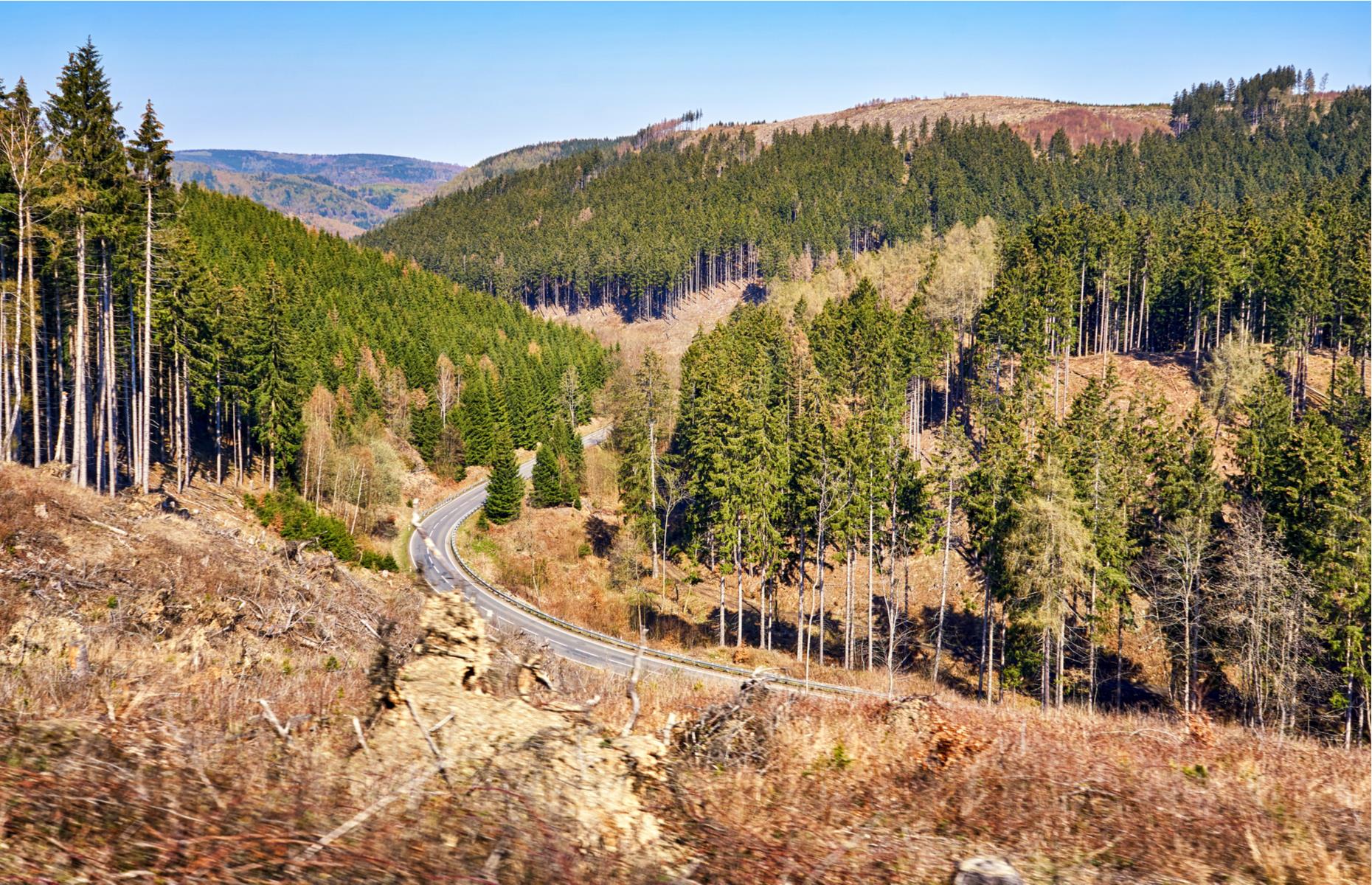
Berlin to Leipzig
The Avenues Route is all about the slow, scenic back way, and includes nearly 2,000 miles (around 3,000km) of tree-flanked road from the Baltic Sea in the north right down to Lake Constance in the south. This chunk of the route traces around 650 miles (1,046km) of these green avenues through the prettiest parts of central Germany. The route picks up in Dessau, around a 1.5-hour drive southwest of Berlin, before looping through the Harz Mountains (pictured).
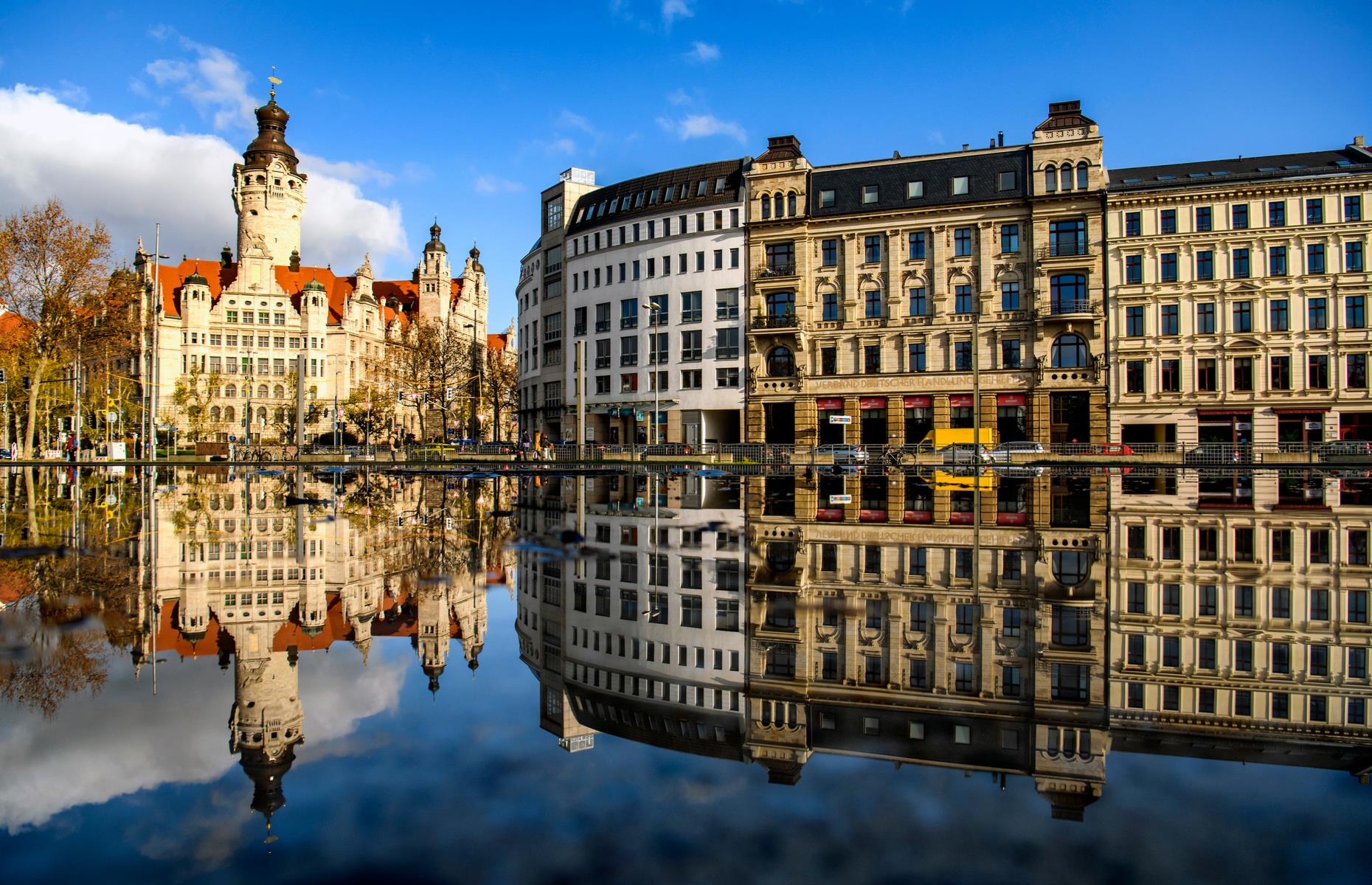
This road trip is like a jewel box of Germany’s charming spots, passing forests straight from fairy tales and villages with half-timbered houses. Quedlinburg is a particularly pretty example – cobbled lanes are lined with buildings in shades of spearmint and buttercup. The route also links up culturally rich cities including Erfurt, Weimar and Leipzig. The journey finishes in the latter, known for its elegant opera house and its New Town Hall, or Neues Rathaus (pictured on the left).
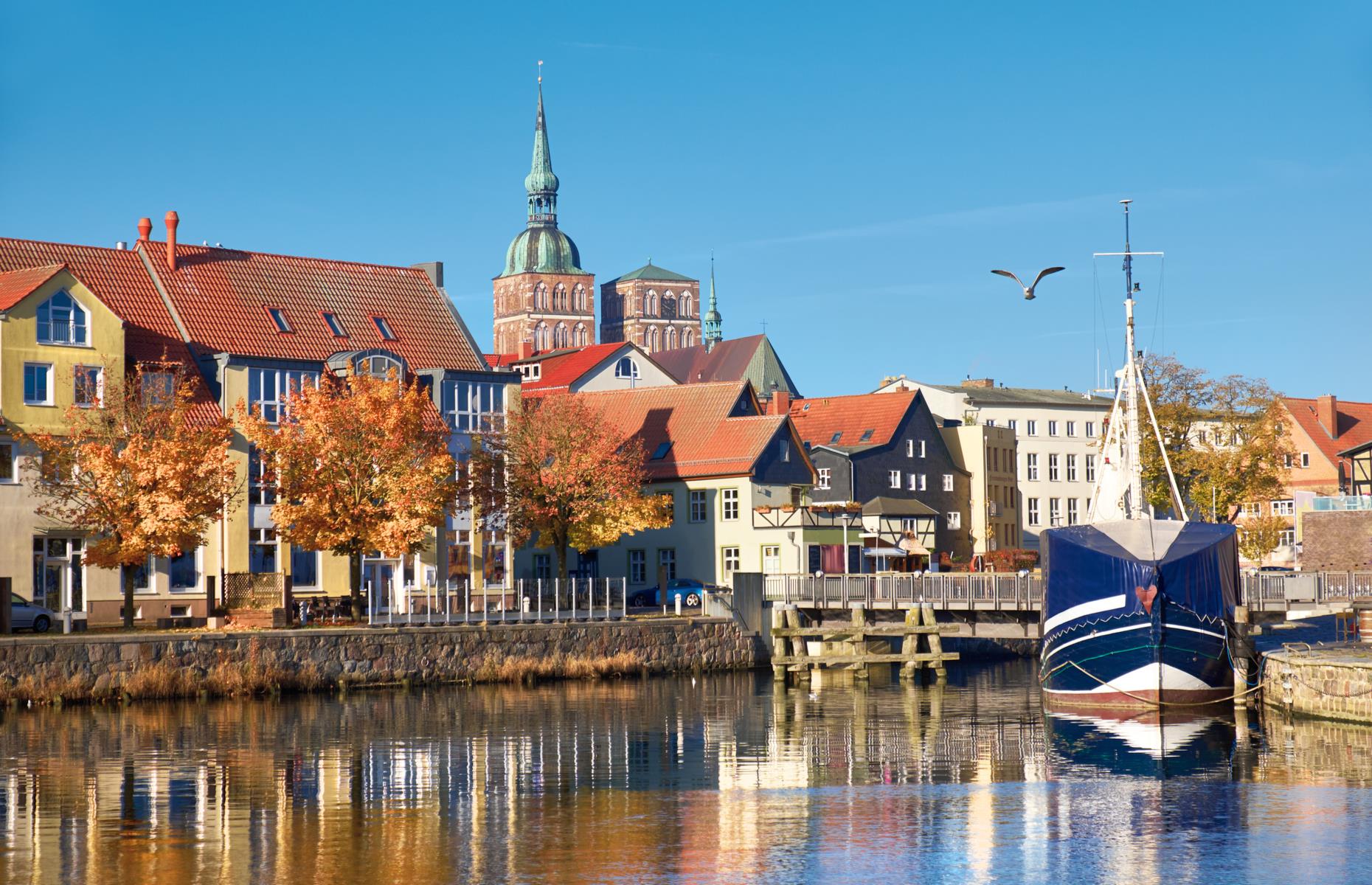
Lübeck to Binz
Take a trip to the seaside and breathe in the fresh salty air. This roughly 250-mile (402km) seaside drive showcases the glorious beauty of the Baltic coast, or “German Riviera”, tracing the shoreline from Lübeck – known for its medieval and Gothic architecture – and along the northern edge of the country. Opt for coastal roads that skim past the water, passing beaches, sand dunes and waterfront towns like Wismar and Stralsund (pictured).
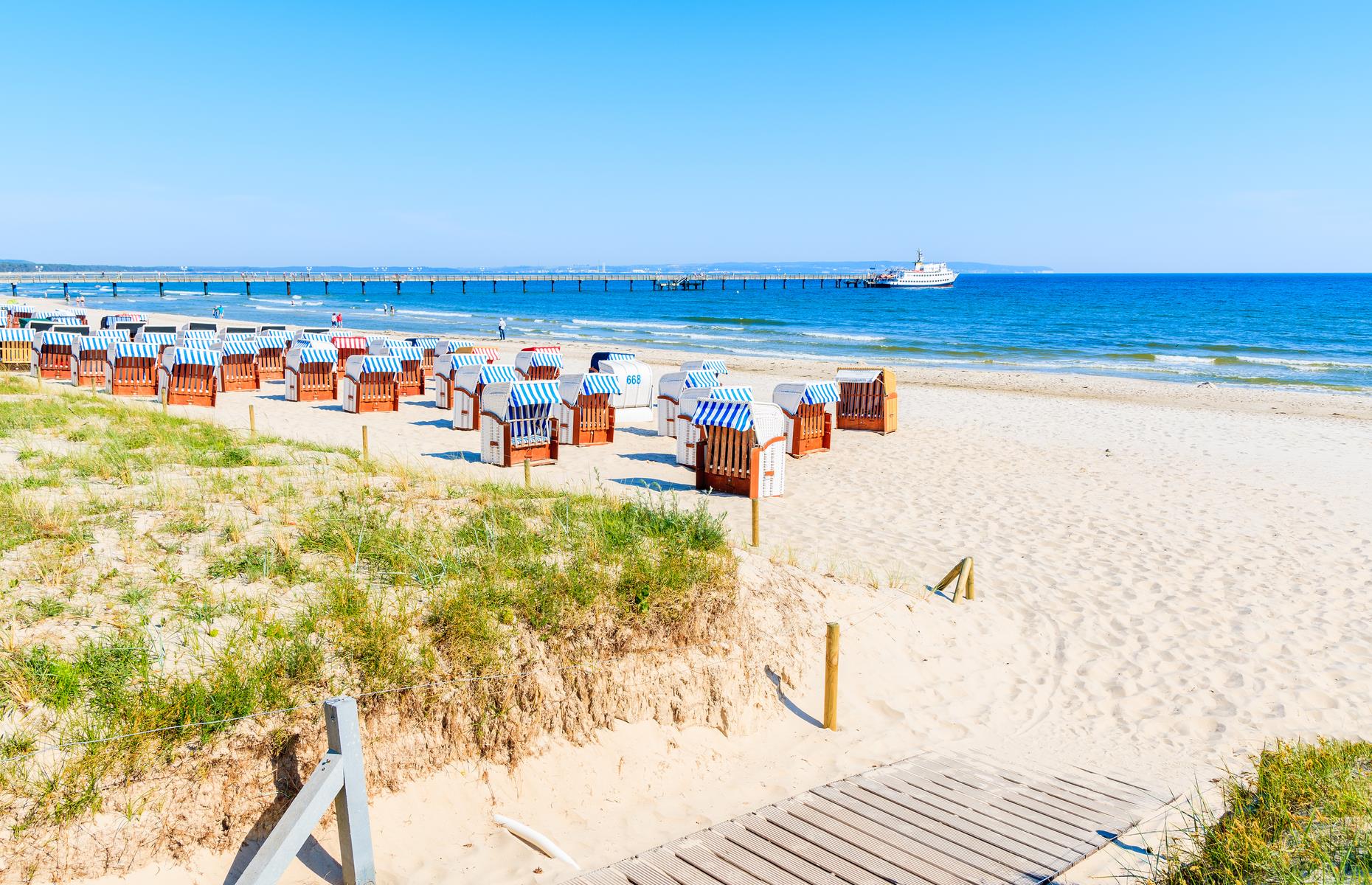
Binz is the final stop on this road trip and a real highlight. A seaside resort on the island of Rügen, it's famed for bright-white chalk cliffs and sand that’s just as pale and pristine (pictured). The island, linked to the mainland via a road from the Hanseatic city of Stralsund, is part of Jasmund National Park . It's a glorious blend of dramatic bluffs, ancient beech forest and gorgeous beaches lapped by blue-green water.
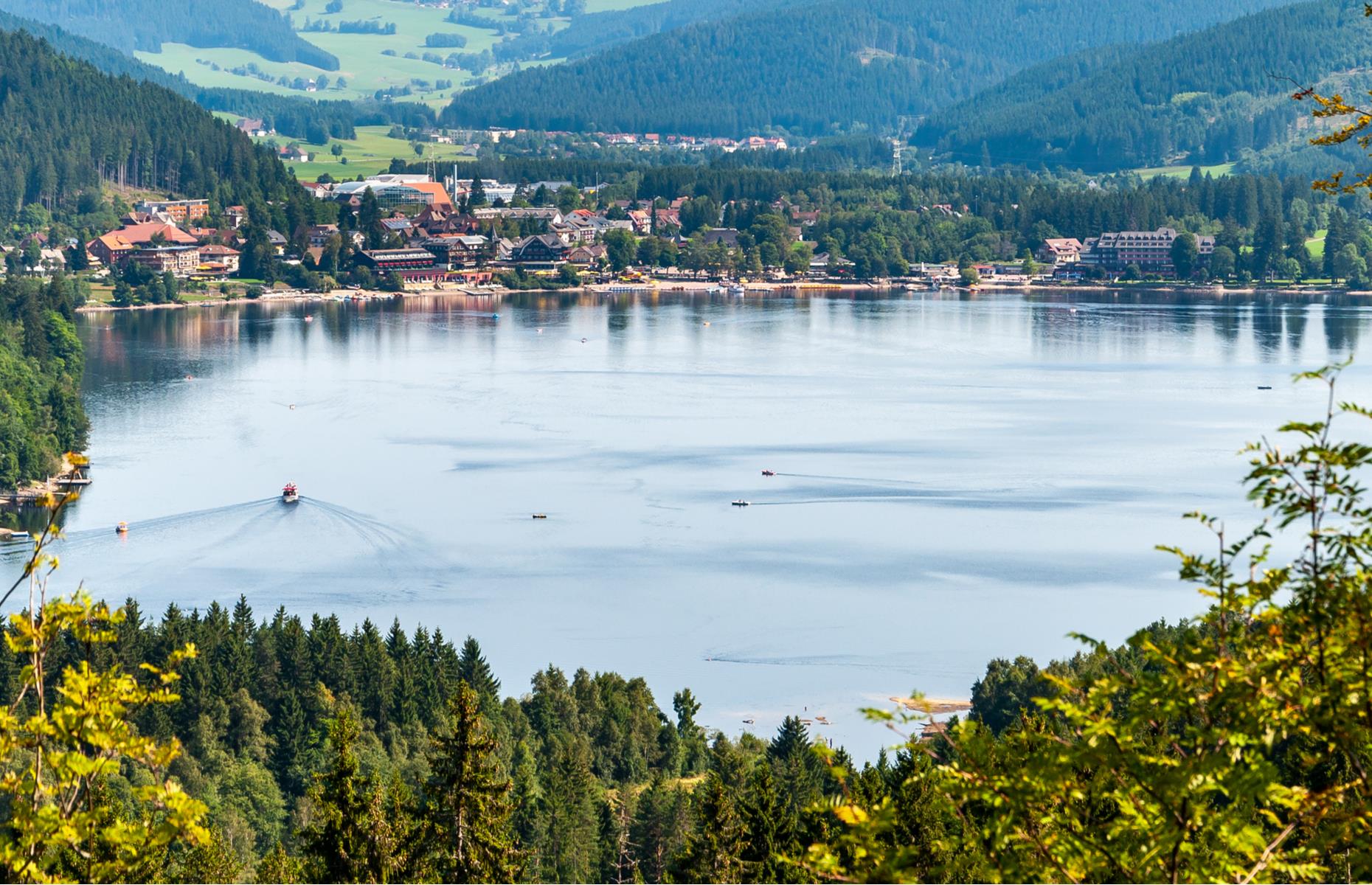
Stuttgart to Villingen-Schwenningen
It’s around a 1.5-hour drive from Stuttgart, the closest major city to this charming road trip, to the loop’s official start and end, Villingen-Schwenningen. Known as the Clock Route , it covers around 200 miles (322km) of the atmospheric Black Forest, famous for a history of intricate clock-making – particularly cuckoo clocks – dating back to the 17th century. The landscapes are spectacular, with the route taking in Triberg Falls, St. Peter's Abbey and Lake Titisee (pictured).
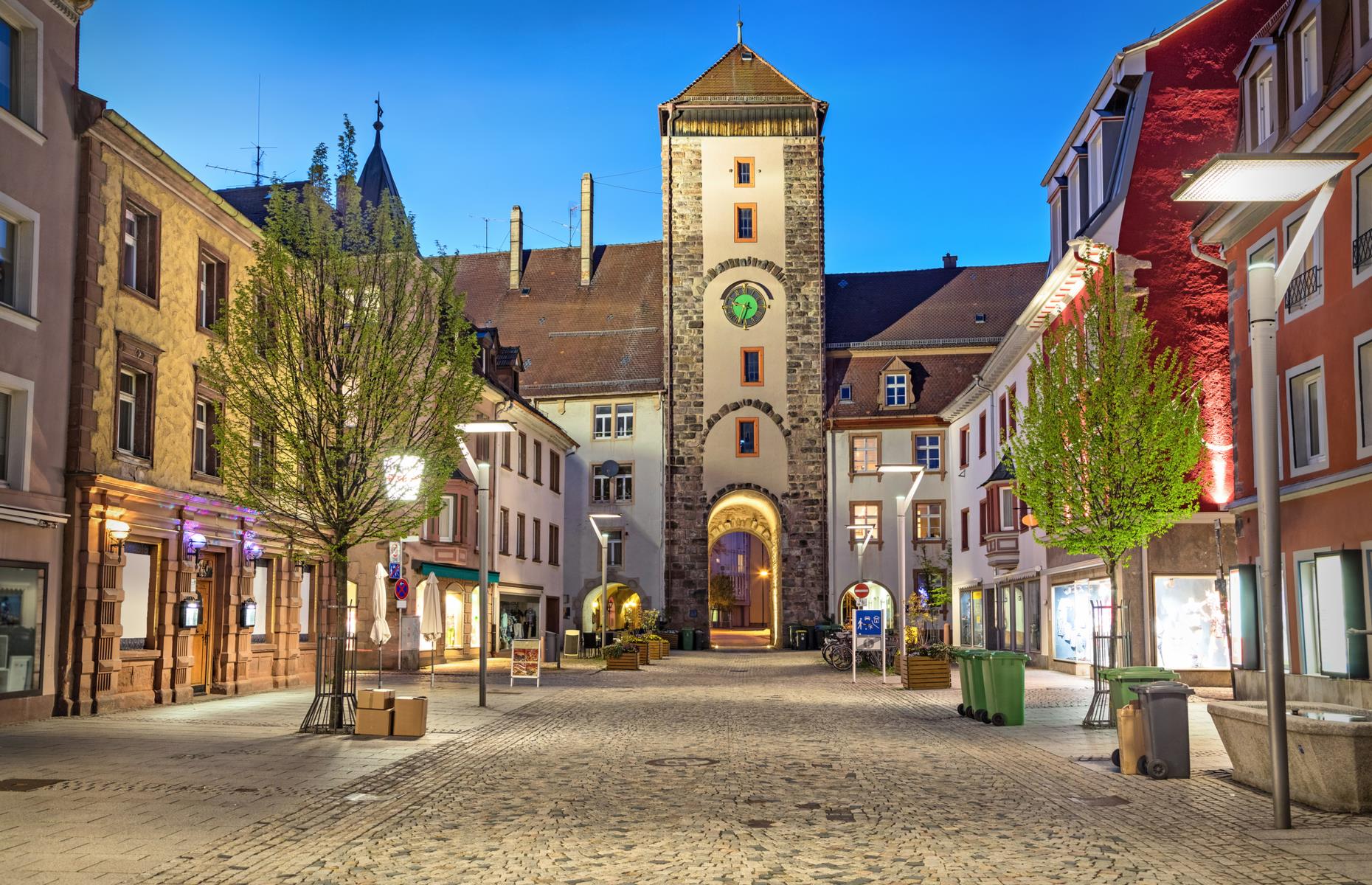
Museums dedicated to clock-making, workshops where people can see timepieces being made and villages with a tradition of the craft, are also laced into the itinerary. Villingen-Schwenningen, where the loop starts and ends, is itself a charming town on the edge of the Black Forest. Among its historic sites are three surviving 13th-century city gates , whose towers each have clocks with different colored dials – pictured is Obere Tor, with a green face.
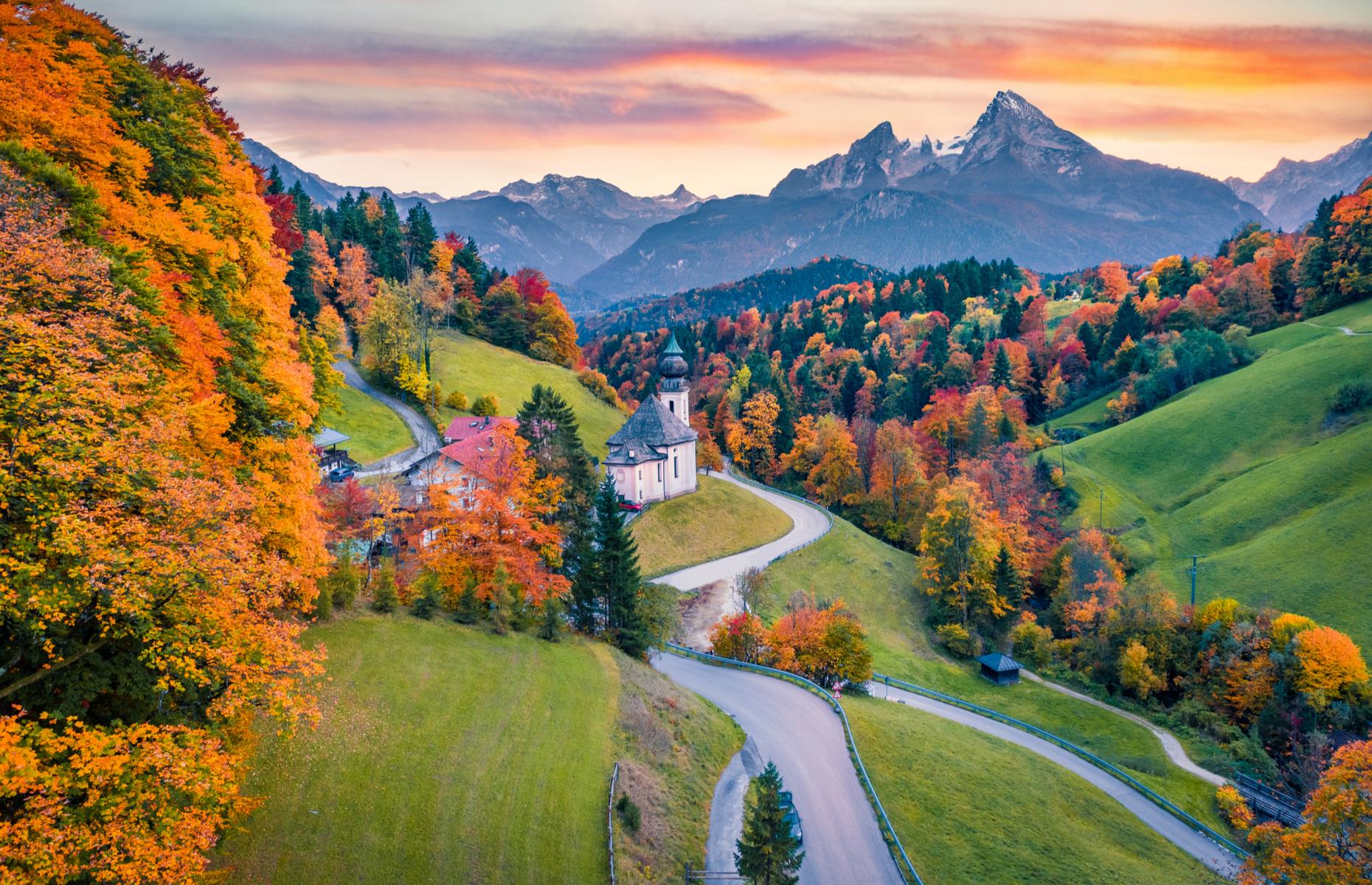
Munich to Lindau
The Alpine route or Alpenstraße is considered among the world’s most spectacularly beautiful drives, carving and curving through the Bavarian Alps and packing in breathtaking scenery. The roughly 175-mile (283km) journey from Munich to Lindau, via the stunning mountain town of Berchtesgaden (pictured), covers some of the best of it, passing dozens of castles, mountain peaks and limpid lakes. It also links up several dreamy spa towns and chocolate-box villages like Oberammergau.
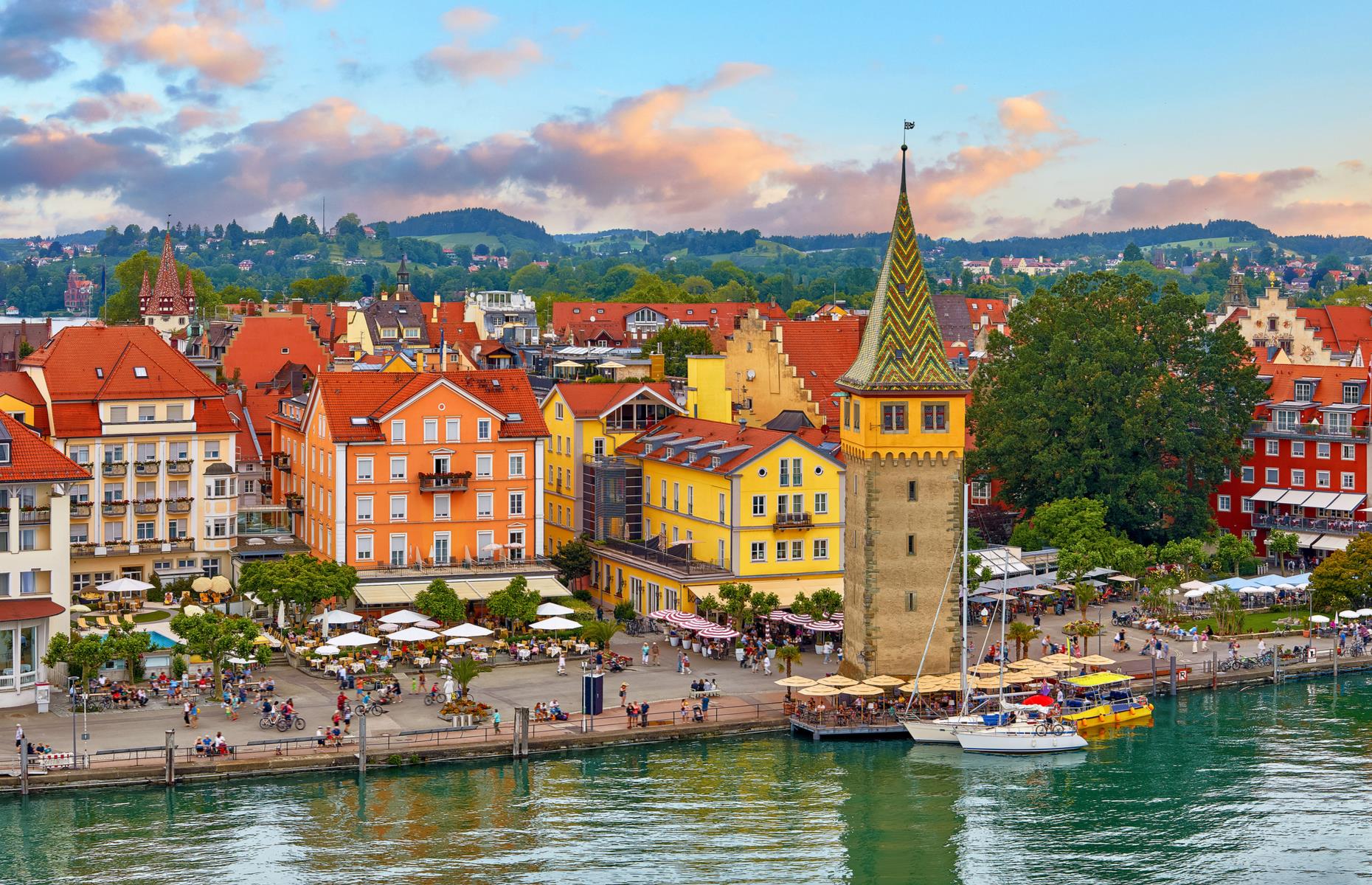
It’s a lot of beauty to live up to but the final destination of Lindau, on Lake Constance, is a match for the journey here. Its prime spot on the shores of Germany’s largest lake certainly helps, while its old town is like a chessboard crammed with striking structures. Among recognizable landmarks are the Bavarian Lion statue which signals the entrance to the harbor, a medieval lighthouse and the 12th-century watchtower Mangturm, whose roof is decorated with distinctive zigzagged tiles.
Now check out these surprising German sights around the world
More for You
ISIS Issues Fresh Threat To Putin: Reports
The 11 Rudest Things You Can Do In Someone Else’s House, According To Etiquette Experts
Elon Musk says he used to vote '100% Dem,' but now thinks the US needs a 'red wave' to save it
Wendy’s new Frosty flavor evokes childhood nostalgia, kicks off spring
Shamima Begum loses first bid to challenge citizenship removal at Supreme Court
New Blood Thinners Will Prevent Blood Clots Without Causing Bleeding
Don’t Lie to the IRS — And 9 Other Things You Should Never Tell Them
Here Are 6 Things White People Say That Highlight Their Privilege And OMG I Hear These Allllll The Time
Eric Trump says insurance companies laughed when he asked them for $454 million to cover Donald Trump's bond
40 Things That Didn't Exist 40 Years Ago
Dairy Queen Is Giving Away Its New Summer Blizzards For 2 Weeks
Why Timothee Chalamet And Denis Villeneuve Didn't Speak English While Filming Dune
This is a 'slap in the face' to Letitia James: Gregg Jarrett
Mike Tomlin Announces Decision On Starting Quarterback Position
Why 'Quiet on Set' documentary on Nickelodeon scandal exposes the high price of kids TV
I became a millionaire at age 27—here are 4 'unpopular' rules rich people follow that most don't
17 Gaslighting Phrases That Could Damage Your Relationships
The Surprising Health Benefits of Cherries—and the Best Ones to Eat
There Are Only Two Perfect Sci-Fi Movies, According To Rotten Tomatoes
James Carville's comment about 'preachy females' reflects how Democratic Party doesn't stand for 'masculinity'
- Skip to main content
- Keyboard shortcuts for audio player
Book Reviews
'james' revisits huck finn's traveling companion, giving rise to a new classic.
Carole V. Bell

An enslaved man debates John Locke. A Black man pretends to be a white man in blackface to sing in a new minstrel show. In a fever dream of a retelling, the new reigning king of satire , Percival Everett, has turned one of America's best loved classics, Adventures of Huckleberry Finn, upside down, placing Huck's enslaved companion Jim at the center and making him the narrator. The result is strangely new and familiar – an adrenaline-spiking adventure with absurdity and tragedy blended together.

Percival Everett gives Mark Twain's classic story about Huck a new voice in 'James'
Re-imaginings of classic literature are challenging, often unnecessary endeavors. This one is different, a startling homage and a new classic in its own right. Readers may be surprised by how much of the original scaffolding remains and how well the turnabout works, swapping a young man's moral awakening for something even more fraught. A kind of historical heist novel about human cargo, as in the original, James is an enslaved man in antebellum Missouri. James loves his wife Sadie and their 9-year old daughter Lizzie, and keeps them safe by not just adhering to – but mastering – the racial codes of an inhumane system.

Advice from a critic: Read 'Erasure' before seeing 'American Fiction'
Despite those efforts, one day Jim learns the unthinkable — the mistress is planning to sell him down the river but keep Sadie and Lizzie. James can't have his family separated, so he runs to nearby Jackson Island, planning to hide out until he can figure a way to secure their freedom. Jim's unlikely friend, young Huckleberry Finn also has reason to hide and to run with his abusive and alcoholic father back in town. After faking his own death (an action that unintentionally puts James under suspicion), Huck begs to come along, offering to pretend to be Jim's owner. This alliance launches a delirious odyssey, two runaways navigating a treacherous river on a raft.
A subtle but significant change is that while the events of Twain's 1884 novel take place in the Mississippi Valley "forty to fifty years ago," in the 1840s, Everett advances the timeline by two decades, putting the nation on the cusp of civil war, though James and Huck don't know it.
More importantly, Everett provides what Twain could not: Jim's deep interior life. The entire story is narrated in his voice. Getting inside James's head is a remarkable experience. Though they're sometimes parted, James (as he prefers to be called in Everett's novel) and Huck somehow always find each other again, and that creates a sense of surreality.
Along with shifting states of consciousness and reality, identity is a crucial and an explicitly slippery thing. Twain wrote Huck Finn in region-, race- and even age-specific dialect and pushed back on critics who found the language objectionable by explaining each dialect contained was researched with anthropological attention to detail. Everett, like Twain, is similarly obsessed with the link between language and identity. James plays the role of the docile and ignorant slave, whose speech to white people is barely intelligible, while inside he's savvy, literate, and nursing a bubbling rage. Every chance meeting with white folks is a performance, a private minstrel show in which James code switches his style of speaking for white comfort.
The artifice serves a crucial purpose, and James is a consummate trickster – the cooperative slave, play acting exaggerated subservience, with his voice and diction morphing to character. And despite their growing connection, James's audience is all white people, old and young – including Huck. James only holds fast to only one true thing: His vow to his family: to "get me a job and save me sum money and come back and buy my Sadie and Lizzie."
Every now and then Huck can sense the falseness and it destabilizes their partnership. Their connection is real and tenuous, undermined by who they are – or appear to be to society – and the gap between them. Those contradictions are hard for a boy to grasp. It would be poignant but the repetition of those scenes of code switching uncertainty also renders this comic. As narrator, James recounts this moment when Huck got close to discovering his act:
"Jim," Huck said. "What?" "Why you talking so funny?" "Whatchu be meanin'?" I was panicking inside. "You were talkin'—I don't know—you didn't sound like no slave."

'Dr. No' is a delightfully escapist romp and an incisive sendup of espionage fiction
Again and again. In true Everett fashion, the intertwined artifice of race and language is stretched to self-reflexive absurdity. On top of the issue of interracial, interpersonal performance, the author mimics and pokes fun at the self awareness and calculus of slave narratives like the one James is himself secretly trying to craft (or maybe, rather modern literary analysis of slave narratives) and what James explicitly calls "the frame" in storytelling. James knows he's smarter than those who would consider themselves his betters and, sometimes, as long as he's safe and among other Black people, he secretly enjoys having some fun with his expertise.

Book News & Features
Percival everett's latest grounds racial allegory in history, horror and blood.
The earliest and most self-conscious example of this linguistic play and reflexivity occurs before James and Huck go on the run. James was careful to approach Huck and Tom like any other white folks – with caution and concealed distance. When the boys think to play a trick on James while he's sleeping, the truth is "Those boys couldn't sneak up on a blind and deaf man while a band was playing." But James spins a story letting the boys think their trick of moving his hat while he was sleeping has been so successful that he believes he was visited by a witch. He's telling a tale to another Black man, but he knows that he's being overheard by the two white boys. This is the dual frame of which James is explicitly aware. Similarly, when teaching his daughter Lizzie how to manage the expectations of white people and avoid insulting Miss Watson about her terrible cooking, James advises the girl: "'Try'dat be,' I said. 'That would be the correct incorrect grammar.' "
James takes pride and pleasure in these deceptions. But fluidity of language and role playing can never be just a game. This 19th century linguistic shape-shifting can become a matter of life or death in an instant. So the intimacy between him and Huck is worrying: "spending time with Huck alone had caused me to relax in a way that was dangerous." Plus, the people James and Huck encounter are also, more often than not, playing with their own roles. When James meets Norman, a man with white skin who seems to see through his racial performance, he finds it a "terrifying notion." James's horror and fear are so obvious that Norman feels compelled to reassure him: "'You didn't slip," he said. I'se jest knows.'" James is impressed: "His accent was perfect. He was bilingual, fluent in a language no white person could master." But Norman has his own secrets of identity and language. He's actually of mixed race passing for white, and James just doesn't detect it.
Like James and Norman's encounter, the novel is exquisitely multilayered. A brilliant, sometimes shocking mashup of various literary forms, James has the arc of an odyssey, with the quest for home, and an abundance of absurdly comical humor. Con men and tricksters like the Duke and the Dauphin are borrowed from Twain. But even with the humor, Everett weaves in signature touches, like dream sequences with John Locke, whom James criticizes over his position on slavery. As James recounts, "I knew I was dead asleep and dreaming, but I didn't know whether John Locke knew that." So they debate in his dreams, the famous philosopher from which America's "inalienable and natural rights" flow defending his contradictions. When Locke says, "Some might say that my views on slavery are complex and multifaceted," James counters that his positions are "Convoluted and multifarious." Locke says: "Well reasoned and complicated;" James says: "Entangled and problematic." Locke: "Sophisticated and intricate." James: "Labyrinthine and Daedalean."
The back and forth is virtuosic in a scene that will make you smile if not laugh out loud. At other moments, especially those involving James's evolution and the enslaved women inside and outside of his family, James is devastating. Eventually, the story crescendos to a paroxysm of violence that is simultaneously inevitable and shattering. That combination of moral philosophy, absurdity and tragedy is very Everett. But James's situation is so bleak, his character so flesh and blood so fully realized, his pain so visceral and poignant, that at times the farce and telegraphing of inside jokes can seem jarring.
Still, I'm not sure if that dissonance is truly a bug or a feature. In addition to addressing language and identity, James is very convincingly and movingly a book about two runaways' quest for freedom and the relationship between human beings that society says should not have any connection. James works shockingly well in all those dimensions. America's original sin and contradictions are his subject, and this riveting riff on a similarly complex American classic that even Toni Morrison called "this amazing troubling book" is his most challenging and maybe even his best canvas. With the previous high water marks of Telephone, The Trees, and Erasure , Everett has long been an American literary icon. But in the wake of an Oscar-winning adaptation , this time the world is watching. James expands the Everett canon in a way that will have to be reckoned with come award season.
A slow runner and fast reader, Carole V. Bell is a cultural critic and communication scholar focusing on media, politics and identity. You can find her on Twitter @BellCV .
Win a thrilling trip to the 2024 UEFA Europa League final in Dublin
Tuesday, March 19, 2024
Article summary
Rise to the challenge with the UEFA Europa League! Enter our competition for your chance to win a thrilling trip for two to this season's final in Dublin on 22 May.
Article top media content

Other prizes up for grabs
There are all kinds of unique Europa League memorabilia and souvenirs on offer, including:
• Signed shirt from one of the players featured in the Rise Up series – Florian Wirtz (Leverkusen), Jarrod Bowen (West Ham) and Désiré Doué (Rennes) • Official 2023/24 Europa League match balls • Match balls used during the final in Dublin • €100 voucher to spend in the UEFA Club Competitions Online Store • Europa League fan bundles, including a competition watch, replica trophy and official match ball
Selected for you

Europa League final lowdown

IMAGES
COMMENTS
Our German courses for your language-learning trip. Course duration: 2 weeks (10 course days) or 3 weeks (16 course days) Timetable: 50 or 75 lessons in total (each lasting 45 minutes) Procedure: Monday to Friday, 5 lessons a day on-site at your Goethe-Institut. Maximum number of participants: 16. Levels: A1, A2, B1, B2, C1, C2 (in each case ...
Learn German for travel. Are you planning a trip to Germany or a German-speaking country and want to be able to communicate with the locals? Learning German for travel can be an exciting and enriching experience, and it's never too late to start.. In this blog, we'll be sharing the best 100 phrases you need to know when traveling in a German-speaking country.
German Volabulary German Language German Pronunciation. 50 Essential German Phrases for Tourists: English Translations and Pronunciations. By Pardeep Patel. April 13, 2023. 0. 925. Share. Facebook. WhatsApp. Twitter. Linkedin. Pinterest. ReddIt. If you're planning a trip to Germany, it's always helpful to know a few basic phrases in German ...
136 Useful German Travel Phrases, Expressions and Vocabulary Words. Planning your big trip to Germany is so exciting—but you're not done until you've brushed up on common German phrases for travel. In this post, you'll find a handy phrasebook of German travel phrases and vocabulary, conveniently organized by group.
German Travel Phrases: Cheat Sheet For Getting Around. While many of the younger generations of Germans are taught German in school, many people in the country still do not speak English. So, learning a few of the more common words and phrases will go a long way in helping you have the trip of a lifetime while traveling to Germany.
In this post you will discover 47 tried and tested German travel phrases that have worked well for me on my many trips to Germany. You'll also hear audio of each of the phrases. After reading this post you will: Know how to say 47 essential German travel phrases. Hear how each of the phrases sound. Be able to mix and match which ever phrases ...
Travel better: First, it'll be easier to move around, ask for directions, and communicate with locals. Besides, you'll score points with native speakers! More independence: Second, you'll rely less on expensive phrase books, awkward translations from your phone, and complicated hand gesturing. Additionally, we promise you'll feel great ...
German is spoken by over 90 million people worldwide. Learning a new language can be exciting and challenging, and German is no exception. Whether you're planning a trip to Germany, aiming for career opportunities, or simply want to broaden your horizons, embarking on the path of learning the German language is a rewarding experience. In this ...
Tschau - "ciao". Guten Morgen - "good morning". Guten Tag - "good day". Guten Abend - "good evening". Gute Nacht - "good night". Danke / Vielen Dank / Dankeschön - " thanks" and "many thanks". There are a few ways to say thank you in German. Just use danke for now but expect to hear the other versions as well. Bitte - "please".
3. Greetings. Now, onto the most basic German words and phrases for travellers: Greetings. These are the most common German travel phrases, and always important to have at the ready. Hallo! Hello! Guten Morgen! Good morning! Guten Tag!
RELATED CONTENT: 5 hidden gems of Germany. Einmal nach… bitte. Germany's public transport is among the world's best, and a handful of basic german phrases can help you navigate the various transport systems. To ask for a ticket: "Einmal/ zweimal nach… bitte", meaning "one ticket/ two tickets to (your destination) please".
Are you planning a trip to Germany soon? If so you're not alone, approximately 37.4 million people visit Germany every year making it the ninth-most visited country in the world. German is also one of the most prevalent languages spoken and taught worldwide, with over 130 million speaking it around the globe.. Having some knowledge of basic German words and phrases in your repertoire is a ...
How to learn German for travel: Is 4 weeks enough? Earlier this year, I planned a trip to Italy and studied Italian for 4 months to prepare. It was great! I had lots of meaningful conversations, confidently navigated cities and towns in the countryside, and successfully ordered what I intended, every single time. 💯.
Well, courtesy and politeness are a valuable asset in any language. The basics should include "please," "excuse me," " sorry ," "thank you," and "you're welcome." But that's not all. Below, we have prepared a short phrasebook with the most important basic German phrases for a traveler or tourist. They are listed in approximate order of ...
Hallo = Hello. Guten Morgen = Good Morning. Guten Abend = Good Evening. Tschüss = Bye. Danke = Thank You. Bitte = Please OR You're Welcome. Since in German "Bitte" can be "please" as well as "you're welcome", the concept of having two separate expressions can be foreign to German speakers.
Here are some useful German phrases that you can use in cafes and restaurants: 24. Einen Tisch für (zwei/drei/vier), bitte. - A table for (two/three/four), please. 25. Ich habe einen Tisch reserviert. - I reserved a table. 26. Ich hätte gern ….
If you are planning a trip to Germany, you will want to learn some basic German phrases and useful travel phrases before you go. ... German is an official language in Austria, Belgium, Germany, Liechtenstein, Luxembourg and Switzerland. It is also spoken in parts of Italy and Poland. It is the most widely-spoken language in the European Union.
17 Important Must-Knows Before You Travel in Germany. 1. It's all about that cash money, yo. You might expect Germany, producer of supercars and epic technology to be on board with the whole credit card trend, but this simply isn't the case. I know it's weird, but you'll find that many places in Germany don't actually take credit card ...
It is optional to speak German to visit Germany. However, speaking the language can enhance your experience in the country and help you better understand and appreciate the culture. Suppose you are interested in learning German before your trip. Many resources are available, including online courses, in-person classes, cultural events and ...
1. Get around on two wheels. Bike riding is a beloved mode of transportation in Germany, and there are many dedicated bike lanes in cities and along popular cycling routes in regional areas. Bike-sharing schemes are common, and in some cities you might even find shared cargo bikes - a popular way to get around with kids.
German Phrases for Travelers is a 20 min video that will teach you the very basics of the German language that any foreigner travelling around Germany will find useful.; Basic German Travel Phrases from expertvillage is a collection of fourteen youtube videos that will not only teach you essential German travel phrases like those used when greeting people, asking for directions, travelling ...
Essential Words And Phrases To Know Before Your Trip To Germany. Story by Amanda Finn. • 1y • 11 min read. With a language like German, you're in luck because the words are generally phonetic ...
Germany is in the center of Europe and is divided into 16 federal states, including the city states of Berlin, Hamburg and Bremen. The largest states are Bavaria, Lower Saxony, North Rhine ...
Language and currency. For visitors to Germany, the official language spoken is German. While many Germans can communicate in English, especially in tourist areas, learning a few basic German phrases to navigate daily interactions is helpful. ... A luxury trip in Germany could easily cost €200 or more per day, resulting in a total budget of ...
This road trip is like a jewel box of Germany's charming spots, passing forests straight from fairy tales and villages with half-timbered houses. Quedlinburg is a particularly pretty example ...
Lufthansa counts €250M loss from strikes in Germany 03/20/2024 March 20, 2024. The cost of strikes at Lufthansa in Germany rises to €250 million, with a long-term impact on flight schedules ...
Myth 9) Popular places are "bad". There's a weird mindset I've seen online and heard in person that popular, or trendy places are somehow "bad" or should be avoided. As if someone's ...
A Black man pretends to be a white man in blackface to sing in a new minstrel show. In a fever dream of a retelling, the new reigning king of satire, Percival Everett, has turned one of America's ...
Favourite team. Win a thrilling trip to the 2024 UEFA Europa League final in Dublin. Tuesday, March 19, 2024. Rise to the challenge with the UEFA Europa League! Enter our competition for your ...